Egypt Experience
12 days | follow the nile in style, for a while..

Pharaohs, feluccas, temples and tombs. Pyramids, bazaars, mummies and catacombs. Egypt has myriad possibilities to marvel and discover, and on a 12-day cultural expedition to its highlights, you’ll understand how time has stood still and why you’ll need a history lesson at every turn. Lose yourself in the colour and chaos of Cairo’s Khan al-Khalili Bazaar, stand at the feet of Abu Simbel’s monumental temples, set sail down the iconic Nile and feel grand in the Valley of the Kings. With all your comforts cared for and questions answered by knowledgeable local leaders, Egypt will serve up all the historic, symbolic and pharaonic goods.

Trip overview
- Explore the magnificent temples at Abu Simbel and see the four gargantuan statues of Ramses guarding the Great Temple, carved directly out of the mountain on the west bank of the Nile.
- Brush shoulders with the locals and meet some of the many store owners as you stroll through the famous bazaars of Aswan, Luxor and Khan al-Khalili in Egypt’s capital, Cairo.
- Set sail down the Nile – one of the world’s most iconic rivers. Relax in comfort as scenes of everyday Egyptian life stream by and experience day turn to night from your sundeck.
- Join a local family in a small village near Aswan for a memorable night of Nubian hospitality. Learn about this ancient culture while sharing a special dinner with your hosts.
- Explore the marvels, mythology and mystery of Ancient Egypt, including the Pyramids at Giza and the tombs of iconic pharaohs in the Valley of the Kings, with expert guides providing a local insight.
- Egypt can get hot between June and September, but this is normally a dry heat and easier to cope with than humidity. Where possible we try and visit sites in the early morning before it gets too hot.
- The walkways around ruins can be uneven, dusty and rocky, so be sure to bring sturdy, comfortable walking shoes. At major sites such as the Pyramids, you can expect to be exposed to the elements at length, so be prepared with a hat, sunscreen and plenty of fluids.
- Cairo is notorious for road congestion and air pollution. Be prepared for one of the busiest cities in North Africa.
- Accommodation aboard the overnight train is in two-berth cabins, which are comfortable and air-conditioned. All bedding is provided, and western-style toilets are located in each carriage. General train cleanliness may not be to the same standards you are accustomed to. An included dinner and breakfast are served on board. You may want to purchase something extra beforehand to supplement your meal, particularly if you have any dietary requirements.
- The Nile Cruise includes three nights’ accommodation and full board (drinks are not included). Your ship will be docked each night in Aswan, Edfu or Luxor – please see the Itinerary for more details. When docked, Nile cruise ships are moored lengthways alongside each other, and your ship will most likely have a ship on either side. You walk through the other ships to reach the port.
- Ramadan is an annual month-long festival, during which travel can be a rewarding cultural experience, however some regular services may not be available during the day, such as restaurants or cafes, and occasionally travel can be disrupted by events. Your leader will adjust the itinerary accordingly, but please consider this when selecting your travel dates. You’ll find dates and further information in the ‘Climate and seasonal information’ section of the Essential Trip Information.
Salaam Aleikum! Welcome to Egypt. You'll be met on arrival at Cairo International Airport and transferred to your hotel, before your Egyptian adventure begins with an important welcome meeting at 6 pm this evening. Cairo is one of the great cities of antiquity and its history can be symbolised by two imposing landmarks – the Pyramids of Giza and the Sphinx. If you have some time spare, perhaps get out and explore the busy city streets or visit the Cairo Citadel which dates back to 1176 and is home to multiple museums and mosques.
- Hotel (1 night)
There are no meals included on this day.
- Complimentary Arrival Transfer
- Cairo - Coptic Museum (entrance fee) - EGP230
- Cairo - Islamic Art Museum (entrance fee) - EGP270
- Cairo - Urban Adventures Downtown Cairo Tour - USD40
- Cairo - The Citadel (entrance fee) - EGP450
- Cairo - Saqqara and Memphis Afternoon Tour (minimum 2 persons) (entrance, guide & transport) - USD109
It’s very important that you attend the welcome meeting as we will be collecting insurance details and next of kin information at this time. If you are going to be late please let your travel agent or hotel reception know. Ask reception or look for a note in the lobby for more information on where the meeting will take place.
The arrival transfer is only valid if arriving on Day 1 or if you have booked pre-trip accommodation through Intrepid. Please provide your flight details at the time of booking, or at a minimum 14 days prior to travel, as we may not be able to confirm a request made within 14 days of travel.
This morning after breakfast you’ll see two of the world’s most iconic sights – the Pyramids of Giza and the Sphinx. Explore these structures which have stood tall for over 4500 years, and for an additional charge, you may be able to go inside the Great Pyramid of Khufu, although occasionally it’s closed to visitors. Afterwards, your adventure continues to the Egyptian Museum, home to one of the world's great collections of ancient artefacts. The masses of gleaming artefacts recovered from the tomb of Tutankhamun are an impressive sight – from jewellery to the famous golden death mask and his gilded sarcophagi, this pharaoh was certainly prepared for the afterlife.
- Cairo - Pyramids of Giza and the Sphinx
- Cairo - Egyptian Museum
- Cairo - The Great Pyramid of Cheops (entrance fee) - EGP900
- Cairo - The 3rd Pyramid of Menkawre (entrance fee) - EGP220
- Cairo - Sound & Light Show at the Pyramids Tour (minimum 2 persons) (entrance, guide & transport) - USD55
You'll be required to walk around the Pyramids complex. It can be very hot in the summer months, so be prepared for little shade and pack appropriate clothing, sun protection, and carry lots of water.
The inside thoroughfares of the Pyramids of Giza are very small and very warm, so for those suffering from claustrophobia, it is not recommended.
Jump in a private van today and drive to the Mediterranean coastal city of Alexandria. Egypt's second-largest city and main port, locals call this vibrant city the Bride of the Mediterranean Sea. The Greek architect Dinocrates built Alexandria in 331 BC under the orders of Alexander the Great. The city, immortalising Alexander's name, quickly flourished into a prominent cultural, intellectual, political and economic metropolis. On arrival, head underground and delve into the mysteries of the Kom ash-Shuqqafa catacombs. This Roman burial site is the largest of its kind in Egypt. The crypts are 20 metres below street level, and what probably began as a small family tomb grew into a labyrinth of chambers that could accommodate more than 300 bodies. Afterwards, stop by the strikingly modern Bibliotheca Alexandrina, inspired by the original great library of Alexandria and built to hold over eight million books. Take some time to stroll along the Corniche and around Fort Qaitbey and enjoy the fresh Mediterranean air.
- Alexandria - Catacombs of Kom el Shoqafa
- Alexandria - Bibliotheca Alexandrina
- Alexandria - Fort Qaitbey
- Alexandria - Alexandria National Museum (entrance fee) - EGP180
Today’s driving time is approximately 3 hours.
This morning, pay a visit to Wadi El Natron, a place used by the ancient Egyptians and Romans for extracting precious resources like salt, silica for making glass and carbonated sodium which was essential for the mummification process. Learn about the history of this fascinating place, view the lakes and soak up the surroundings before returning by private van to Cairo. Take some time to relax or get some snacks before you board an overnight sleeper train to Aswan.
- Overnight Sleeper Train (1 night)
- Alexandria - Wadi El Natron monasteries
Today’s driving time is approximately 3 hours. The train journey from Cairo to Aswan departs around 8pm and takes approximately 13 hours.
Accommodation aboard the overnight train is in two-berth cabins, which are comfortable and air-conditioned. All bedding is provided, and western-style toilets are located in each carriage. We recommend bringing additional toilet paper. General train cleanliness may not be to the same standards you are accustomed to. An included dinner and breakfast are served on board. You may want to purchase something extra beforehand to supplement your meal, particularly if you have any dietary requirements.
In rare circumstances you may be paired in your cabin with a group member of the opposite gender, depending on the group configuration. On other occasions, you might be sharing with another traveller of the same gender who may not be part of our group, again determined by the group configuration.
The Nile, Elephantine Island and white-sailed feluccas. You’ll pull into Aswan – Egypt's southernmost city – at around 9am. Its easy-going charm is due in no small part to its large Nubian population. When you arrive, you’ll explore the beautiful Temple of Isis (the Goddess of health, marriage and wisdom), which was rescued from the rising waters of the Nile and relocated on Philae Island. It's a marvel of decorative pylons featuring some of Egypt's finest carvings – definitely one of the gems of Upper Egypt. This afternoon is yours to explore your way. You might choose to visit the excellent Nubian Museum, which showcases the history, art and culture of the Nubians. This evening you’ll experience modern Nubian culture firsthand with a visit to a nearby village. Join a local Nubian family for a memorable dinner where you’ll get to sample traditional dishes like okra stew or tagen, a tasty tomato-based tagen dish, with sanasel bread to mop up the delicious sauces.
- Aswan - Nubian Village Visit and Dinner
- Aswan - Philae Temple
- Aswan - Nubian Museum (entrance fee) - EGP300
- Aswan - Tomb of the Nobles (entrance fee) - EGP150
- Aswan - High Dam and Unfinished Obelisk Tour (minimum 2 persons) (entrance, guide & transport) - USD35
- Aswan - Philae Temple Sound & Light Show Tour (minimum 2 persons) (entrance, guide & transport) - USD55
This morning, make the drive from Aswan to Abu Simbel where you’ll explore some magnificent temples. Built by Ramses II, it was the gateway to Egypt for Southern Africans and its imposing facade clearly delineated the line between what was the Pharaoh's land and what was not. With the four gargantuan statues of Ramses guarding the Great Temple, carved directly out of the mountain on the west bank of the Nile, this is one of Egypt's most memorable sights. You'll have two hours to explore Abu Simbel before making the drive back to Aswan, where you’ll board your Nile cruise boat. Late in the afternoon, enjoy a leisurely sailing trip on a traditional felucca before dinner on the ship.
- Cruise Boat (1 night)
- Abu Simbel - Abu Simbel temples
- Aswan - Felucca Sail
Today’s driving time is approximately 6 hours.
Tonight, your boat will be docked in Aswan.
Nile cruise boats are typically very large with a passenger capacity of around 150. All cabins have private facilities and the boat is fully air-conditioned. All meals are included onboard, but you will need to pay for drinks.
Although we use the best possible five-star rated cruise boats available, the local equivalent of five stars isn't the same standard that you might expect at home. Nile cruise boats are not luxurious, but they are very comfortable and a great way to experience the Nile. Due to varying schedules, we are not able to provide advance notice of which exact boat you’ll be sailing on.
Enjoy a free morning in Aswan, perhaps enjoying coffee and exploration of the bazaar during the morning bustle. After lunch on board your ship, you’ll set sail for your first stop – Kom Ombo. This second century BC complex is unique because it has a mirror-image design, divided down the middle, with either side dedicated to a different set of gods. One half is known as the Temple of Sobek (the crocodile-headed god of fertility) and the other half is dedicated to Haroeris (also known as Horus the falcon god), and the whole temple is full of fascinating reliefs. Afterwards, return to the boat and travel upriver, with free time relaxing on the sundeck and taking in the surrounding sights – desert hills forming a backdrop to lush riverbanks, fishermen casting their nets and farmers working their land. Enjoy dinner on board, before your ship docks in Edfu late in the night.
- Izbat Al Bayyarah - Kom Ombo Temple
Tonight, your boat will be docked in Edfu.
This morning finds you moored near Edfu – a beautifully preserved temple also dedicated to Horus, the falcon-headed god. After breakfast on board, your ship will sail onwards to Luxor, passing through the Esna Locks. Ships often have to queue to proceed through the locks, a great opportunity to check out the process from deck with a cool drink in hand, listening to the shouts of the many captains as they navigate their way through the various small boats of merchants selling their wares to a captive audience. On arrival in Luxor, join your leader for an orientation walk of the town. You have the option to visit Luxor Temple, which looks incredible, lit up at night. Return to the ship for dinner and your last night on board.
- Edfu - Edfu Temple (entrance fee) - EGP450
- Luxor - Luxor Temple (entrance fee) - EGP400
Tonight, your boat will be docked in Luxor.
We do not include a visit to Edfu Temple as the only mode of transport there is through locally managed horse and carriages, the operators of which have been found to be in breach of our animal welfare guidelines. We have also received feedback that the experience itself is quite uncomfortable due to the nature of the vendors and local suppliers outside the site. Edfu is an included port stop on the Nile River cruise schedule. The duration of the walk is about 30 mins each way, along a busy road. Please inform your Leader if you will be leaving the boat to visit Edfu.
Your Nile cruise comes to an end in the open-air museum of Luxor. From the spectacular temple complex of Karnak to the Valley of the Kings, Luxor is full of wonderfully preserved reminders of the Pharaohs. After breakfast, depart the ship and drop your bags at your hotel in Luxor. From here, you’ll set off with your leader to explore Karnak Temple which is perhaps the most impressive of all the ancient Pharaoh’s monumental works. One of the world's most celebrated temple complexes, Karnak is a house of the gods built over a period of some 200 years. Your guided tour of this vast temple of impressive pylons, obelisks and chapels will reveal its finest sections, such as the Avenue of Sphinxes and the Great Temple of Amun. The rest of the day is free for you to relax, shop in the excellent bazaar (open until quite late) or perhaps experience the atmosphere of a local teahouse.
- Luxor - Karnak Temple (entrance fee)
- Luxor - Luxor Museum (entrance fee) - EGP300
- Luxor - Mummification Museum (entrance fee) - EGP200
- Luxor - Karnak Temple Sound and Light Show (minimum 2 persons) (entrance, guide & transport) - USD45
Today you’ll hop in a private minivan and discover ancient Thebes. Your first stop is the Colossi of Memnon – two 17-metre-high statues on Luxor's west bank. Continue on to the Valley of the Kings. Buried under the arid hills here are over 60 tombs of pharaohs, many richly decorated with reliefs and paintings. With your leader, explore this place, where the pharaohs of the New Kingdom (16th to 11th century BC) were secretly interred for all eternity, and where discoveries are still being made. Your group leader will explain the history and legends of these remarkable people, and the significance of the many paintings and hieroglyphics, still well preserved in the deepest tombs. You will visit three of the royal tombs, including Tutankhamun’s tomb where Tutankhamun is buried, then continue to the Temple of Queen Hatshepsut – a colonnaded building set against high cliffs that create a spectacular natural amphitheatre. The afternoon is yours to explore – perhaps you'd like to shop in the market or visit the world's first Mummification Museum where you can discover the secrets of pharaonic preservation.
- Luxor - Colossi of Memnon
- Luxor - Valley of the Kings (entrance to 3 tombs)
- Luxor - Tomb of Tutankhamun
- Luxor - Hatshepsut Temple
- Luxor - Valley of the Queens (entrance fee) - EGP180
- Luxor - Medinat Habu Temple (entrance fee) - EGP200
- Luxor - Deir el Madina -Entry Fee - EGP200
- Luxor - Tomb of Queen Nefertari in the Valley of the Queens (entrance fee) - EGP2000
- Luxor - Hot Air Balloon over the Valley of the Kings - USD130
It is possible to do a hot air balloon ride over the Valley of the Kings and the Temples of Antiquities on the West Bank. Your Leader can reserve this service for you. We use Dream Balloons in Luxor. Pick up will be from your hotel between 0430 and 0500; balloon capacity is 16-25; cameras are prohibited in the basket but phones are allowed. Activity is subject to weather conditions. Payment by card is possible and will attract a 3% bank service fee.
After breakfast, check out of your hotel and catch a short flight back to Cairo. On your return to the capital, visit the Islamic parts of the city and the frenetic backstreets of the bazaar with your leader. A labyrinth of narrow streets and passageways, Khan is one of the biggest and oldest markets in the world. The 'Khan', sprawling around an old area known as Al-Azhar, is a quintessentially Cairo experience – a warren of alleys with stalls serving up a succession of intoxicating scenes. You might explore the gold market, ‘Perfume Street’ and the spice market, where heady aromas fill the air, or make a purchase next door in the cloth market. Or you could visit atmospheric El Fishawy, one of Cairo’s oldest cafes, and discover why it’s been operating for more than 200 years. Tonight, perhaps gather together your fellow travellers for a celebratory kebab, kofta, sheesha, or all three.
- Cairo - Khan al-Khalili bazaar visit
Today’s travel time is approximately 2 hours.
There are no activities planned for the final day and you are free to depart at any time. Please ensure you confirm your hotel check-out time with your leader. If you would like to extend your stay in Cairo, we would be happy to arrange additional accommodation for you (subject to availability).
11 breakfasts, 3 lunches, 5 dinners
Private vehicle, Plane, Cruise boat, Felucca, Overnight sleeper train
Hotel (7 nights), Cruise boat (3 nights), Overnight sleeper train (1 night)
Dates and availability
Important notes.
1. A single supplement is available if you’d prefer to have your own room on this trip. The single supplement applies to all nights on your trip and is subject to availability. Please speak to your booking agent for further information. 2. A complimentary airport arrival transfer is included, valid if you are arriving on Day 1 or if you have booked pre-tour accommodation through us. You must provide your flight details to your booking agent at least 14 days prior to travel. 3. This trip includes a domestic flight. The luggage allowance is 23kg for check in luggage and 7kg for carry on. 4. Please provide your full name exactly as per passport at the time of booking (including any middle names listed on your passport) for transport and entrance tickets. Fees may apply for amendments to details within 45 days of departure, and in some cases you will be required to cover the cost of issuing new tickets.
Want an in-depth insight into this trip? Essential Trip Information provides a detailed itinerary, visa info, how to get to your hotel, what's included - pretty much everything you need to know about this adventure and more.
Filter by rating
About Travel Show…
We are a new agency crowned as an Egyptian Queen who serves her Pharaoh, YOU, our dearest guest … Yes! If you want to feel or be treated like an ancient Egyptian pharaoh or queen, book your show with us from plane take off till you reaches the land of the pharaohs and the country of the Nile, Egypt. Here starts our round trip show; welcoming you at the airport, transferring you to your esteemed hotel and enjoying your desired sightseeing tour all over Egypt accompanied by our professional multilingual tour guides and our friendly tour leaders…
priceless memories for life.
Your pharaonic queen travel show.
- (002) 01016019108

Egypt Tour Packages
Egypt nile cruises, egypt day tours, egypt special events handling, egypt shore excursions.
- Created with Sketch. Ain Sokhna
- Created with Sketch. Aswan
- Created with Sketch. Cairo
- Created with Sketch. Luxor
- Created with Sketch. Sharm El Sheikh
- Created with Sketch. hurghada
Egypt Tours and Packages
Eleganza travel has the honour to show egypt the land of treasures which is almost unimaginable archaeological and cultural riches, it’s hard not to think of egypt without imagining the sphinx, the pyramids at giza, luxor, the valley of the kings and the nile. as well as being the world’s largest open-air museum, egypt also offers a slew of luxurious red sea resorts, many within reach of spectacular snorkeling, diving and windsurfing. whether you see it by riverboat, from camel back or from just above the coral, egypt’s sights are unforgettable..

Created with Sketch. Luxor, Egypt
Hot Air Balloon Ride Luxor, Egypt
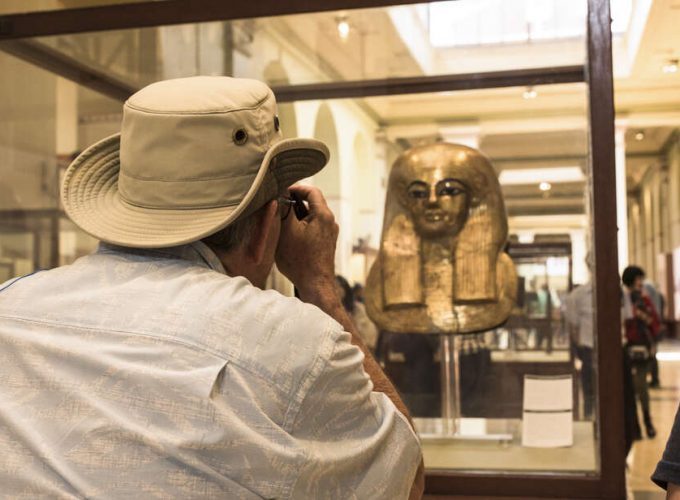
Created with Sketch. Cairo, Egypt
Cairo (Egyptian) Museum, Citadel & Mohamed Ali Mosque

Created with Sketch. Cairo, Egypt.
Pyramids of Giza, Sakkara & Memphis: Private Tour with Lunch

Created with Sketch. Sharm - Hurghada - Ain Sokhna - Dahab
Royal Sea Scope Submarine Red Sea Trips
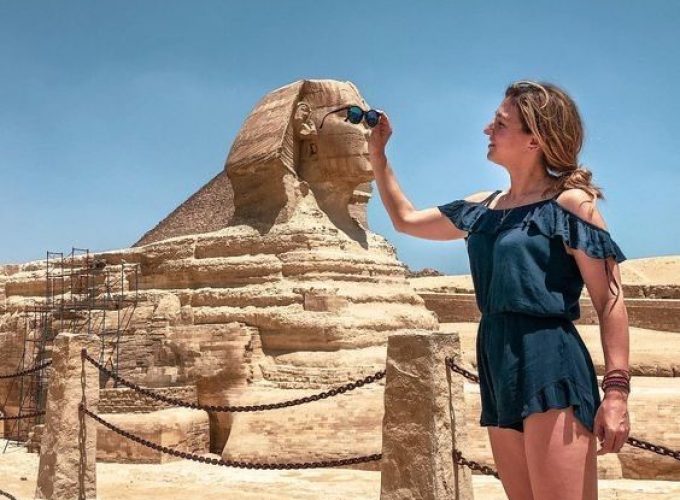
Created with Sketch. Egypt, Cairo
Egypt Tour Package: 4 Days – 3 Nights Cairo
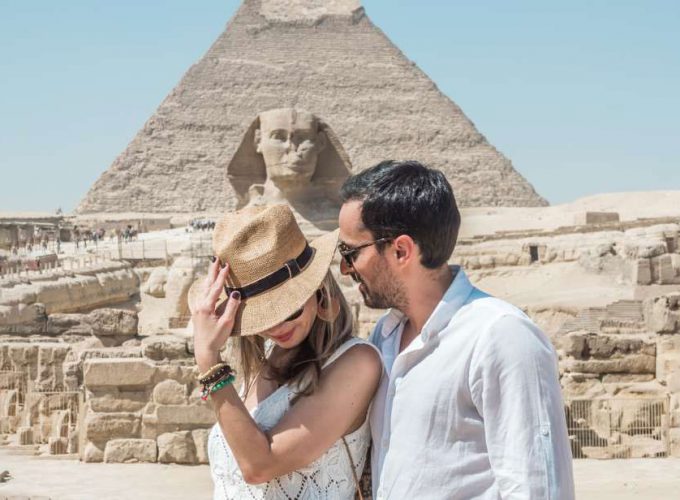
Created with Sketch. Egypt, Cairo, Luxor, Aswan
Egypt Tour Package: 8 Days – 7 Nights Cairo, Nile Cruise, Luxor, Aswan
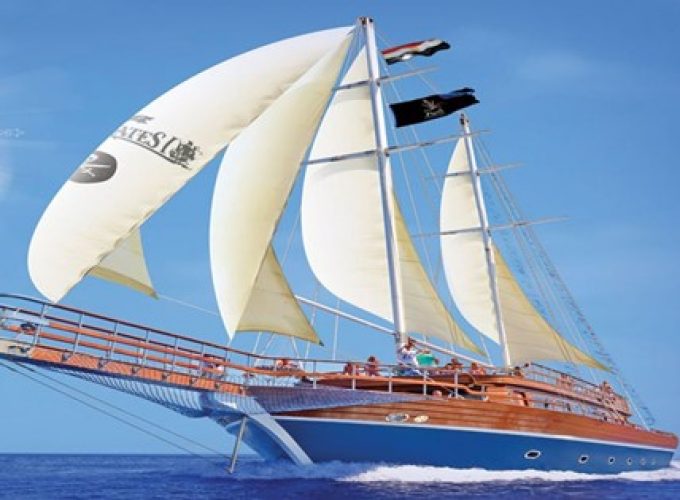
Created with Sketch. Sharm El Sheikh - Hurghada
Pirates Sailing Boat Trip
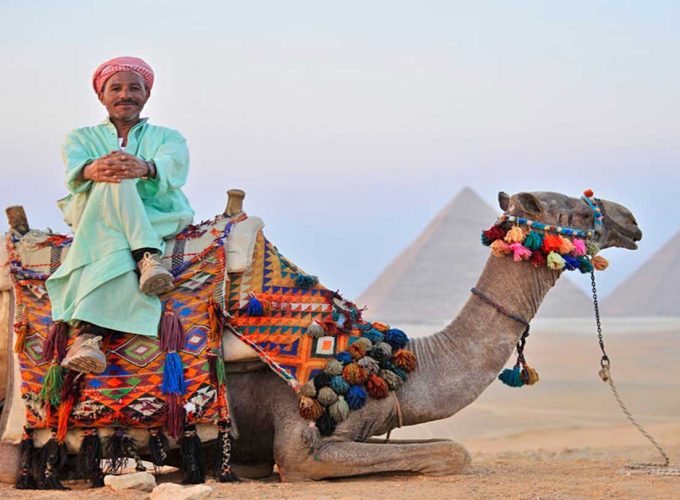
Egypt Giza Pyramids Tour
Eleganza travel services, nile cruises, airport & hotel transfers, special events handling, egypt tours by location.
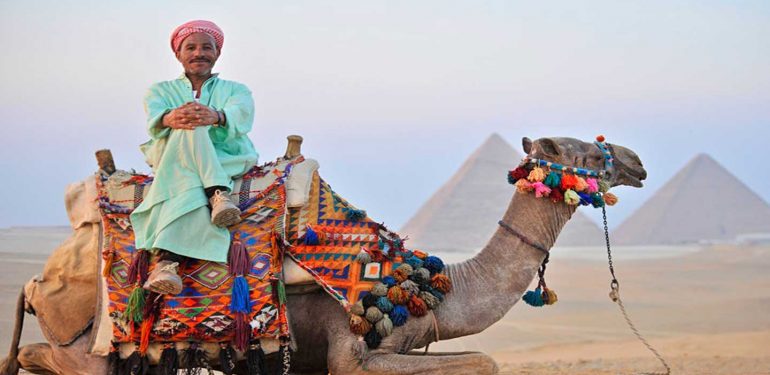
Sharm El Sheikh
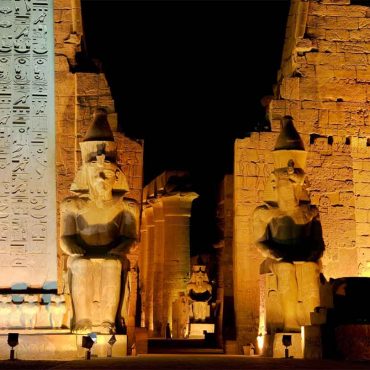
Discount 20% Off
Discover our Budget Tours
or continue with
Select User Type
Reset Password
Enter the e-mail address associated with the account. We'll e-mail a link to reset your password.
Egypt Travel Tips: 24 Essential Things You Should Know Before You Visit Egypt (2024)
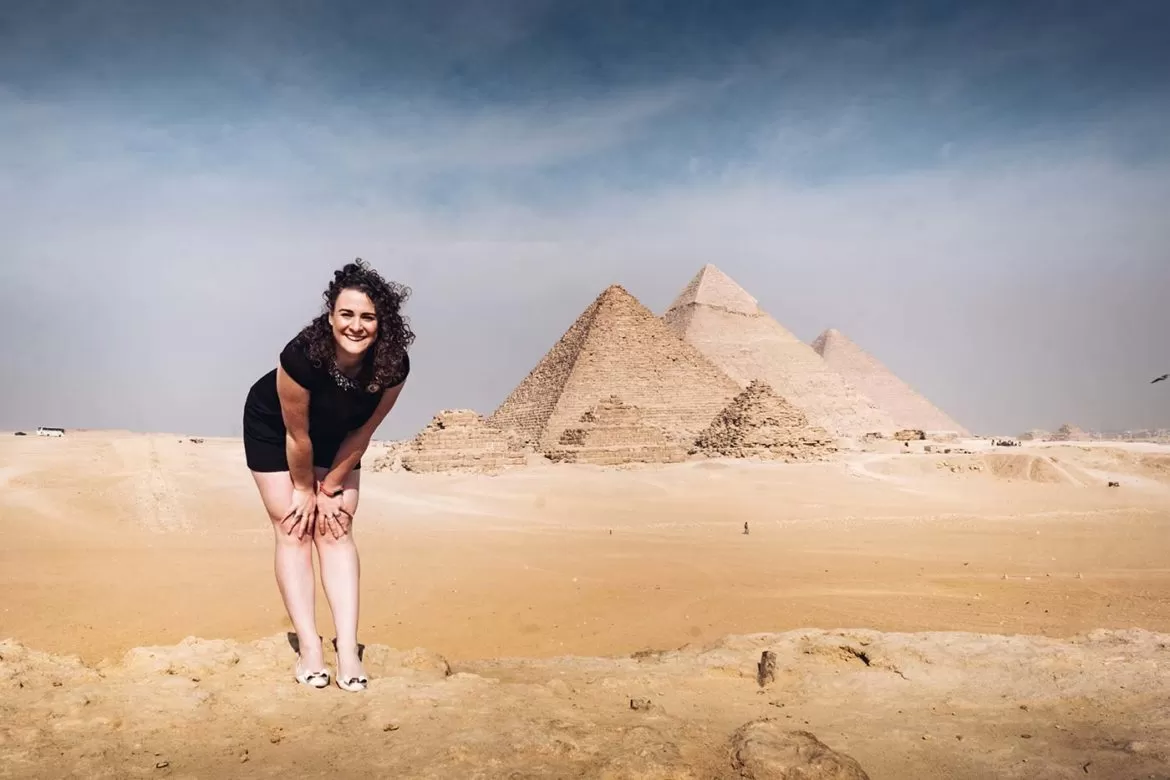
Travelling to Egypt? This Egypt travel tips guide will give you a detailed rundown of absolutely everything you should know before visiting Egypt. Including what to wear, tipping culture, scams, and loads of other useful hacks.
Egypt is awesome. Seeing its magnificent monuments and the mighty Nile will no doubt leave a lasting impression on you.
If you’re reading this, then there’s are good chance you have either booked your flights to Egypt or you’re seriously considering going. Either way, that’s great! You’ve come to the right place and are in good hands.
You won’t regret deciding to travel to Egypt. I know you will have a fabulous time.
How do I know that? Because you’re here reading this article!
You’re doing the right thing by researching and arming yourself with information. This is guide covers literally everything you need to know before visiting Egypt.
This is a very honest (and sometimes brutally honest) guide. No sugar-coating. My intention is not to be a Debbie Downer. I simply want to prepare you, so you will have a wonderful time because there won’t be any nasty surprises.
You won’t find a more comprehensive guide out there on how to prepare for and what to expect in Egypt. I’ve literally poured all my knowledge (and then some!) into this guide because just like you, I was both excited about going to Egypt but also very anxious and probably a bit paranoid too.
With that in mind, here’s everything we’ll cover. Plus a bonus tip at the end you won’t want to miss!
Looking for something in particular? Use this table of contents below to jump around using the links.
Table of Contents
Why you should go to egypt, is it safe to travel to egypt.
- Is Egypt Safe for Solo Female Travellers?
- Survival Arabic Language Guide
When Should You Go to Egypt?
What is the safest way to travel around egypt.
- Food and Upset Stomachs
- Heat and Hydration
- Vaccinations
- Haggling and Bargaining
- Nothing is free
- Cairo Airport
- Crossing the road
- Photography
- Camel Rides
- School Children
- Mosques and Religious Sites
- Fridays and Saturdays
- BONUS TIP: Fake Papyrus Scam
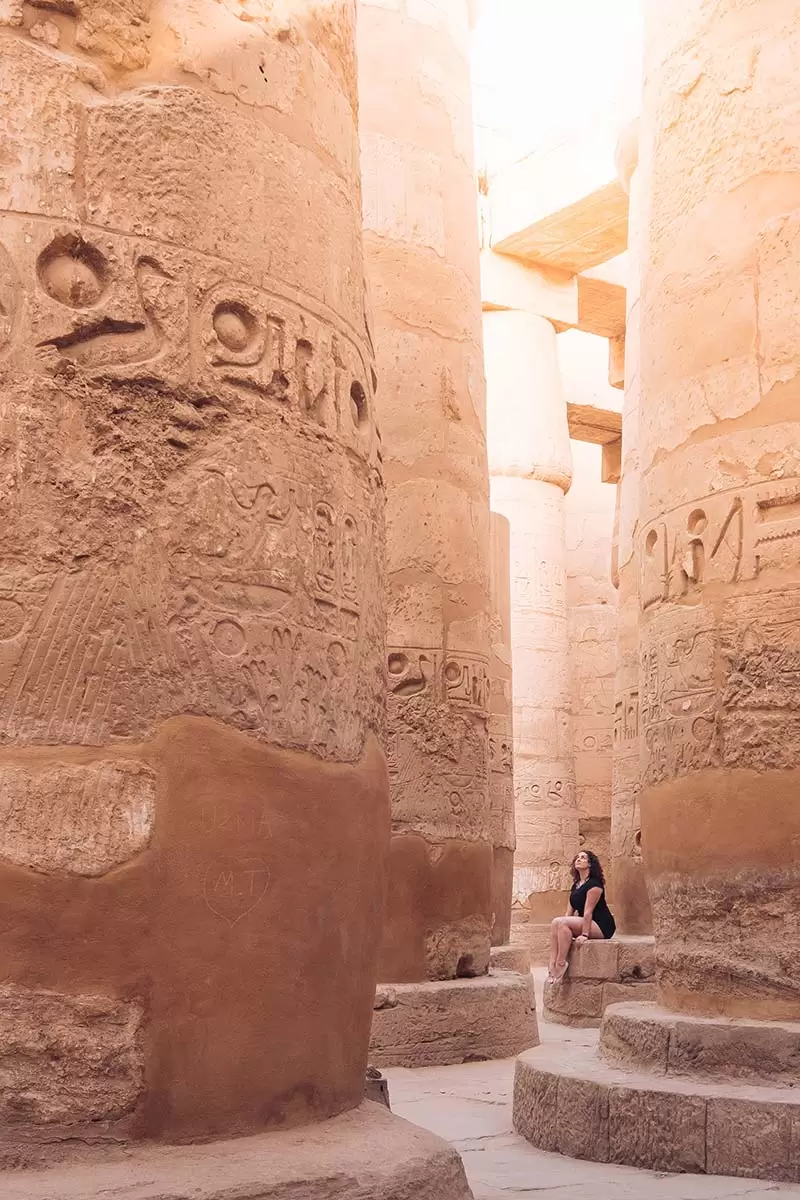
Karnak Temple
There’s so much to love about Egypt and nothing comes close to experiencing it in in person and not through a TV screen. The history, the temples, the smells, the heat, the sand, the Nile and the moment when your eyes finally gaze up at the Pyramids of Giza. All along the Nile you can trace the Ancient Egyptians through history as you visit their impressive and carefully decorated temples and tombs. Learning about the Ancient Egyptians, how they lived, their beliefs, inventions, and actually seeing their creations is something that will stay with you forever. Egypt is simply a marvel that should be experienced by everyone.
Yes! It’s much safer than the media may lead you to believe. Which is probably why you’re here reading about this Egypt travel tips guide
As an Aussie, I always check the Australian Smart Traveller site for travel warnings. This is the equivalent of the travel warning list by the U.S Department of State for American citizens.
While Egypt is currently listed with a Level 2 travel warning (go to page 4 ) (True as of August 19, 2018), it’s important to remember that governments will always err on the side of caution.
There are four levels used. Where Level 1 means ‘exercise normal precautions’ and Level 4 means ‘do not travel’.
As you can see, this particular warning doesn’t mean you shouldn’t travel. It just means that certain areas are better off being avoided and you just need to be more cautious when visiting them. That’s up to you to decide what you’re most comfortable with.
As of August 2018, the areas of Egypt which are flagged as dangerous are:
- The Sinai Peninsula (with the exception of travel to Sharm El-Sheikh by air) due to terrorism.
- The Western Desert due to terrorism.
- Egyptian border areas due to military zones.
The site goes on to suggest ways in which you can reduce any risk:
- Stay alert in locations frequented by Westerners.
- Avoid demonstrations and crowds.
- Obtain comprehensive medical insurance ( get a free quote here ) that includes medical evacuation.
- Enroll in the Smart Traveler Enrollment Program (STEP) to receive Alerts and make it easier to locate you in an emergency.
- Follow the Department of State on Facebook and Twitter.
- Review the Crime and Safety Report for Egypt.
- U.S. citizens who travel abroad should always have a contingency plan for emergency situations. Review the Traveler’s Checklist.
There are other ways you can ensure your safety and help you to feel more confident with your decision to travel to Egypt. This is covered in a later section.
Because of all the negative attention Egypt has received, tourism has fallen drastically which is great for us travellers but not so great for the locals who depend on the tourist dollar.
With fewer visitors, there are also fewer scammers and smaller crowds at famous attractions. So, there is a silver lining.
On a more personal note, I felt safe during my entire Egypt trip which started in Cairo and went all the way down the Nile to Abu Simbel near the Sudan border.
If I can offer any addition peace of mind, it’s that tourist attractions are generally the safest areas to be in in Egypt as they are heavily guarded.
In addition to this, the locals who I met in hotels, restaurants, supermarkets, souks and the Telecom store where I bought my local SIM card, were all very helpful, kind, and friendly.
Is Egypt safe for solo female travellers?
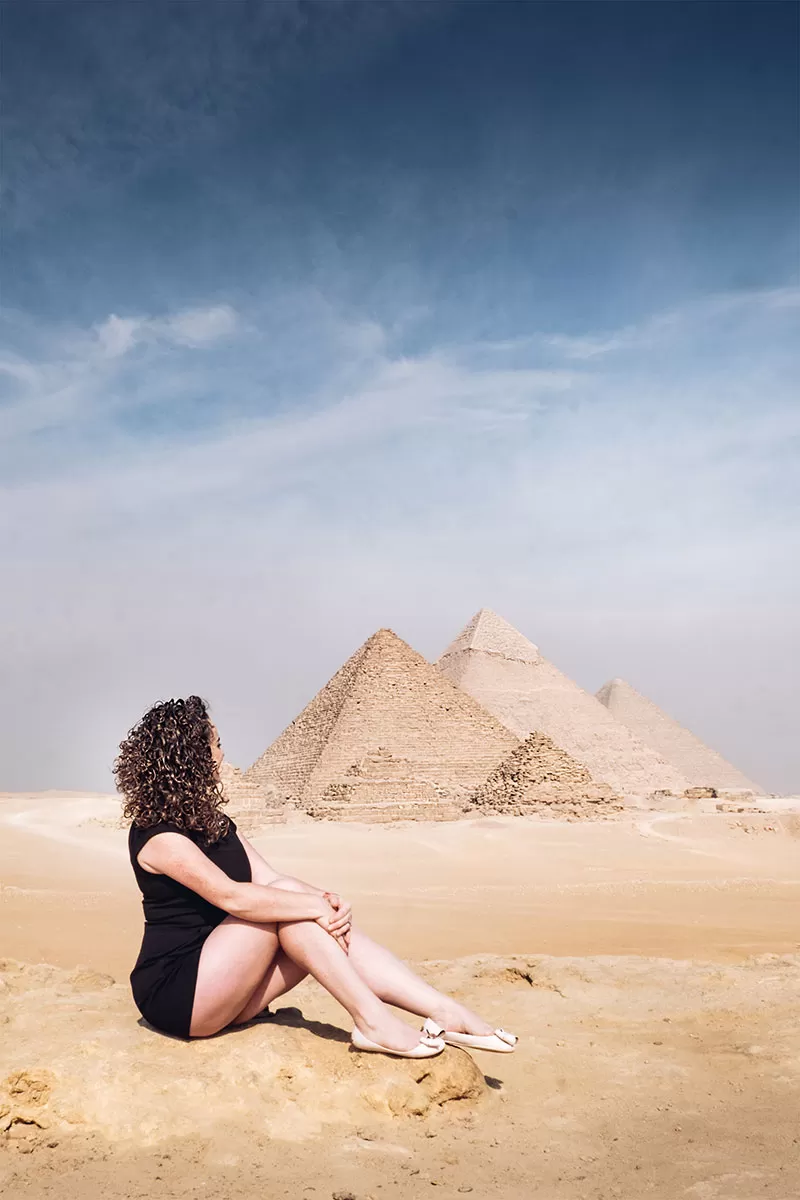
Admiring the Pyramids
Yes! While Egypt is safe, as a female, you will feel a little bit uncomfortable. This feeling will come mainly in open public places such as walking down the street and in souks.
It’s in these places that you will find men loitering, either by themselves or with a couple of other men. I can only describe this as people watching as most of the time they are sitting on plastic chairs and watching the world go by, including us.
If you’re female, you will receive a lot of looks. In my experience they were harmless. If anything, it just made me feel a bit self-conscious.
Sometimes these men will try to start talking with you or guess where you’re from (they’re very good at getting this right, by the way). Somehow they can tell an Australian from an American just by looking or listening to us speak. Very clever cookies.
It’s at this point, you should do what a local Egyptian man told to me, and that is, to ignore them. Don’t even look at them. This will be enough to discourage them. It might seem like you’re being rude, but ultimately it will protect you.
I was told that the seemingly harmless conversations that start with something like guessing where you’re from, will eventually lead into being invited into their home, shop or restaurant, where they will offer you tea (a traditional welcoming custom), then after some more small talk, they will present you with something and insist you buy it. If you decline, they will get angry.
Okay, so I just painted a terrible picture, but it’s important to be aware of these things. I experienced this first-hand and didn’t know what had happened until my local guide told me that it’s a very common ploy.
Not all men are like this by the way. Just some that give the rest a bad name.
Let’s move on, shall we?
Survival Arabic Travel Phrase Language Guide
Knowing some Arabic ahead of travelling to Egypt is such a game changer. When you can show that you speak a bit of the Arabic language and can recognise certain keywords, this will give you an extra layer of protection, especially when it comes to dealing with money.
Not only will you feel more in control, but locals will appreciate and respect your efforts to learn their language.
Here are 13 useful Egyptian Arabic words and phrases you should learn and use:
- Hello – salam / marhaban / ahlan
- Peace be with you – As-salāmu alaykum – Even though this literally means ‘peace be with you’, it is a commonly used greeting. The response would be Alaikum Salaam, meaning ‘upon you be peace’.
- Thank you – shukran
- Please – min fadlak (if you’re a male), min fadlik (if you’re a female)
- Y ou’re welcome – Afwan
- Yes – aywa, No – lā, Ok – Mashi
- How much is this? – bi-kam da. You can say, I’ll pay 100 – Enna hafda meeya. Incidentally, if you say ‘meeya meeya’ (’100, 100′) this means ‘perfect’ or ‘really good’.
- It costs too much – Da ghali awi
- I would like… – momkin
- I want – Enna iza (if you’re a female) or Enna ayez (if you’re a male). To negative the sentence, add ‘mish’. For example, ana mish iza/ayez (I don’t want)
- I don’t understand – ana mish fahem
- Go away – Em’shee
- Pyramid – Haram. Most Egyptians don’t understand the word “Pyramids”, so make sure you learn the Arabic word for them, especially if you’re taking a taxi there. Haram also means. The strict translation of the Arabic word ‘harim’ means (a prohibited place) and is from the verbal root ‘harama’ (prohibited), designated as ‘haram’ (a pyramid). ( Source )
For more Arabic phrases, get my free Arabic travel phrases guide here.
Between June and August, the temperature in Egypt is unbearable. While you may have the luxury of quiet tourist attractions and more hotel options, to be honest, in that heat you won’t want to do anything but relax in a pool somewhere.
The best time to visit Egypt is in Spring. The weather is pleasant and the major attractions such as the Pyramids of Giza, Aswan, and Luxor are still fairly quiet.
You’ll also benefit from cheaper hotel prices, especially if travelling either side of the high season which is December to February.
Avoid traveling during Ramadan.
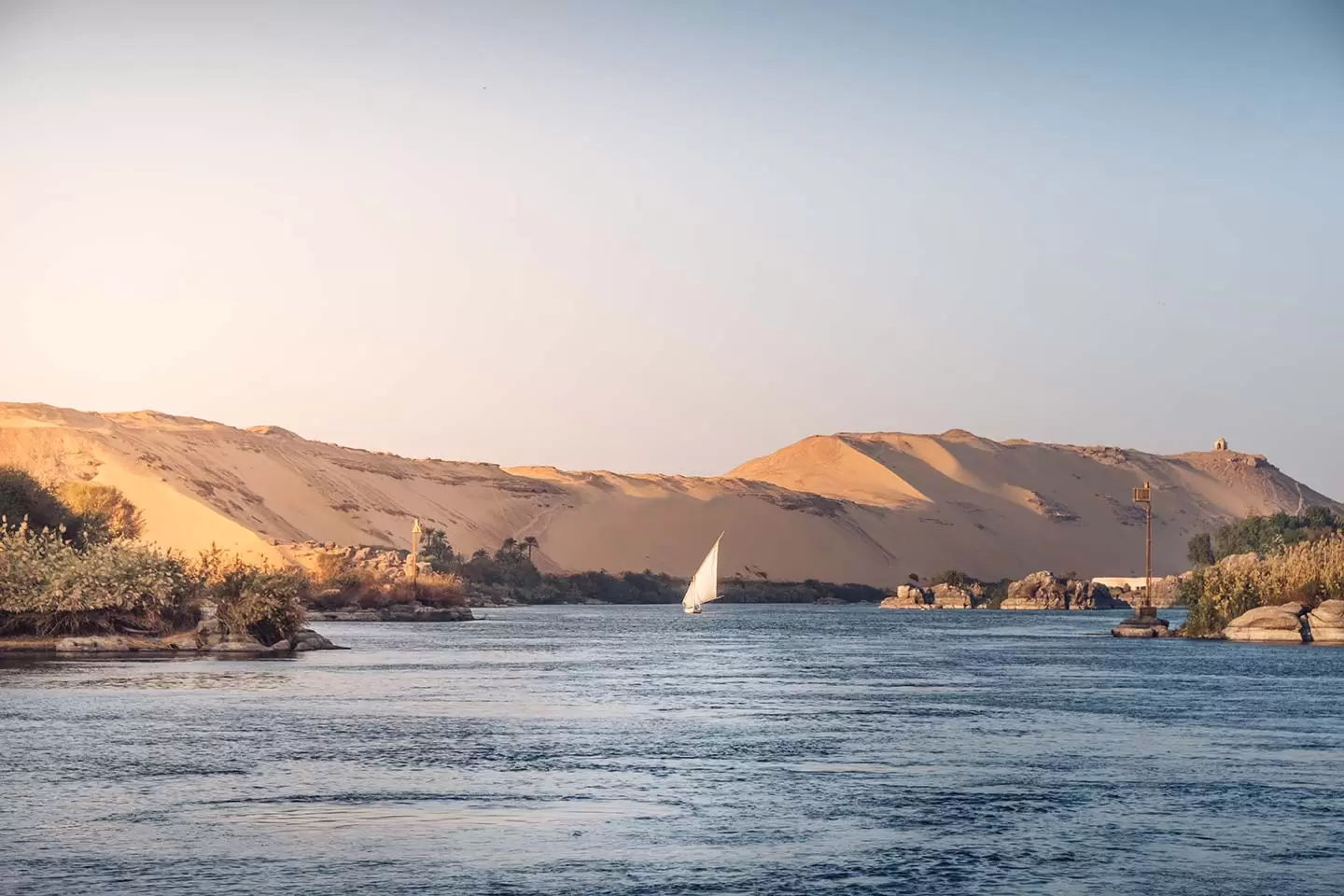
Cruising down the Nile at sunset
This is probably my top tip in this guide. It’s not Earth shattering, but it made all the difference to me and was the only way I could see myself travelling around Egypt and finally fulfil my childhood dream.
Go on an organised group tour!
To simplify and avoid overthinking everything, I knew that I had to travel with an organised group tour. That way I would have a local guide with me, I wouldn’t have to worry about transportation and other logistics and I could just concentrate on having a good time.
Choosing Topdeck to go to Egypt with was a no brainer, for two reasons. I’d already travelled with them before around Outback Australia and really rated my experience with them. The accommodation, transportation, guide and organisation was all spot on. Plus, I met some wonderful people that I’m still friends with.
The second reason (which might sound a bit silly) was that they are an Australian company, which I knew would put my dad’s mind at ease. I knew he would be super worried about me going. Even me living in London makes him worry!
By the way, remember that Egyptian guy I mentioned earlier who warned me about talking to strangers? That was our Topdeck tour manager, Ramzy. Top bloke!
Ramzy gave a bunch of useful tips, a language guide (on behalf of Topdeck), and was basically a kind of bodyboard who protected us from negative experiences and scared off a few scammers. This made all the difference. If you’re curious, I went on the Egypt Express tour . Book your Egypt tour here.
Now, let’s get into the niggity gritty of the everyday realities of travelling in Egypt.
Top 24 Egypt Travel Tips You Should Know Before You Visit Egypt
The tap water in Egypt is heavily chlorinated and tastes terrible. It’s okay for brushing your teeth with, but don’t drink it. Especially if you have a sensitive stomach. Buy bottled water. It’s easy to get and only costs 5 EGP (0.28 USD) for a 1-litre bottle.
2. Food and Upset Stomach
You’re in a foreign place with foreign food, diarrhoea will happen. To help prevent this, again, buy bottled water and check the seal isn’t broken. Avoid eating salads, raw vegetables, unpeeled fruit, and meat that isn’t thoroughly cooked. Don’t buy food from street vendors that don’t have running water. If you want an ice-cream, check that it hasn’t melted and been refrozen. If you do get an upset stomach, take diarrhoea relief tablets and drink plenty of purified water with fresh lime.
3. Heat and Hydration
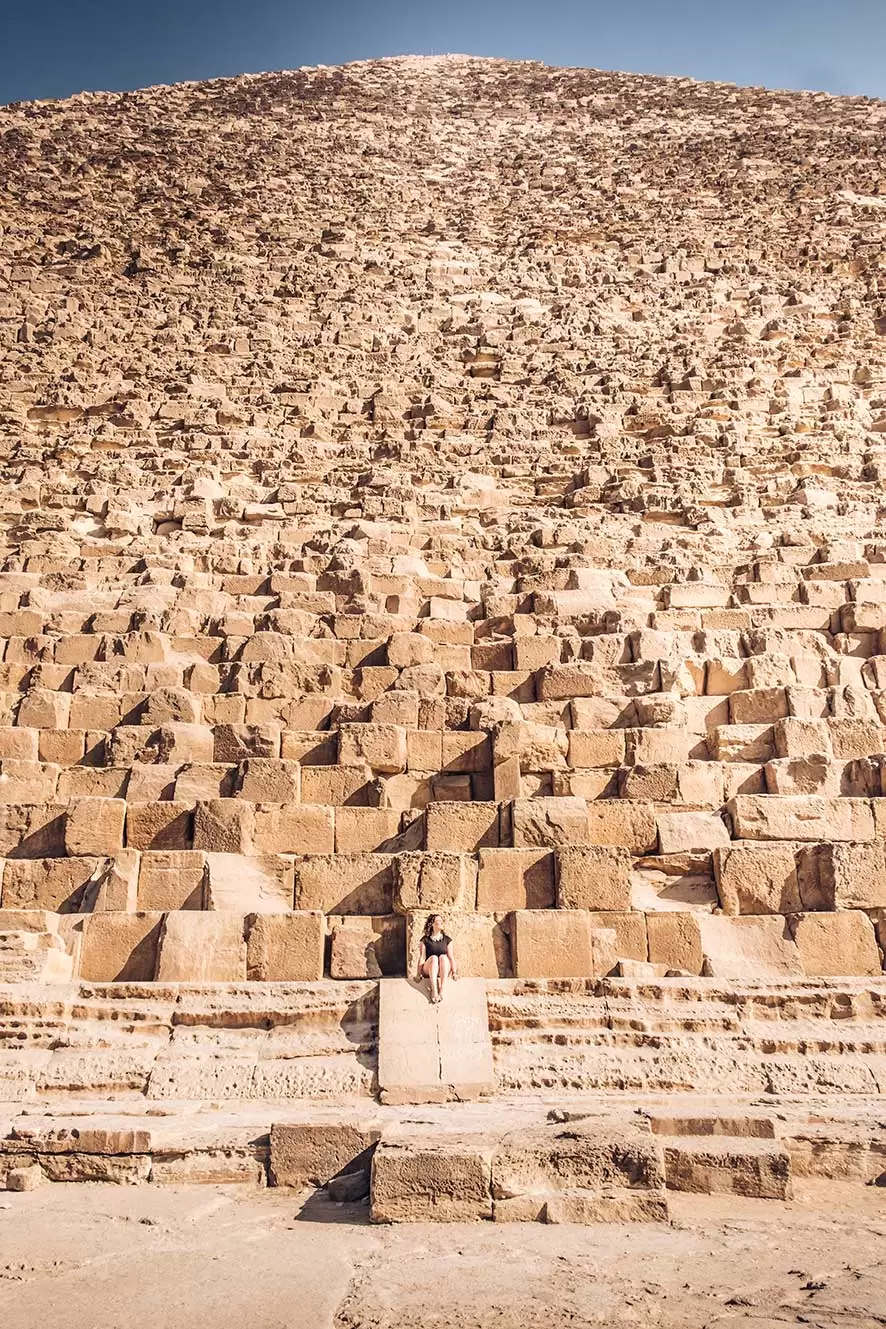
Looking up at the Great Pyramid of Giza
Egypt gets hot, obviously. You’re in the desert! Dehydration, sunburn and heat exhaustion are common, especially in Upper Egypt. As your sweat evaporates you may not realise how dehydrated you are.
If you’re travelling outside of winter, then I highly recommend wearing loose-fitting clothes made of natural fibre. Keep up your fluids up by carrying around this travel bottle and add a bit of extra salt to your food to replace salts lost in sweat. Pack electrolyte tablets to take just in case you feel unwell.
If you need further medical assistance, Egyptian pharmacists generally speak English and can be trusted to provide sound advice and help you find a doctor if needed.
4. Vaccinations
Officially, visitors to Egypt do not require any vaccinations unless you’re coming from an infected area. However, there are some vaccinations you should get or have topped up as a precaution.
Check with yourr GP what they recommend. Beyond ensuring your tetanus and polio is up to date, other common recommendations include getting vaccinations against typhoid, Hepatitis A and B, and rabies. Rabies is a problem throughout Egypt, so avoid touching stray animals such as cats, dogs, monkeys, and bats.
Money and Valuables
5. currency.
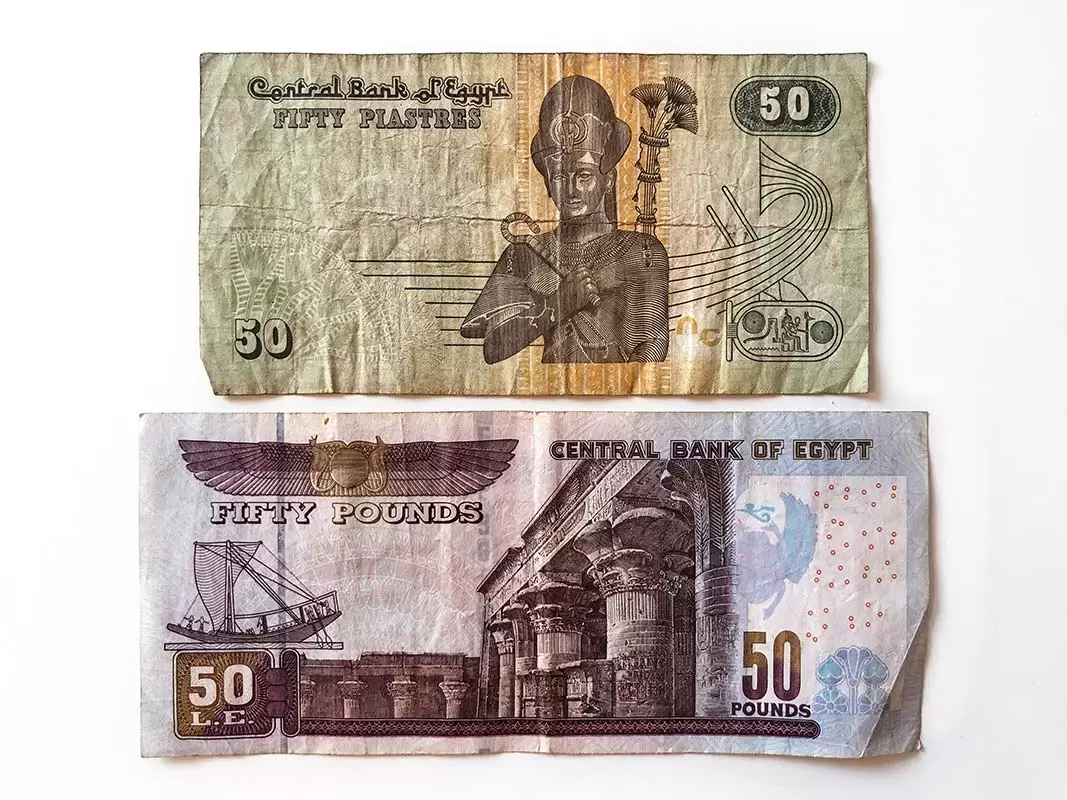
Remember the difference between 50 Piastres (top) and 50 Egyptian Pounds (bottom)
The unit of currency used in Egypt is the Egyptian pound, written £E or LE. The Egyptian pound is divided into piastres (pt). My top tip is to recognise the difference between the 50 pt against the 50 Egyptian Pound notes since they are very different in value.
Make sure that if you’re given change or are paying for something, that you’re not duped into thinking that 50 piastres (or cents) is the 50 Egyptian pounds note. This is a common scam that is used on unsuspecting tourists. When I found out about this, I made sure I kept both denominations on me so I could tell them apart. Compare the difference of the 50 pt and 50 LE in the photo above.
Another word to add your vocab is ‘baksheesh’, which means ‘tip’. You’ll hear this one a lot and it will be expected for anything and everything. Tipping locals for their services is expected and a way of life in Egypt.
Many Egyptians are paid such low salaries that receiving tips is an important part of their income. But rest assured you won’t have to fork out much.
In restaurants, it’s normal to round up the bill or give 10 per cent directly to the waiter. Smaller tips (0.25 piastres to 1 EGP) are given to the likes of lavatory attendants, porters, and anyone willing to bend the rules a bit like letting you enter a site after hours or taking a photo in a restricted area.
While the rules are often bent in Egypt, authorities are cracking down on certain things (like being able to take a photo inside King Tuts tomb) with hefty fines. Don’t risk offering money just to get your way.
7. Haggling and Bargaining
One of the best things to do in Egypt is to visit a souk market. When browsing comes to buying and you ask, bi-kam da? (How much is it?) be prepared to bargain hard or walk away. As a general rule, offer one third of the asking price and expect to pay half.
8. Nothing is free
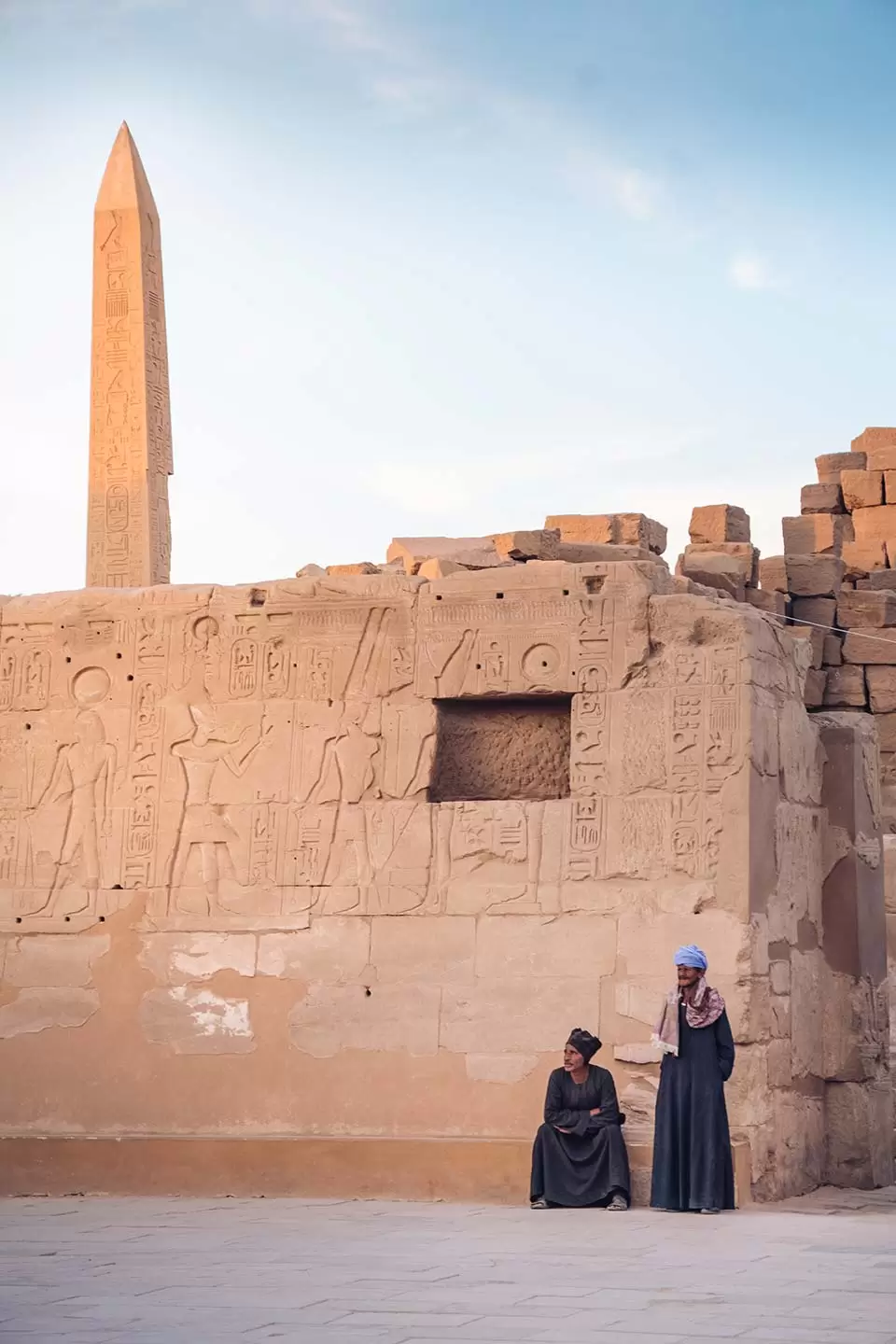
Taking a sneaky photo at Karnak Temple without being spotted
Want to take a photo of a camel at the Pyramids? If the owner catches you look, he will probably demand to be paid.
I learned this lesson the hard way. I was at least 20 metres away when I was spotted taking a photo of a camel resting. It’s up to you if you choose to offer the owner something and if you feel like you’ve done something wrong.
A similar incident happened when I was at Philae Temple. Three men were talking amongst themselves and with the temple behind them I thought it would make a great shot. With at least 50 metres between us , I took the shot. They spotted me and came over and offered to have a group photo. By this point I knew the drill and was happy to give them a little baksheesh.
9. Belongings
It goes without saying that you should always keep your valuables with you. Decide on whether or not you feel comfortable leaving your passport, laptop or iPad in the hotel room safe or if you’re better off keeping it on you. Using a PacSafe is a great option if you want to leave stuff in your room and there is no safe available.
If you go on a tour, don’t leave anything valuable on the bus, even if the driver is around. They can’t be responsible if something happens.
What to Wear
10. clothing.
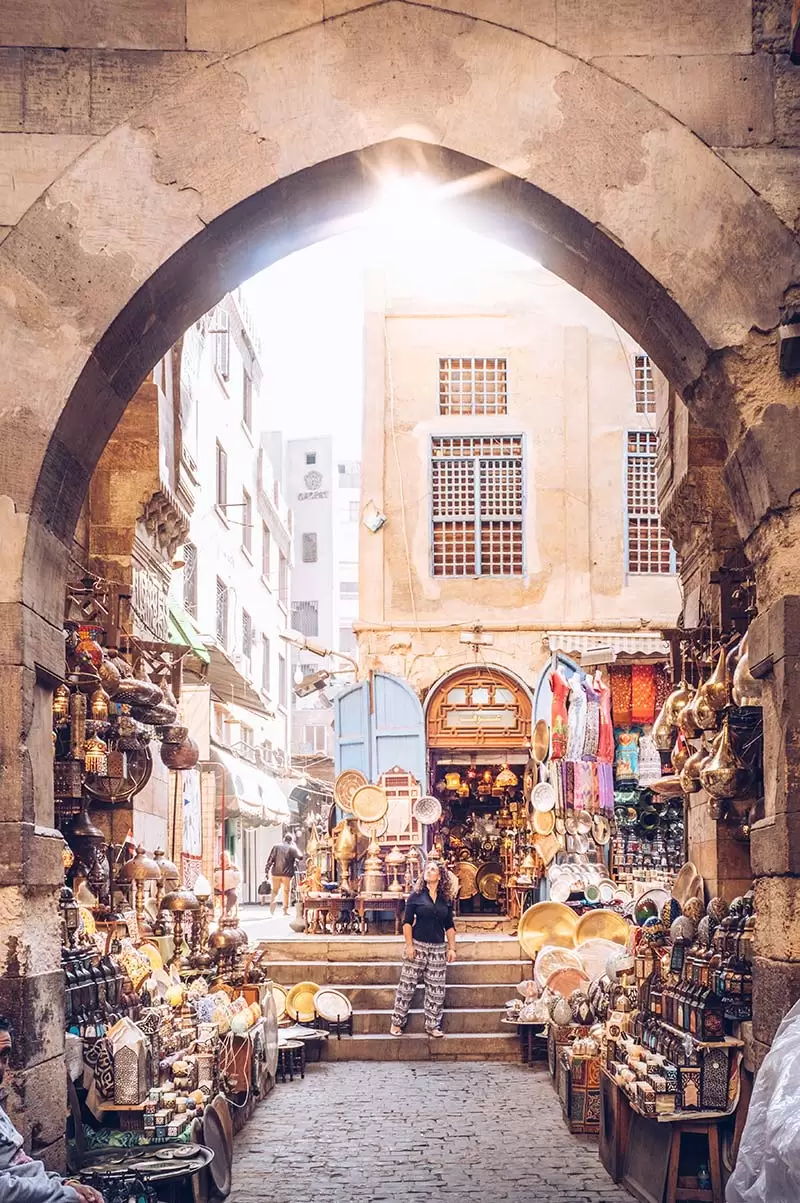
Khan el-Khalili market in Cairo
Egypt is dusty, sandy, and dirty. Your clothes will dirty easily and you’ll be washing your hair most nights. Be prepared to rinse out your clothes each night ( this will do the trick ) or pack extra items to wear.
So, what should you wear? As a general rule, wear loose-fitting clothes that are made of breathable material.
Ladies, it’s a bit more complicated for us. While Egypt is one of the more liberal Islamic countries, it has become more conservative in recent years with many women wearing a hijab or headscarf. Female tourists aren’t obligated to wear these but you may feel more at ease doing so, especially in mosques.
As a general rule, avoid showing your chest, shoulders or legs below the knees.
At this point you’re probably looking at my photos wondering why I didn’t cover up my legs, and you’re right! I did pack longer dresses, but when Ramzy told the group that it’s ok to wear shorts and normal summer attire when visiting monuments such as the Pyramids and the temples along the Nile, I felt comfortable in taking his advice.
The only exception he made was when visiting mosques, markets or souks. Which is why you’ll see me wearing long pants in the photo above in Khan el-Khalili souk in Cairo.
If you’re a female travelling alone, place ring on your wedding finger, this will show respectability.
11. Footwear
However hot and tempting it maybe to wear flip flops, with all the dirt, sand and grime present, I recommend wearing closed toe shoes.
You’re going to be doing a lot of walking in some pretty unclean areas and the last thing you want is having dirty feet all day.
Getting Around and Transportation
You need a visa! For Americans and Aussies, and a few other countries, you can either apply in advance for an Egypt e-Visa , or queue at the border for a visa on arrival.
For most travellers, the visa will cost roughly $USD25 (single entry, valid for 30 days) or $USD35 (multi-entry). Since I travelled with Topdeck, they organised my visa once I arrived. All I had to do was bring American Dollars to pay for it. Only American Dollars or Egyptian Pounds are accepted. In addition to your visa, ensure your passport is valid six months beyond your planned date of entry.
Taxis are cheap and easy to use. Simply go to a main street and wave your hand, that’s it. They even have Uber if you prefer! Just be sure he follows the GPS.
Before jumping in the taxi, agree on the price beforehand and stick to it. Not matter what reason they come up with. For getting around Cairo, you can expect to pay 50 to 80 EGP. (2.70 – 4.50 USD).
If you’re staying in Downtown Cairo, getting to the Pyramids should only take 30 minutes, but Cairo has very busy roads so it can take 60-90 minutes.
There are three kinds of taxis in Cairo: Black Taxis, Yellow Taxis and White Taxis. Black taxis are the oldest ones. Most are without a meter and without air-conditioning. White taxis are the modern equivalent of black taxi. They have a meter and air-conditioning. Yellow taxis are professionally run and can be booked over the phone but are the most expensive. I recommend getting a white taxi and bargaining hard.
14. Air travel
With raised safety concerns in Egypt, some airlines like British Airways are becoming more strict with what you can take in your carry-on luggage or even in your checked luggage.
I flew both ways with British Airways but they only had an issue when returning to the UK. They had very strict guidelines on what size lithium batteries were allowed on board.
A bunch of us were fuming when we were forced to leave behind expensive powerbanks which we weren’t reimbursed for or given alternatively means of keeping them. To give you an idea, this is the one I had to part with. *sniff*.
Air France, who were also flying that day but didn’t have this rule. Check with your airline ahead of travelling so you’re not caught out and left out of pocket.
15. Cairo Airport
Cairo Airport is unlike any airport you’ve experienced. Upon arrival, everything seems pretty standard until after you go through passport control.
Once you pick up your luggage and head to the exit, there will probably be a massive long queue that wraps around the luggage collection hall. Guarding the exit is one or two men who will look you up and down and decide if they want to check your luggage.
Since we were with a Topdeck escort who came to help us get a visa and take us to the hotel, he was on familiar terms with the airport staff and was able to get us through quickly.
Once we got through to the other side, our escort disappeared briefly to hand back a permit he was given in order to come and meet us inside. This is just another reason why travelling with an organised tour is great.
If, at the end of your trip you leave via Cairo Airport, be prepared for three separate security checks; one as soon as you enter the airport at the entrance, one at customs, then another at the gate. The first one is where they’ll flag any illegal objects like my poor powerbank .
16. Crossing the road
Crossing the road in Cairo is a skill. If you’ve ever been to Rome and stared down a driver then confidently walked out into a busy street, then you’re well-prepared for Cairo.
If locals see you struggling to cross, they will either let you join their own crossing convoy or come and assist you.
If you’re still too nervous to go it alone, you have some other options for crossing the road:
- Wait for a lull in the traffic before crossing (this may take a while).
- If possible, cross where there is only 1 or 2 lanes of traffic. Don’t stop in the middle of the road between the two lanes either. Cars will drive dangerously close to you while you wait for the other lane to have an opening.
- Ask someone to join them as they cross. If they can’t understand English, simply smile and indicate to the other side of the road.
- Find a policeman to help you, there are plenty around.
17. Driving
Whilst driving from Cairo to Luxor during the night, I noticed that many drivers didn’t have their headlights on. This is totally normal and nothing to be concerned about. Egyptians believe they see better this way.
When a car is approaching, they’ll flash their lights to let them know they’re there. Some drivers may keep their fog lights on. If you’re wondering, our Topdeck driver kept his headlights on.
Cultural Tips and Other Useful Tips
18. photography.
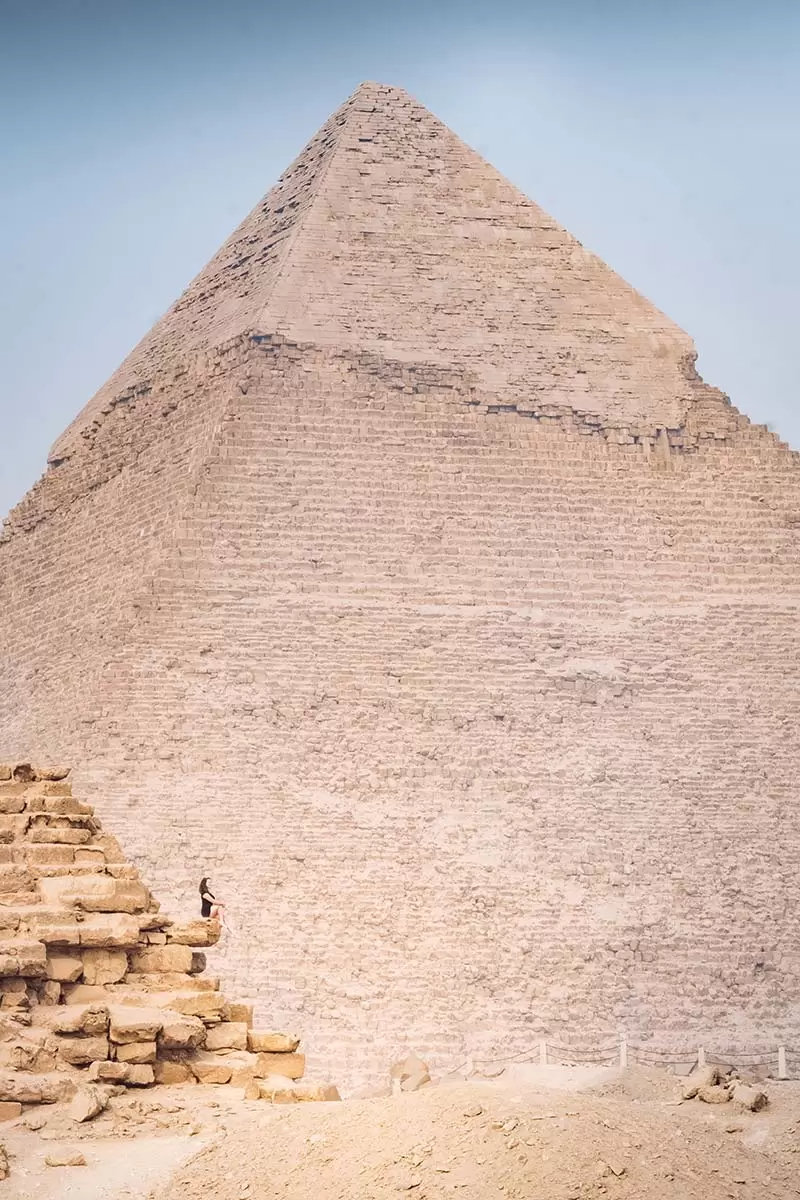
You will have to pay a small fee to take your camera inside the Pyramids Complex
Want to take your camera with you? Be prepared to pay for it!
Whether you want to take photos or film video, every monument, temple, tomb and museum you visit will charge a small fee just to take it inside. Expect to pay anything from 50 to 100 EGP (2.70 – 5.60 USD).
I was even charged extra when guards are Philae temple saw my tripod. At first they wouldn’t let me take it at all then they came around when I said I wouldn’t use it so they charged me for another camera ticket.
Once inside, flash photography is generally forbidden and should be strictly followed.
19. Camel Rides
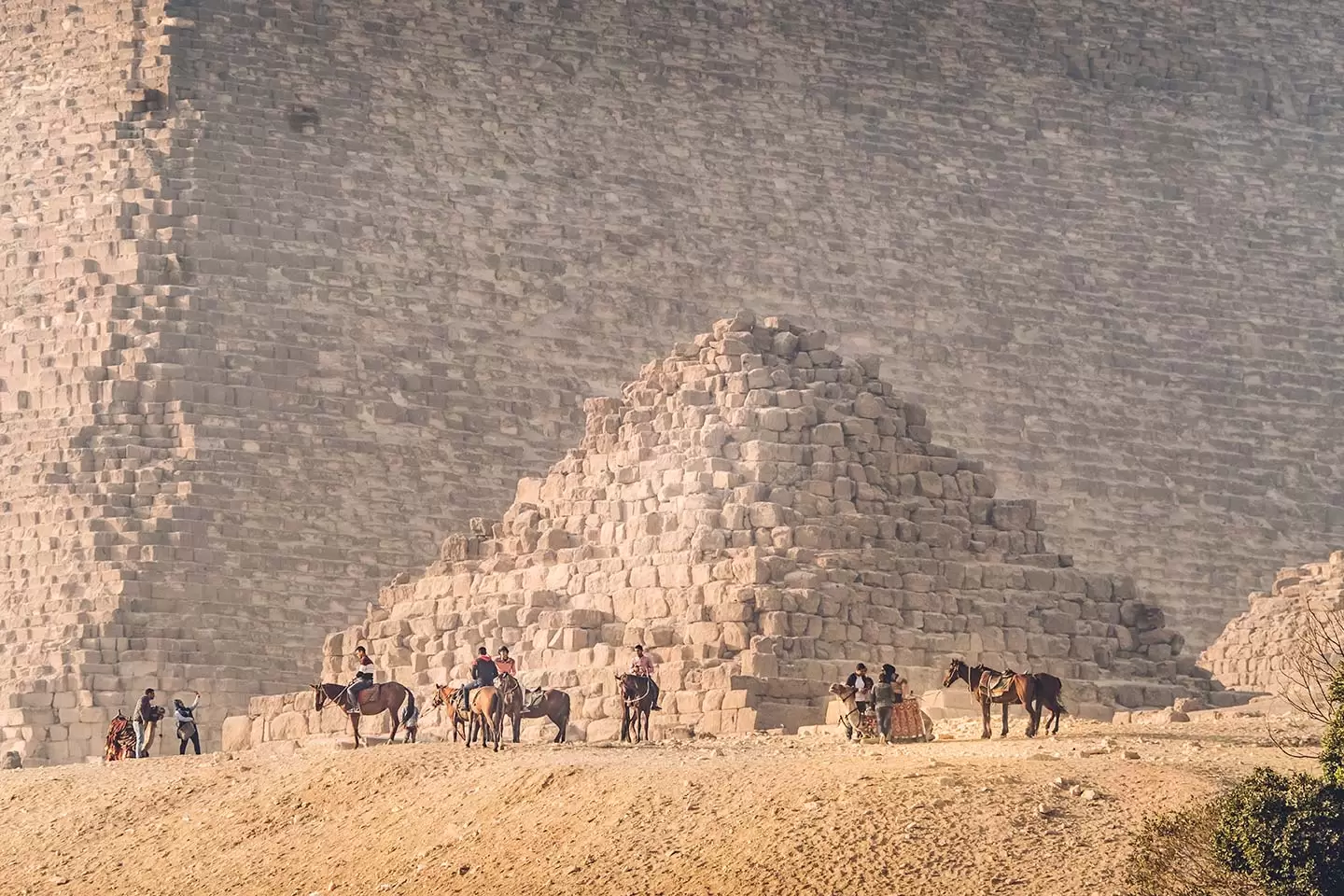
Camel and horse rides at the Pyramids of Giza
Going on a camel ride and taking a photo with the pyramids behind you is one of the most desired tourist souvenirs from a trip to Egypt.
If you know that going on a camel ride around the pyramids is something you definitely want to do, you may (and I hope), reconsider once you arrive and see how malnourished and badly treated the camels, and horses for that matter, are.
Egypt is a third-world country and many citizens are living in a state of desperation. As such, the men who run these camel rides prioritise feeding their families over feeding their camels. While they may have their priorities right, I can’t bring myself to support them. This has only become worse since tourism has declined.
If you do choose to take a camel ride, make sure you’re not hassled into paying more than the fair price. In order to crack down on scamming tourist signs have now been put up showing set prices for camel rides which are 50 Egyptian Pounds for 30 minutes.
Make sure you check out my guide on everything you need to know about visiting the Pyramids.
20. Toilets
Public toilets in Egypt are not the best, and that’s putting it lightly.
A trip to the loo will set you back 1 or 2 EGP and give you access to either a squat or western toilet. They generally don’t have toilet paper, are dirty, and the tap water may not be running. Bring your own toilet paper ( these flushable wipes are great ), hand sanitizer, and wipe down the seat if you must sit or get one of these.
There will usually be a hose next to the toilet, but the water will only be turned on if you pay a baksheesh.
Toilets in restaurants and hotels are usually staffed by an attendant who will give you toilet paper and turn on the tap for you. Giving a baksheesh of 25 – 50 piastres is standard.
21. School Children
You might feel famous when travelling around Egypt. At least that’s how the students in large school groups will make you think,
On countless occasions, at the Egyptian Museum in Cairo, the Pyramids, and Karnak Temple, young kids would run up to us asking for selfies or yell out and wave as our group walked passed. They were so excited and interested in us.
When I asked Ramzy why, he said that we are sort of celebrities to them. They watch people like us on TV who have very different lives from their own so they get excited when they see us in their country.
It’s actually very sweet. However, if you say yes to one, they’ll all come running. It’s best to politely decline from the start.
22. Mosques and Religious Sites
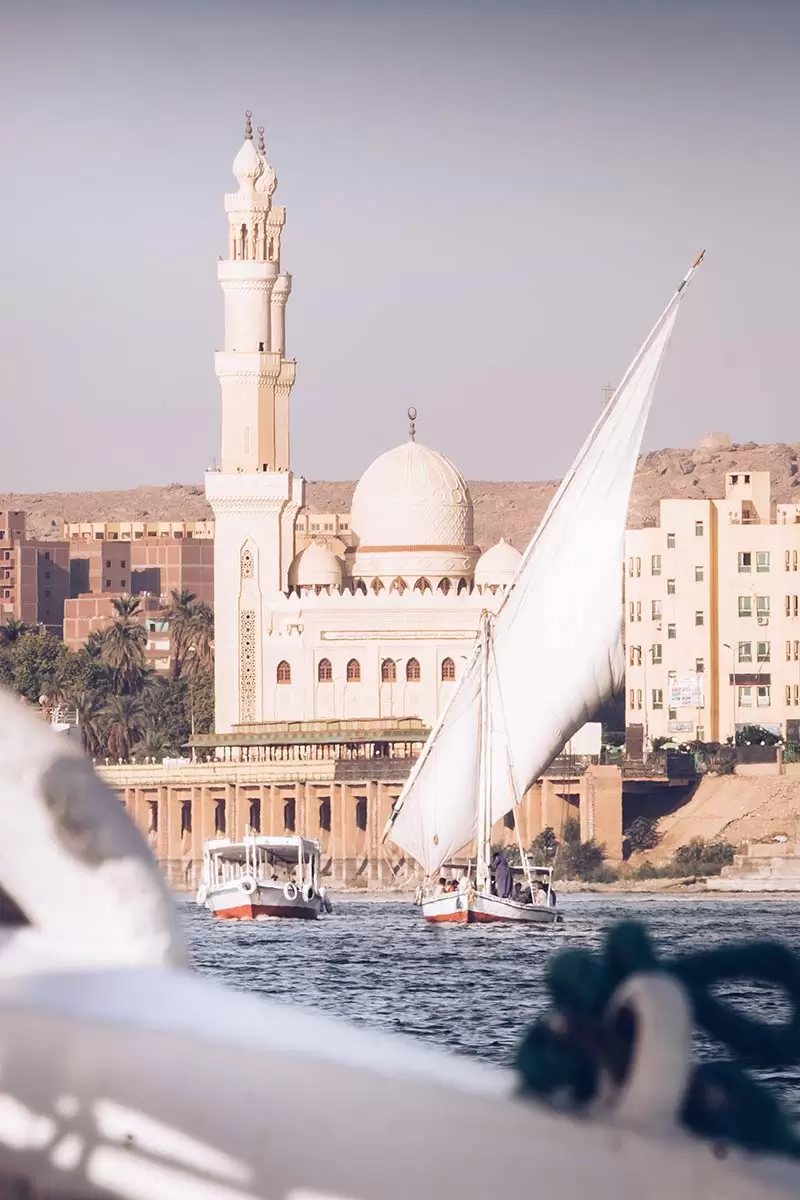
A beautiful Mosque on the Nile
Dressing modestly is a must when visiting mosques. Some places may ask women to cover their hair and will provide you with a headscarf. Before entering you will be required to remove your shoes and leave them with a shoe custodian (give him a baksheesh).
If you want to climb the minaret (tower), carry your shoes with the soles pressed together. It’s best to avoid visiting mosques during prayer times as to not intrude on worshippers.
23. Smoking
Everywhere you go, everyone will be smoking. Whether it’s a cigarette or shisha water-pipe, if you’re a non-smoker it can get really annoying.
Smokers are allowed to light up pretty much anywhere. The only exception is in fast-food restaurants thanks to an initiative by the environment ministry.
Restaurants have non-smoking tables, but these are almost pointless since they are surrounded by smoking tables. If you’re outside, try and stay upwind and always ask for a non-smoking room in your hotel.
24. Fridays and Saturdays
As in most Arab countries, their weekend falls on a Friday and Saturday. This means tourist attractions are much more busy on these days than the rest of the week.
I strongly recommend not visiting the Pyramids, Cairo Tower or the Egyptian Museum in Cairo on either of these days. The queues will be torture.
25. BONUS TIP: Fake Papyrus Scam
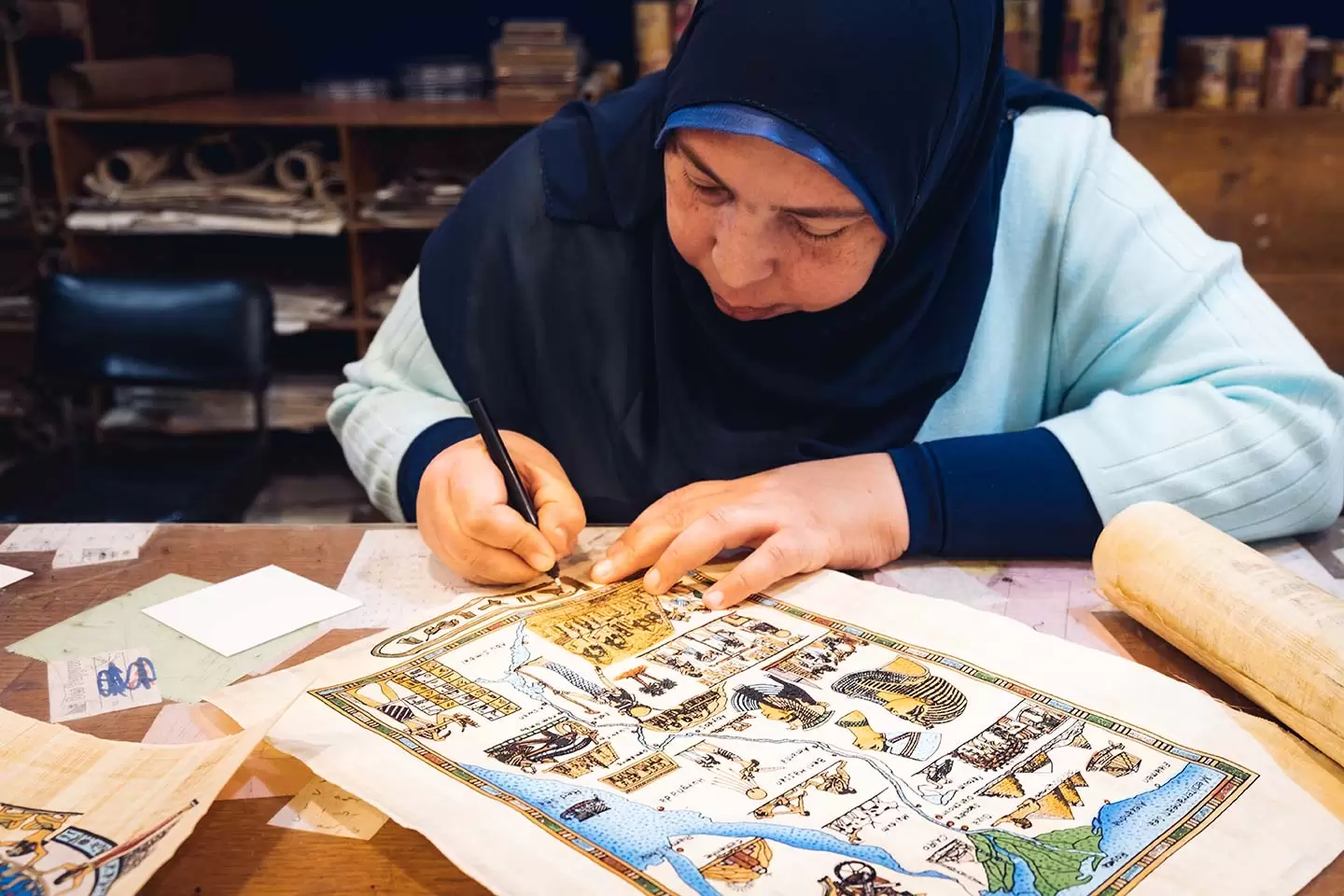
Lady writing my name in hieroglyphics on real papyrus
The Ancient Egyptians were one of the first to master the production of paper, known as papyrus. One of the nicest souvenirs you can get after a trip to Egypt is a papyrus print. But, there is a very common scam take catches out many tourists. Fake papyrus!
In many markets and other street vendors will sell fake papyrus that is actually made from banana leaf, not the papyrus plant. These will be cheaper than the real thing.
So, how do you spot a fake papyrus? Easy! First, notice how these vendors show or display their “papyrus”, it’s stiff, like cardboard and will tear when rolled which is why they’ll never roll it. Real papyrus is strong, flexible and durable and can be rolled up. Second, hold the papyrus up to the light, you should be able to see vertical and horizontal strips that make up the papyrus sheet, within these strips you should see little dark fibres or flecks. This is a good sign!
I hope this guide has helped you feel more prepared for your trip to Egypt. Remember, every country has its quirks. If things were the same as home, you wouldn’t be visiting.
I would go back to Egypt in a heartbeat. Everything I saw blew me away. It’s such an incredible country with a wonderful history. The locals are welcoming and it’s very cheap to travel to.
If you still have any questions or concerns, please reach out and leave a comment below. I’d be happy to help where I can. If not, then I wish you a wonderful trip! Support this blog and book your Egypt tour here.
Shukran for reading! 😉
Take a day trip from Cairo
- Alexandria Day Tour: See the city built by Alexander the Great
- Private Full-Day Tour of Historical Alexandria from Cairo
- Pyramids of Giza, Sakkara & Memphis: Private Tour with Lunch
- Pyramids, Museum & Bazaar Private Tour with Entrance & Lunch
- Cairo: Dinner Cruise on the Nile River with Entertainment
- Cairo: Egyptian Museum 4-Hour Private Tour with Transfer
- Cairo: 1 or 2-Hour Felucca Ride on the Nile with Transfers
- Old Cairo and Khan El Khalili Bazaar: Private Half-Day Tour
- Cairo: Best Kept Secrets Night Tour
- Plus loads more here …
Let me remind you again why Egypt is amazing and watch my Egypt vlog below.
Going to Egypt? Get my free Arabic travel phrase guide.
Like it? Pin it for later
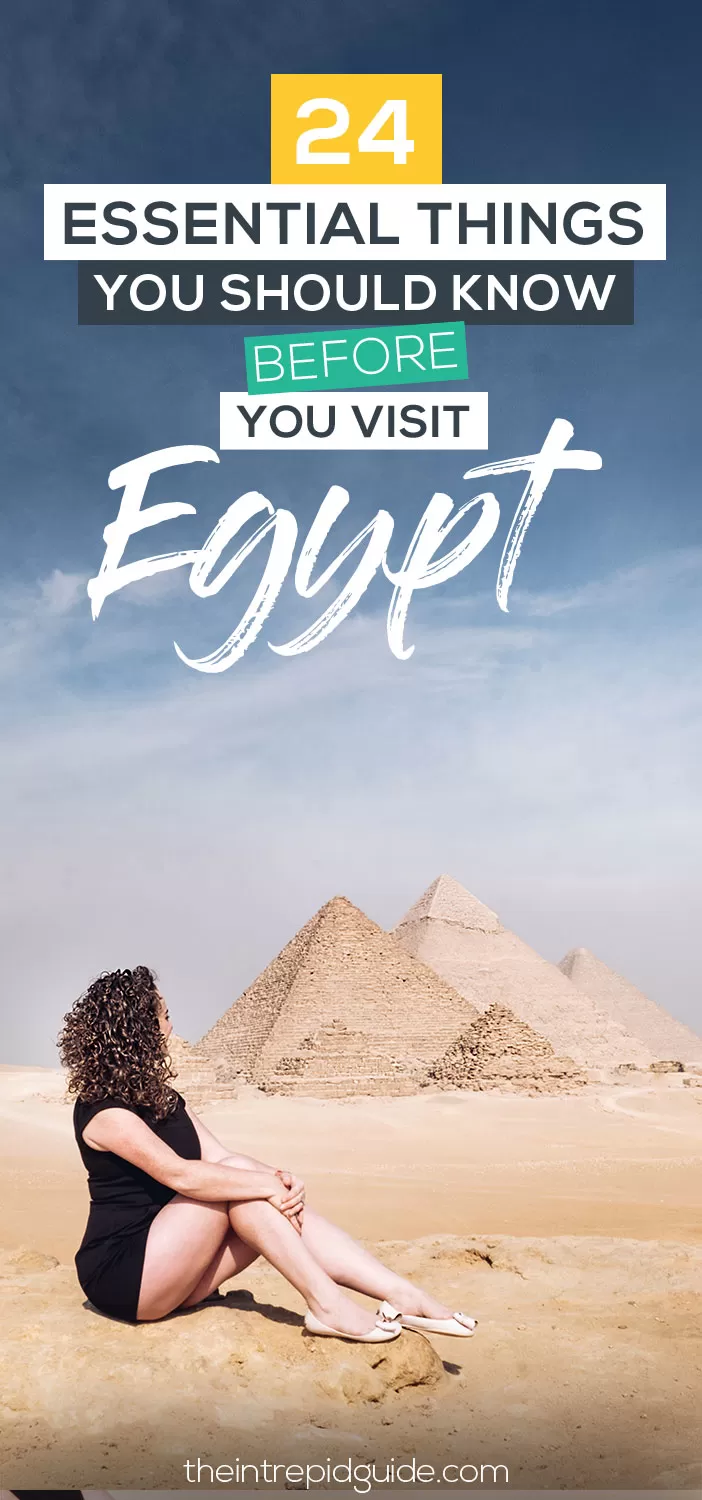
Sources Eyewitness Egypt
Over to you!
Which of these tips did you find the most useful? Is there anything you would add? Tell me below! Let me know using the comments section below or join me on social media to start a conversation.
Thanks for reading and I hope you enjoyed this post.
Like what you see? Subscribe using the form below to have all of my posts delivered directly to your email.
Success! Now check your email to confirm your subscription.
There was an error submitting your subscription. Please try again.
Get my best language and travel tips FREE by email...
Subscribe to my newsletter to receive detailed travel guides, exclusive travel and language learning tips, priority access to giveaways and more!
I will never give away, trade or sell your email address. You can unsubscribe at any time.
Michele creates language learning guides and courses for travel. What separates her from other instructors is her ability to explain complex grammar in a no-nonsense, straightforward manner using her unique 80/20 method. Get her free guide 9 reasons you’re not fluent…YET & how to fix it! Planning a trip? Learn the local language with her 80/20 method for less than the cost of eating at a tourist trap restaurant Start learning today!
Italian Tenses: How to Use ALL 15 Verb Tenses in Italian (+ Verb Tenses Chart PDF 📚)
26 best things to do in verona, italy + where to stay, 17 comments.
Thank you so much for all the information.
Looking forward for a trip to Egypt !!
My pleasure! Have a wonderful trip 🙂
Hi Michele, a lovely and useful article to read! Just wanted to check with you about passport safety: was it with you at all times, or you left it in your hotel room? Also – when entering Egypt have you been questioned about what, if any medication you had with you – as some over the counter meds in Europe or US can be problematic to bring into Egypt? Thank you!
Hi Jo, thank you so much and thank you for your questions. Yes, I always carried my passport on me. In fact, I do this wherever I travel. I would also ensure you have a photocopy in your luggage and a copy saved on your phone or on the cloud as an extra safety measure. When it comes to medication, I would email the airport directly for any questions you have. I was worried when flying from London to NY after I had heard that you can’t take a certain quantity of protein powder in your luggage. I emailed US customs and they said it was ok. I also kept a copy of that email on me and on my phone and was ready to show the customs officers on arrival if I had any issues. This is good practice as the problem with customs is that it’s sometimes open to interpretation and depends on how the officers feel on the day. I hope this helps 🙂 Have a wonderful trip!
Where do you recommend converting US $$ to LE and what volume of notes should I get to handle all the tipping. If at airport, is this best done before the border/customs or after? Thanks!
Hi David, before arriving, I ordered some USD so I would have enough to pay for my visa on arrival and have some money for incidentals. I had heard that they accept both USD and Egyptian Pounds at the airport. The tour company I travelled with had a guide on the ground who helped me through this process and I knew I need 100USD to pay for the visa. The rest of the time I used Egyptian Pounds. There is no tipping culture like the USA, so you can tip if you like but it’s not always necessary.
Hi David, before arriving, I ordered some USD so I would have enough to pay for my visa on arrival and have some money for incidentals. I had heard that they accept both USD and Egyptian Pounds at the airport. The tour company I travelled with had a guide on the ground who helped me through this process and I knew I need 100USD to pay for the visa. The rest of the time I used Egyptian Pounds. There is no tipping culture like the USA, so you can tip if you like but it’s not always necessary.
Hi, I have read and re-read this several times. Thank you. I’m going with a friend to Egypt early March and want to go on organised trips but I’m disabled and can only walk very slowly. In other countries I’ve just let the group go ahead and done my own thing then joined back at the coach. Is this a good idea in Egypt or can I hire an electric mobility scooter while there.
Hi Gabrielle, I’m not 100% sure how this works and it will vary depending on the accessibility of the group tour company. I would reach out to them directly for advice before booking. Best of luck and I hope it works out 🙂
Hello, thank you for your honesty. I enjoyed reading all of your tips. I am considering going in February from the 19th to the 24th. Do you think this is enough time to see everything you saw?
Hi Caroline, I went on a Top Deck tour, this is the best way to ensure you that we see everything and safely too. I highly recommend it. You can see the tour I did here http://bit.ly/EgyptExpressTour
Great info! Where did you take your photos??? THEY. ARE. FABULOUS.
Thank you SO much, Naomi. I took them during my Top Deck tour around Egypt . I highly recommend it! 🙂
This has been helpful and has eased my mind about travelling to Egypt. Going in a tour group, can’t wait ! 😀
I’m so happy to hear that. You’re very welcome, Jacinda 🙂
Thank you so much for such a wonderful article, I can’t wait to land egypt.
Thank you so much, Priya 🙂
Leave a Comment Cancel Reply
Save my name, email, and website in this browser for the next time I comment.
This site uses Akismet to reduce spam. Learn how your comment data is processed .

If you don't know where you are , how do you know where you're going? Find out how well you know Italian grammar today!

The Ultimate Guide to Egypt: Dos and Don’ts Every Traveler Must Know!
W aving hello from the land of the Pharaohs , it's Kevin Erickson , your trusty travel companion. Ever dreamed of marveling at the Sphinx , floating on the Nile , or relishing in the historic hustle and bustle of Cairo's streets? Ah, Egypt, a majestic place! But, wait – do you know the etiquettes and local customs? Dive in as I unravel the treasures of Egypt and help you navigate potential pitfalls. 🌍
- Dress modestly and respect religious practices
- Greet, haggle, and tip like an Egyptian pro
- Stay hydrated, savor local delicacies, but know where to draw the line
- Relish history but respect boundaries
- Dive deep into the culture but keep American sensibilities in mind
Why Egypt Should Be on Every Traveler's Bucket List
According to the World Tourism Organization, Egypt welcomed a staggering more than 11.3 million tourists in 2018. A beacon of history, culture, and cuisine, Egypt promises a travel experience like no other.
Cultural Nuances: Navigating Egypt's Rich Tapestry
1. dress to respect.
Egypt's culture is an intriguing mix of modern and traditional elements. In religious and rural areas, dressing modestly is the key.
Women, consider long skirts or pants and tops with sleeves, while men might ditch the shorts.
Remember, dressing appropriately is not just about blending in, it's about showing respect!
2. Communicate Like a Local
Starting with a warm " As-salamu alaykum" can break many barriers. It’s an essential phrase that means "Peace be upon you".
Plus, trust me; locals appreciate it when you put in the effort.
3. Fun with Finances: Haggle and Tip!
Haggling isn't just a transaction; it's an art form in Egypt .
Dive into the vibrant bazaars, start with half the price, and let the dance begin! And when it comes to tipping, small gestures can bring big smiles.
4. Food, Drinks, and the Egyptian Way
Egypt offers a culinary journey that your tastebuds will cherish.
From falafels to koshary, there's a world to explore. And here’s a zinger for my American friends: while Egypt is a Muslim-majority country, alcohol is indeed legal and available in many restaurants, hotels, and bars.
However, remember: public drunkenness isn't just frowned upon—it can land you in hot water!
5. Dive Deep into the History, but Respect the Boundaries
Egypt is, as Anthony Bourdain rightly said,
" a unique fusion of civilizations, cultures, and religions. Traveling here is like walking through layers of history."
But remember, while the Pyramids might tempt you, climbing them is a big no-no. Let's keep history preserved!
From a Traveler's Eye: Kevin's Secret Tips
- The Nile - More Than Just a River - The Nile isn't just about those mesmerizing boat rides. Avoid swimming, especially near urban areas, due to pollution.
- Not Everyone's After Your Bucks - Sure, there are hustlers, but many Egyptians are genuinely warm. Embrace the culture, make friends, and you'll discover the true heart of the country.
- Step Outside the Tourist Spots - Discover Egypt's hidden gems. Beyond the Pyramids and Sphinx, there’s a whole world awaiting.
Embracing the Egyptian Adventure: A Final Word
The magic of Egypt is something that has enticed travelers for generations. Whether it's the mysterious allure of the Pyramids, the sprawling beauty of the Nile , or the vibrant tapestries of the bazaars, every corner of Egypt is a testament to its rich heritage and captivating culture. But beyond the visual spectacle, the soul of Egypt lies in its people – warm, welcoming, and eager to share their stories.
Traveling here is not just about checking off sites from a bucket list; it's about immersing oneself in a timeless narrative that has shaped much of the world's history. It's about understanding the delicate balance of tradition and modernity that Egyptians navigate daily. By respecting local customs and approaching each experience with an open heart, travelers can forge connections that transcend mere tourism.
Kevin Erickson' s insights and tips are crafted from a place of deep respect and admiration for this land. While the dos and don'ts serve as a practical guide, they also underscore a more profound message: Travel with empathy. Every "do" is an invitation to embrace and every "don't" a nudge to respect boundaries.
In conclusion, as you set out to experience Egypt, remember that it's a journey both external and internal. The monuments will leave you awestruck, the cuisine satisfied, but it's the memories made and the friendships forged that will truly stand the test of time.
So here's to Egypt – an eternal story waiting for your chapter. Safe travels!
What currency should I carry in Egypt?
Egypt uses the Egyptian Pound (EGP). While major cities and tourist areas accept credit cards, it's wise to carry some local currency for smaller vendors, tipping, and haggling in bazaars.
Do I need any vaccinations before traveling to Egypt?
It's recommended to consult with your healthcare provider before your trip. Common vaccines suggested for Egypt include Hepatitis A, Typhoid, and Yellow Fever, especially if you're planning to visit rural areas.
Is English spoken widely in Egypt?
While Arabic is the official language, English is widely understood and spoken, especially in tourist areas, major cities, and by younger generations. However, it's always appreciated if you learn a few basic Arabic phrases.
Are there specific cultural or religious festivals I should be aware of?
Yes, Egypt has several religious and cultural festivals, the most notable being Ramadan, a month of fasting. During this time, many shops and restaurants may have altered hours. Eid Al-Fitr and Eid Al-Adha are also significant festivals with grand celebrations.
Is vegetarian or vegan food easily available?
Yes, Egyptian cuisine offers a variety of vegetarian and even vegan-friendly dishes. Staples like falafel, koshary, and molokhia are both delicious and vegetarian-friendly.
How do I get around within the country?
Egypt boasts a range of transportation options from trains, buses, and domestic flights to more local means like tuk-tuks and horse-drawn carriages. For major attractions like the Pyramids, it's often convenient to hire a taxi for the day or join a guided tour.
Is the tap water safe to drink?
It's advisable to stick to bottled water in Egypt, both for drinking and brushing your teeth, to avoid any potential stomach upsets. Always ensure the bottle seal is intact when purchasing.
- World Tourism Organization
- Egyptian Tourism Board
- "Parts Unknown" by Anthony Bourdain
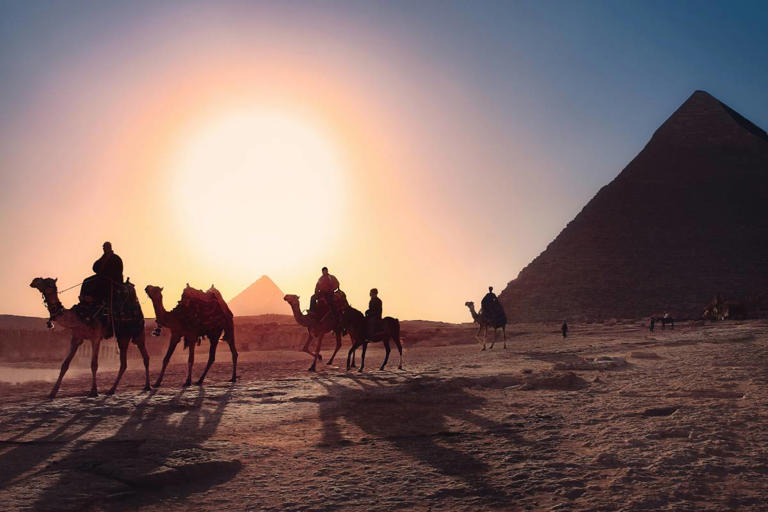
15 best experiences in Egypt for history, adventure and culture

Aug 16, 2023 • 9 min read
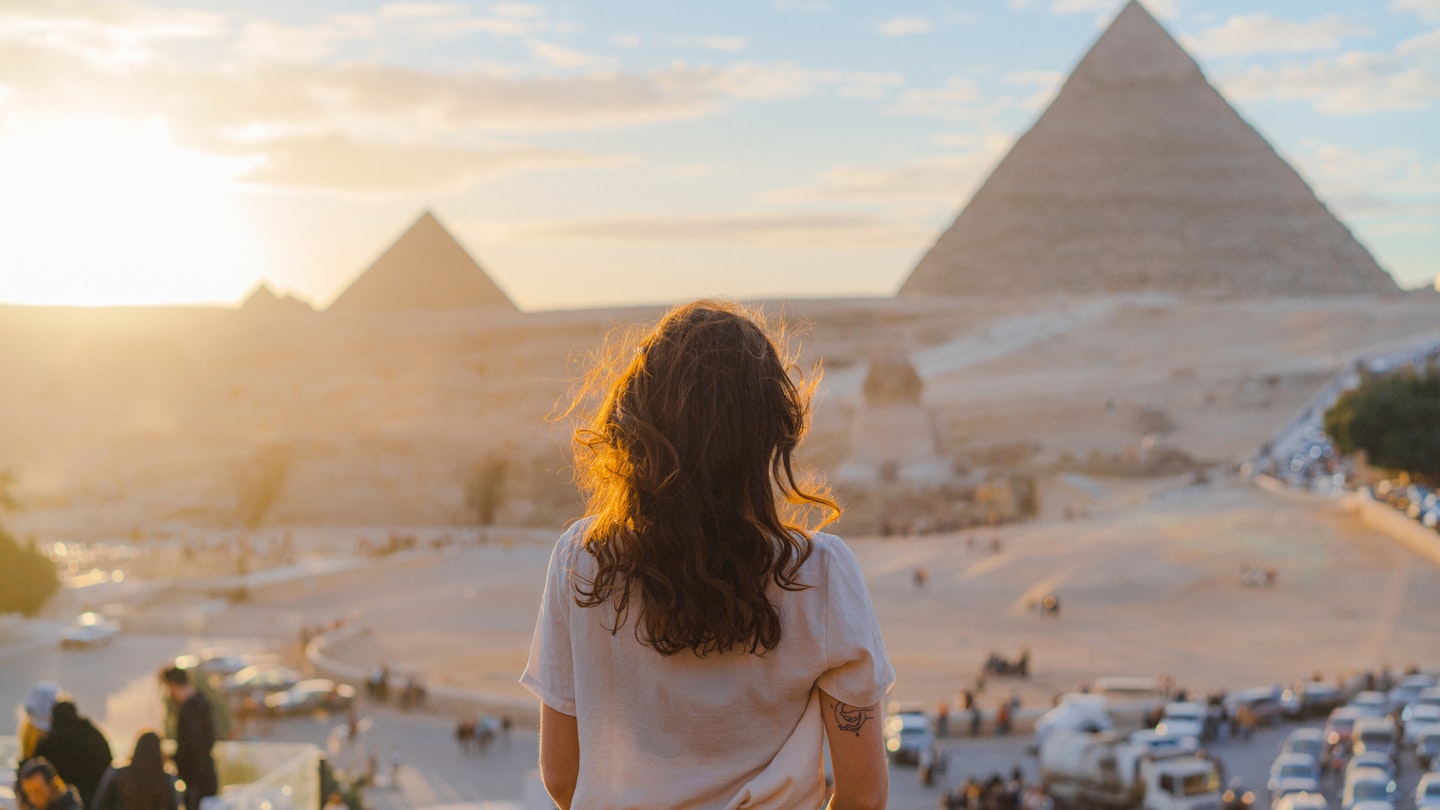
From food tours in Cairo to floating in a desert oasis in Siwa, here are the best things to do in Egypt © Oleh_Slobodeniuk / Getty Images
One day you’re climbing the desert’s highest peak, the next you’re walking amid remnants of the world’s oldest civilization or diving into the depths of the Red Sea. Whether Egypt 's on your travel radar for the history, the adventure, the beaches or even just the pyramids, when it comes to things to do, you are spoiled for choice.
Here's our guide to Egypt's very best experiences.
1. Have breakfast at the pyramids
8. Why not kick your visit to the pyramids up a notch with some falafel, hot mint tea and a vast picture-perfect panoramic view of the ancient wonder? Head to the 9 Pyramids Lounge for influencer-worthy photo ops and a solid Egyptian breakfast of freshly baked bread, feta cheese or a Tahini salad.
2. Watch an authentic Tanoura performance in Cairo
Old Cairo is also home to the beautifully restored Wekalet el Ghouri Arts Center that hosts a wide array of cultural events. Here you can see an unforgettable Tanoura show – a whirling dervish performance that merges Egyptian folklore and Sufi spiritual chants. This colorful and mesmerizing one-hour experience is a must-see for anyone visiting Cairo.
Planning tip: The show runs every Monday, Wednesday and Saturday at 7pm, but make sure to show up at 6pm to snag your tickets before they’re gone.
3. Experience Egyptian street food at Cairo's Kebdet El Prince
Situated in the heart of Cairo’s Imbaba neighborhood is Kebdet El Prince, a haven of Egyptian street food with a side of quintessentially Cairene sensory overload. This bustling joint is ideal for anyone looking to experience Egyptian street food.
Start with the basics: molokhia (jute mallow), kebda (liver), and sogo’ (sausage). More adventurous foodies should try mombar (stuffed sausage), makhasi (bull tesitcles) and shorbet kaware’ (cow’s foot soup).
Detour: If you can still breathe, have dessert next door at El-Malky and top it off with a mint tea from the cafe across the street.
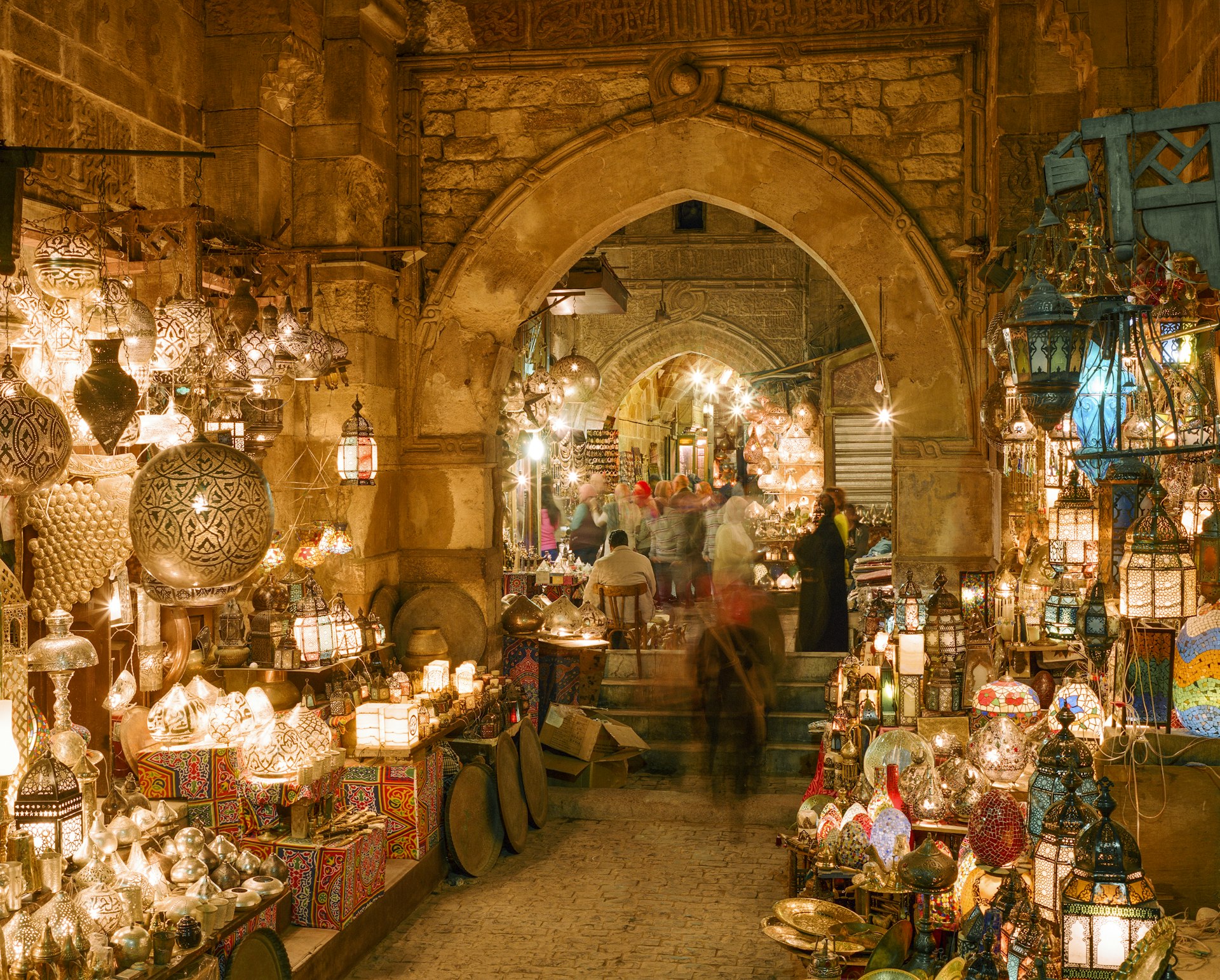
4. Wander through the alleys of Old Cairo
The ancient streets of Old Cairo are mazes of narrow alleys filled with monuments, mansions, museums, and mosques. Start at El Moez Street and soak in how the rich architectural, religious and cultural history fuses with the vibrant din of daily local life in this bustling neighborhood.
Walk until you reach the Khan El-Khalili bazaar where you can shop for everything from soap powder to ornate clothing and small trinkets. Then head to Bab Zuweila – one of three remaining gates from the Old City of Cairo.
Planning tip: Time your arrival to watch the sun setting over the ancient buildings from the towering minarets of Bab Zuweila – one of the best views you’ll find in the city.
5. Camp in the Fayoum Desert
Disconnect from the mayhem of modern life with desert camping in Fayoum . Experience the dunes on a 4WD safari ride with stops at the Wadi el Rayan waterfalls and the crystal blue lakes in the middle of the desert, and top it off with a freshly prepared Bedouin dinner under the stars. Wear comfortable walking shoes and bring a light jacket if your trip is in the summer; for winter, pack your whole closet – the desert gets cold at night. Fayoum is just two hours south of the capital, so this trip can easily be done as a weekend getaway from Cairo.
Planning tip: For an optimal night of clear stargazing without light pollution, time your visit to Wadi el Rayan or Wadi al Hittan (Valley of the Whales) for when there’s no moon.
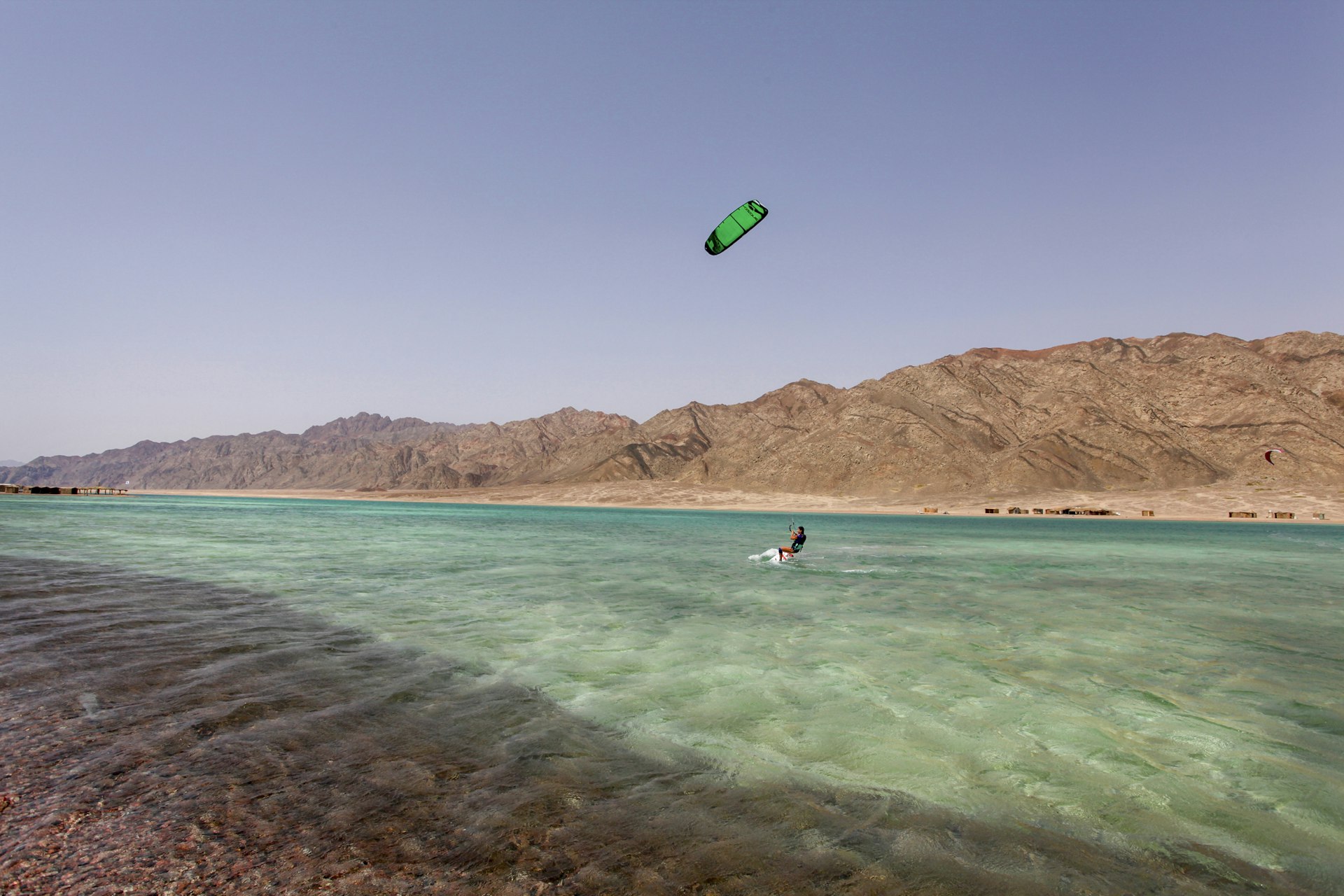
6. Go kitesurfing at the Blue Lagoon
Time stands still at the turquoise Blue Lagoon. Located between the shadows of the Sinai Mountains and the crystal waters of the Red Sea, the Blue Lagoon has flat waters and strong winds, making this Red Sea sweet spot a kitesurfer’s paradise.
Novices can book a private kitesurfing course upon arrival. If you’re not into kitesurfing, the Blue Lagoon is a perfect spot to do absolutely nothing by laying on the beach, enjoying the sea and serenity.
7. Float in Siwa’s picturesque Salt Lakes
Picture this: floating in a perfect pool of crystal blue waters in the middle of the desert, surrounded by shimmering towers of sea salt. The Siwa’s salt lakes have long been a treasured local spot. Float effortlessly in an otherworldly pool with the highest water to salt ratios that’s not just picture-perfect, but it's said to clear sinuses and treat infections.
Siwa Oasis is dotted with hundreds of turquoise salt pools – a stark contrast against the oasis’ palm greens and desert yellows, all laid against the backdrop of stunning sunsets that earned it the title of Sunset Oasis.
Local tip: Keep a few bottles of clean water with you to wash the layers of salt off your body and avoid any skin irritation. Or, even better, go for a dip in Cleopatra’s Spring afterward.
8. Snorkel or dive in the Red Sea's Sataya Reef
Marsa Alam is great base for divers looking to discover the riches of the Red Sea. Horseshoe-shaped Sataya Reef ranks as one of the most beautiful dive spots on the planet, with its striking sea life and colorful corals. This wonder of the natural world is suitable for snorkelers too.
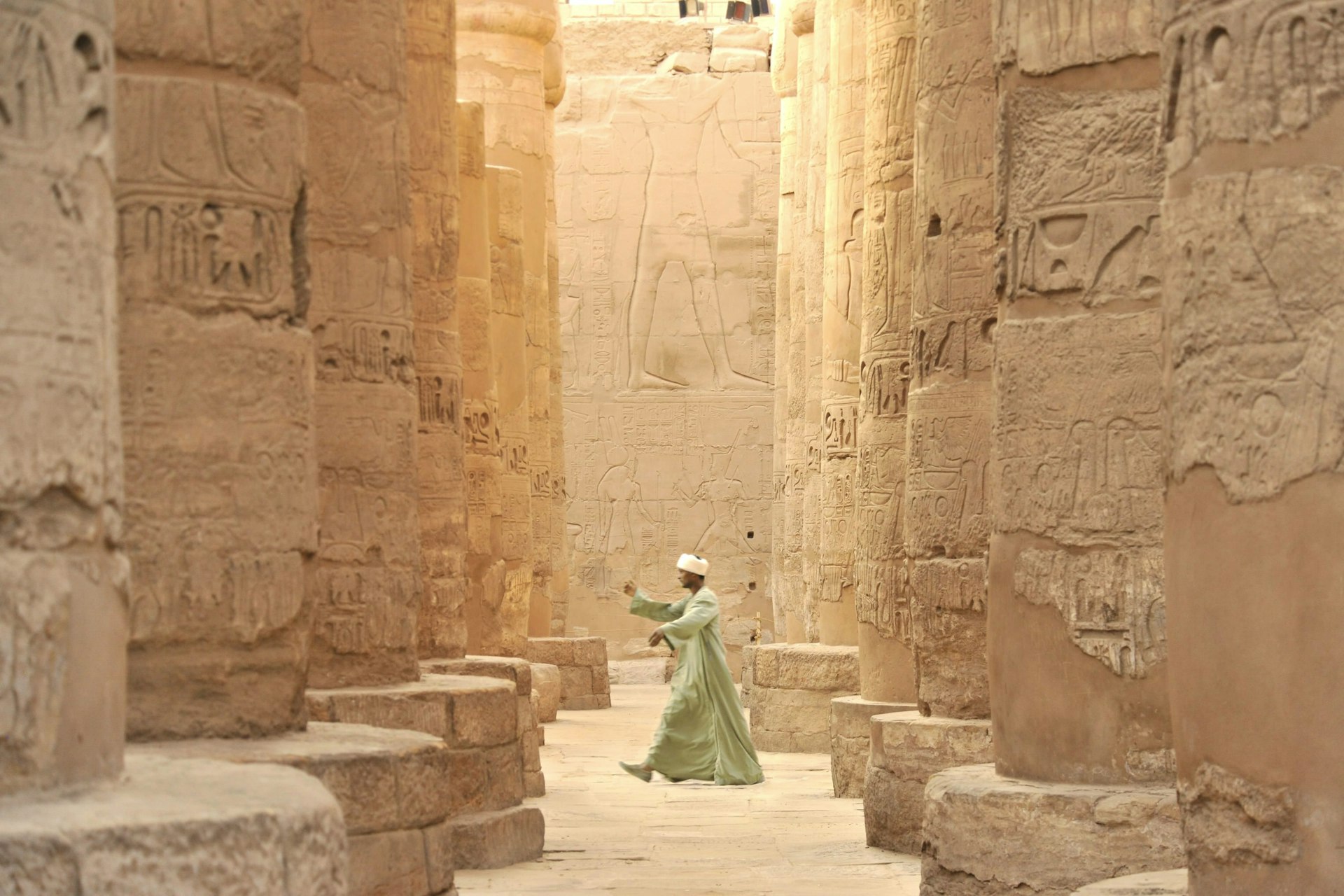
9. Temple hop in Luxor
Luxor , the world’s greatest open-air museum, is a testament to the ancient Egyptian civilization through its sheer wealth of temples and monuments.
Begin your temple-hopping at the Temple of Karnak – the perfect manifestation of pharaonic ambition. A few kilometers southwest of Karnak is the stunning Luxor Temple . If you can, visit at night when the temple lights are turned on. About 40 minutes northwest of the Luxor Temple lies The Valley of the Kings – a popular tourist destination and includes the tombs of Ramses III , Seti I and Ay .
At the southern portion of the Theban hillside and about 7km (4mi) from the Valley of the Kings is The Valley of the Queens . A 75-tomb area that includes the final resting places of Nefertari and one of the five wives of Ramses II.
Detour: Other major points along the way include: Queen Hatshepsut’s Temple, the Luxor Museum and Ramses III’s Medinat Habu on the West Bank.
10. Eat like an Egyptian with a local food tour in Cairo
Food is an international love language and Cairo is bursting with culinary gems, but where do you start? What do you try? Where do you go? Connect with local culture on a food tour where you immerse yourself in Egypt’s history and local life, one authentic dish at a time.
Ideal for solo female travelers, Bellies En-Route is a female-owned food tour provider that skips the culinary tourist hot spots and takes visitors to local mom-and-pop spots or neighborhood favorites known for fantastic street fare. You can even help out in the kitchen at some of the restaurants, an excellent opportunity to connect with the community while preparing food.
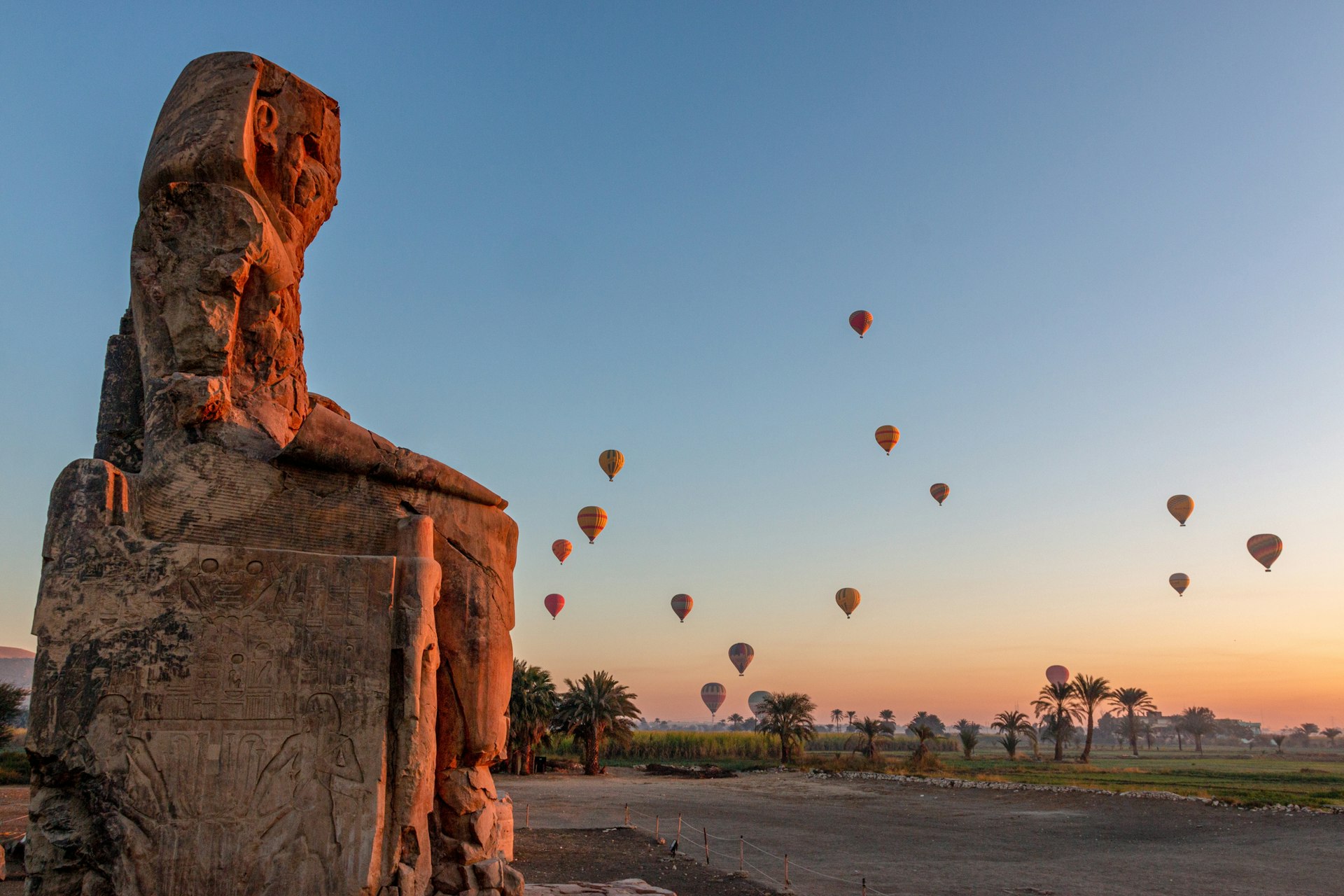
11. Float above Luxor in a hot-air balloon
Dozens of balloons take to Luxor’s skies every day at dawn for a view that’s literally breathtaking. Watch the sun rise and light up the Theban hills, local farms and ancient monuments. See the Nile River glistening in the distance and wave at locals watching from their balconies. Trust us, it’s definitely worth that 3am wake-up call and pre-ride anxiety.
12. Take a sunset felucca ride along the Nile
The world’s longest river is best experienced floating peacefully in a felucca (traditional wooden sailboat) at sunrise or sunset, whether you’re in Cairo or Aswan or anywhere in between.
In Cairo, docks line the corniche in Maadi, Zamalek and Garden City, and give you a gorgeous view of the Cairene skyline; if you’re in Aswan, feluccas are your go-to mode of transportation between the city’s 20 islands. Either way, grab a few friends, snacks, and drinks and spend some time taking in the stunning serenity of the Nile.
13. Hike the Sinai Trail or Red Sea Mountain Trail
Experience Egypt’s most iconic mountain peaks and untrodden wildernesses by hiking alongside local Bedouin guides through the country’s two sister trails: the Sinai Trail and the Red Sea Mountain Trail.
The Sinai Trail is Egypt’s first long-distance hiking trail, a circuit that runs 550km (342 miles) through the territories of the eight Bedouin tribes of South Sinai. The 170km (106 mile) Red Sea Mountain Trail , located just outside the beachside resort town of Hurghada , showcases the best of the region’s inimitable beauty – from vast desert plains to deep gorges, and from crumbling Roman towns to prehistoric rock art and chapels of Egypt’s Desert Fathers.
Local tip: Both trails are sustainable tourism initiatives that directly support the local Bedouin communities by creating jobs and help keep the region’s traditional Bedouin knowledge, skills, and heritage alive. And don’t worry, the trails are divided into segments so you can choose whether to take between two- and five-day hikes as part of your trip.

14. Dive and snorkel near Dahab
Dahab , South Sinai’s token beach town, is ideal for divers and snorkelers to experience mind-blowing marine life. If you're not already a qualified diver, you can start your PADI certification process at one of Dahab’s many dive centers.
A few kilometers north of Dahab is Egypt’s Blue Hole , a submarine sinkhole that drops straight down to a depth of over 100m (328ft), and attracts experienced divers from all over the world. It’s a fascinating but risky dive that’s unfortunately claimed many lives, and it should be left to pro and advanced divers only.
15. Relax with the view from Castle Zaman
Come for the view, stay for – well, the view. This medieval-style castle that’s actually a slow-food restaurant, is nestled between Sinai’s signature mountains and lies somewhere between Nuweiba and Taba by the Gulf of Aqaba – an unparalleled vantage point across the Red Sea that spans the shores and mountains of Egypt, Jordan , Israel , and Saudi Arabia .
Spend a full day at Castle Zaman chilling in the pool, having a drink at the bar, and enjoying a slow-cooked lunch or dinner that includes items like a meat tagine or the catch of the day. Although Castle Zaman doesn’t offer overnight accommodation, you can make use of its amenities such as the sauna and massage treatments.
Planning tip: And for an overnight stay, head to Dayra Camp , a collection of wildly decorated straw huts and wooden bungalows located in the coastal town of Nuweiba – just 23km (14mi) away.
This article was first published Jan 7, 2022 and updated Aug 16, 2023.
Explore related stories
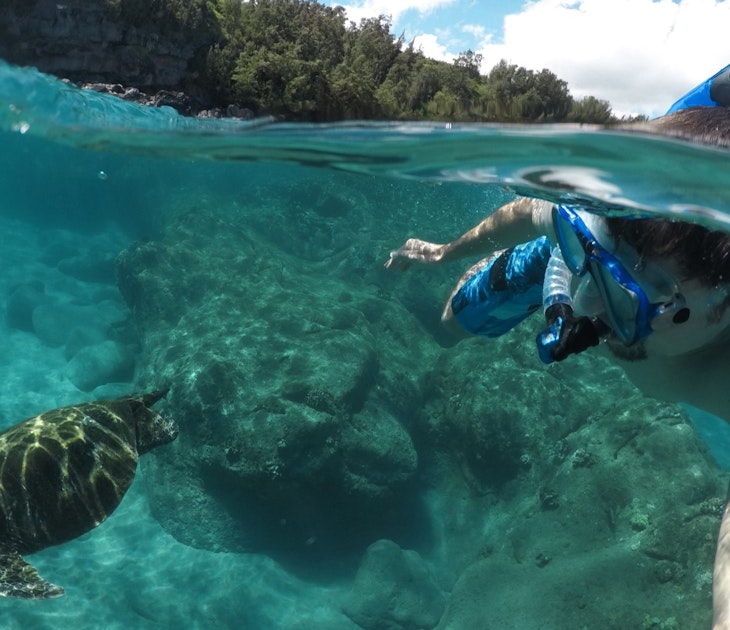
Water Sports
Mar 4, 2024 • 8 min read
From swimming in protected waters frequented by whale sharks to spotting colorful fish over a reef, here are the world's best places to snorkel.

Feb 27, 2024 • 6 min read
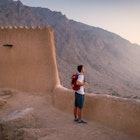
Feb 13, 2024 • 5 min read
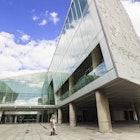
Jan 26, 2024 • 6 min read
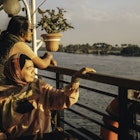
Jan 13, 2024 • 7 min read
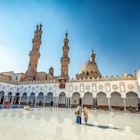
Dec 9, 2023 • 6 min read

Dec 3, 2023 • 6 min read
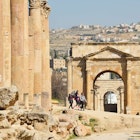
Dec 2, 2023 • 6 min read

Nov 15, 2023 • 5 min read

Oct 16, 2023 • 4 min read
- Mobile Apps
- Stream on discovery+
- Program Guide
- Ghost Adventures
- Ghost Hunters
- Ghost Brothers
- Conjuring Kesha
- The Dead Files
- Destination Fear
- Eli Roth Presents: A Ghost Ruined My Life
- Expedition Bigfoot
- Ghost Nation
- The Holzer Files
- Kindred Spirits
- Mountain Monsters
- Paranormal Caught on Camera
- Portals to Hell
- Amy Bruni and Adam Berry
- Destination Fear Team
- Don Wildman
- Ghost Adventures Crew
- The Holzer Files Team
- Jack Osbourne and Katrina Weidman
- Steve Dischiavi
- Watch Live TV
- Tips for Solo Travelers
- 4 Gorgeous Waterfalls
- 5 Extreme Swings
- World's 10 Best Swimming Holes
- Best BBQ in America
- Tilt! at 360 Chicago
Digital Exclusives
- Big City, Little Budget: New York
- Big City, Little Budget: San Francisco
- Bizarre Foods in the Kitchen
- One Bag and You're Out
From Our Shows
- Bizarre Foods
- Bizarre Foods: Delicious Destinations
- Booze Traveler
- Expedition Unknown
- Hotel Impossible
Mysteries at the Museum
Top domestic.
- New Orleans
- New York City
- Washington, DC
Top International
- Myrtle Beach
- Niagara Falls
- San Antonio
Explore By Region
- Asia Pacific
- Middle East & Africa
- North America
- South & Central America
Top Interests
- Amusement Parks
- Arts and Culture
- Food and Wine
- National Parks
- Health and Wellness
- Long Weekends
- Outdoor Adventure
By Traveler
- Family Travel
- Girls' Getaways
- LGBT Travel
- Solo Travel
Travel Tips
- Budget Tips
- Gear and Gadgets
- Hotels and Lodging
- Plan Your Bucket List
- Savvy Traveler
- Travel's Best
- Destinations
- Middle East and Africa
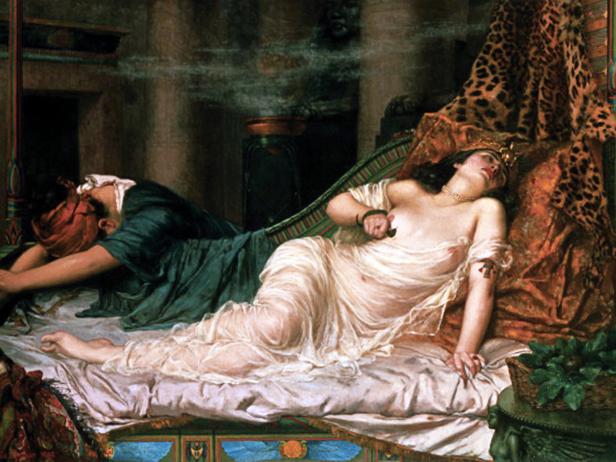
What We Know About Cleopatra
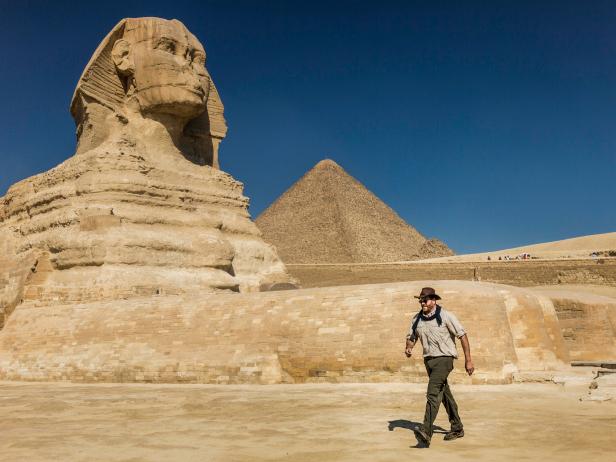
‘Expedition Unknown’ Shines a Light on Egypt’s Iconic Female Rulers
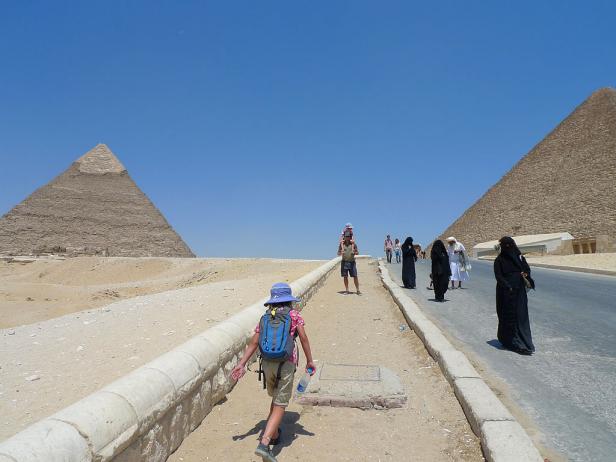
An Egypt Education
Get inspired.

Egypt's Hatshepsut 00:53
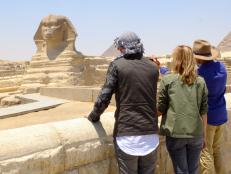
Giza's 'Stairway to Heaven' 01:51

Man Falls During Camel Fight 00:37
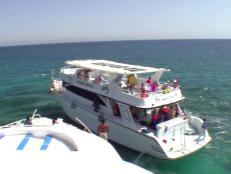
Chicken of the Sea 02:38

Egypt's People and Cuisine 01:17

Luxor: History Is All Around 03:50
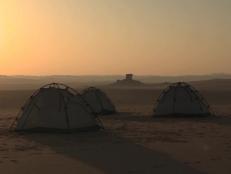
Egypt's Infinite Variety 03:40
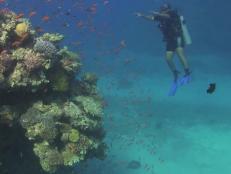
Wonders Under the Red Sea 03:57
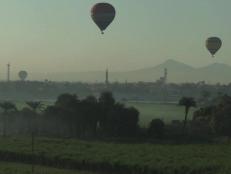
The Three Faces of Luxor 03:27

Egyptian Comfort Food 01:25

Seven Wonders of Egypt 7 Photos
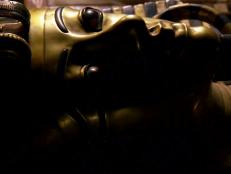
King Tut's Tomb 02:12
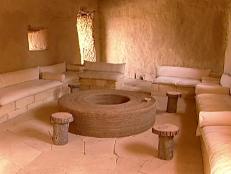
Adrere Amellal 02:42
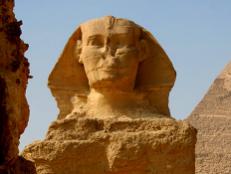
Seven Wonders of Egypt

New Shows on Travel Channel to Watch in February

Shane O's Cairo Top Three 03:45
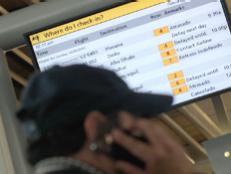
Stranded Again
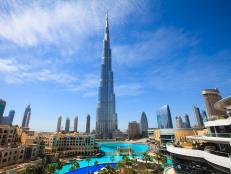
World's Top Architecture Cities 13 Photos
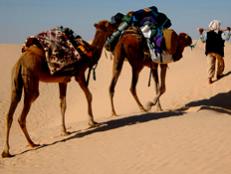
Desert Adventures
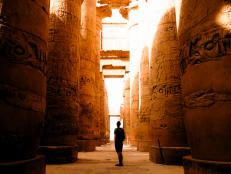
Daily Escape
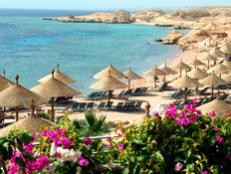
North African Beaches

10 Terrifying, Secret Spots Around the World 11 Photos
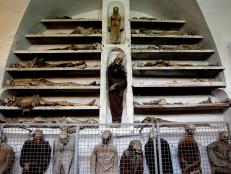
Creepy Crypts and Catacombs Worldwide 12 Photos
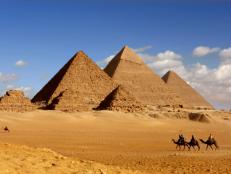
Seven Wonders of the World
Travel channel visits egypt.
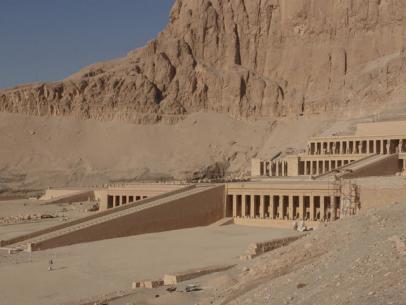
Egypt's Hatshepsut

Giza's 'Stairway to Heaven'
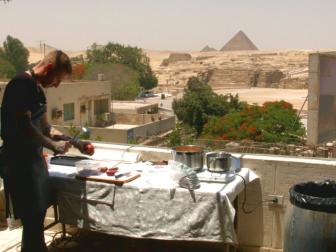
Egypt's People and Cuisine
Trending now.

7 New Virtual Reality Theme Park Experiences You've Got to See to Believe 7 Photos
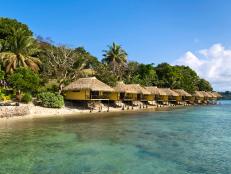
Melanesia, an Island Paradise 8 Photos

Living in the Moment on the Island of Kauai 5 Photos


10 Things to Know About New Mexican Cuisine 11 Photos

Top 5 National Park Family Programs 5 Photos

Iconic NFL Stadiums 12 Photos
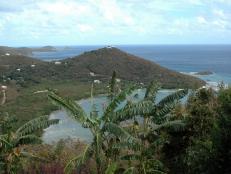
Top Spot: US Virgin Islands 15 Photos
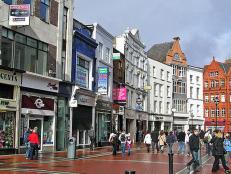
Things to Do in Dublin 12 Photos
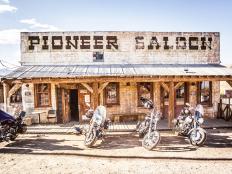
10 Bars Where You Can Drink Up American History 10 Photos

22 Really Cool Things to do in South Dakota (Besides Mount Rushmore) 22 Photos
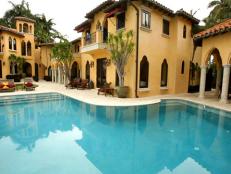
Killer Beach Houses 13 Photos

Bizarre Foods America: Virginia: Cicadas & Cownose 12 Photos
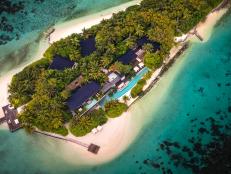
Is This the World's Most Exclusive, Luxurious Getaway? 9 Photos
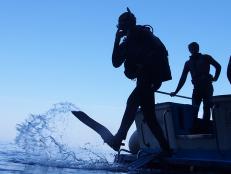
Your Best Summer Photos 26 Photos
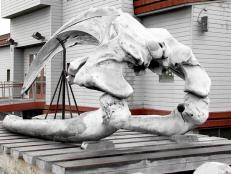
Mysteries: Whale Rescue Pictures 10 Photos

CityEats’ Picks: Winter Cocktails 10 Photos
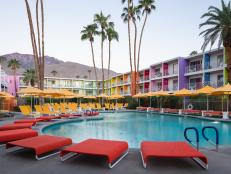
10 Unexpected Bachelorette Party Destinations 10 Photos

Unforgettable Travel Moments of 2011 11 Photos

Weekend Trips for the Bourbon Lover 10 Photos
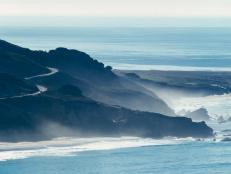
10 Road Trips You Can Take Over a Weekend 10 Photos
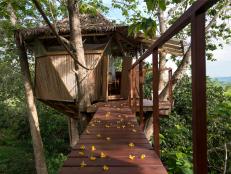
The Most Popular Airbnb Properties Around the World 23 Photos

In the Doghouse Pictures 12 Photos
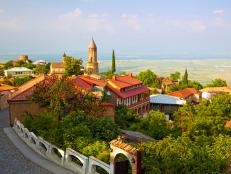
10 Hidden Wine Regions Around the World 10 Photos
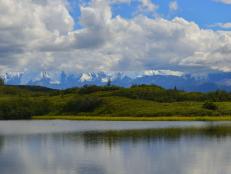
Explore Interior Alaska on the Alaskan Highway 20 Photos

The Last Resort 16 Photos
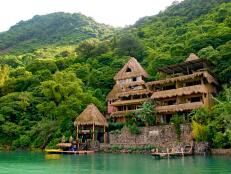
Eco-Friendly Resorts 14 Photos
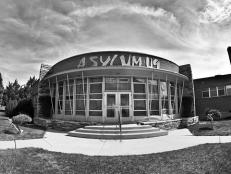
Tooele Hospital 12 Photos
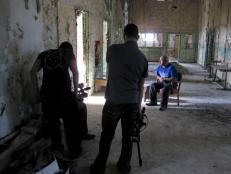
Ohio Reformatory 7 Photos
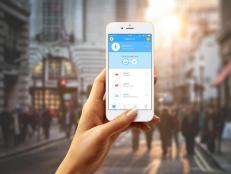
These Apps Will Help You Learn Another Language 11 Photos
Follow us everywhere.
Join the party! Don't miss Travel Channel in your favorite social media feeds.
More From Travel
- Sweepstakes
- Stream Travel Channel
- Ways to Watch Travel Channel

- Privacy Policy
- Visitor Agreement
- Online Closed Captioning
- Accessibility
- Discovery, Inc.
- Do Not Sell or Share My Personal Information
- Food Network
- Travel Channel
- Cooking Channel
- Discovery.com
- © 2024 Warner Bros. Discovery, Inc. or its subsidiaries and affiliates. All rights reserved.
Update April 12, 2024
Information for u.s. citizens in the middle east.
- Travel Advisories |
- Contact Us |
- MyTravelGov |
Find U.S. Embassies & Consulates
Travel.state.gov, congressional liaison, special issuance agency, u.s. passports, international travel, intercountry adoption, international parental child abduction, records and authentications, popular links, travel advisories, mytravelgov, stay connected, legal resources, legal information, info for u.s. law enforcement, replace or certify documents.
Before You Go
Learn About Your Destination
While Abroad
Emergencies
Share this page:
Travel Advisory July 13, 2023
Egypt - level 3: reconsider travel.
Reissued with obsolete COVID-19 page links removed.
Reconsider travel to Egypt due to terrorism . Exercise increased caution in Egypt due to the Embassy’s limited ability to assist dual national U.S.-Egyptian citizens who are arrested or detained.
Do not travel to:
- The Sinai Peninsula (with the exception of travel to Sharm El-Sheikh by air) due to terrorism .
- The Western Desert due to terrorism .
- Egyptian border areas due to military zones .
Country Summary: Terrorist groups continue plotting attacks in Egypt. Terrorists may attack with little or no warning, and have targeted diplomatic facilities, tourist locations, transportation hubs, markets/shopping malls, western businesses, restaurants, resorts, and local government facilities. Terrorists have conducted attacks in urban areas, including in Cairo, despite the heavy security presence. Terrorists have targeted religious sites, to include mosques, churches, monasteries, and buses traveling to these locations.
Due to risks to civil aviation operating within or in the vicinity of Egypt, the Federal Aviation Administration (FAA) has issued a Notice to Air Missions (NOTAM) and/or a Special Federal Aviation Regulation (SFAR). For more information U.S. citizens should consult the Federal Aviation Administration’s Prohibitions, Restrictions and Notices .
Local law prohibits protesting or demonstrating without a permit. Being near anti-government protests can draw scrutiny from Egyptian police and security forces. U.S. citizens have been detained for participating in protests and for posting content on social media perceived as critical of Egypt or its allies.
The U.S. Embassy may have a limited ability to provide consular services to dual U.S.-Egyptian citizens. Egyptian law considers dual citizens to be Egyptian citizens.
Read the country information page for additional information on travel to Egypt.
If you decide to travel to Egypt:
- Stay alert in locations frequented by Westerners.
- Avoid demonstrations and crowds.
- Obtain comprehensive medical insurance that includes medical evacuation.
- Enroll in the Smart Traveler Enrollment Program (STEP) to receive Alerts and make it easier to locate you in an emergency.
- Follow the Department of State on Facebook and Twitter .
- Review the Country Security Report for Egypt.
- Visit the CDC page for the latest Travel Health Information related to your travel.
- Prepare a contingency plan for emergency situations. Review the Traveler’s Checklist .
Sinai Peninsula – Level 4: Do Not Travel The Sinai Peninsula remains a particularly dangerous area, with frequent attacks on security forces and civilians.
The U.S. government has limited ability to provide emergency services to U.S. citizens anywhere in the Sinai Peninsula as U.S. government employees are not authorized to travel to these areas (with the exception of the beach resort of Sharm El-Sheikh; travel to Sharm El-Sheikh is only permitted by air). Visit our website for Travel to High-Risk Areas .
Embassy Messages
View Alerts and Messages Archive
Quick Facts
Must have six months validity
At least one blank page
Less than $10,000
Embassies and Consulates
U.s. embassy cairo.
Consular Section 5 Tawfik Diab Street Garden City, Cairo Egypt Telephone: +(20) 2-2797-3300 Emergency After-Hours Telephone: +(20) 2-2797-3300 Fax: +(20) 2-2797-2472 Email: [email protected] Facebook
The American Citizens Services (ACS) Unit uses an online appointment system for those coming to the Embassy to receive routine consular services Sunday through Wednesday, except for official holidays (U.S. and Egyptian). U.S. citizens with non-emergency inquiries may send an email to the ACS Unit at [email protected] .
For emergencies during and after business hours, including on weekends and holidays, U.S. citizens can contact the ACS Unit via the Embassy switchboard at 02-2797-3300. The mailing address from the United States is: Consular Section, Unit 64900, Box 15, APO AE 09839-4900. Within Egypt or from a third country, it is 8 Kamal el-Din Salah Street, Garden City, Cairo, Egypt. Express mail services also use the physical address.
Destination Description
Learn about the U.S. relationship to countries around the world.
Entry, Exit and Visa Requirements
Passport and Visas:
- U.S. citizens must have a visa to enter Egypt.
- U.S. citizens can obtain a renewable single-entry 30-day tourist visa on arrival at Egyptian airports for a 25 USD fee. A multiple entry visa is also obtainable for 60 USD.
- The Government of Egypt has created a website for the issuance of “ e-visas .” There are other websites purporting to offer electronic visas, some of which reportedly charge double the official price, but this is the only official Government of Egypt portal for this service. U.S. citizens and the citizens of 44 other countries are eligible to apply through this means in advance of their travel.
- Egyptian immigration officials occasionally have denied entry to travelers without explanation.
- U.S. citizens who have experienced difficulty with their visa status in Egypt or are concerned about their eligibility for a visa upon arrival should apply for a visa at an Egyptian embassy or consulate prior to travel, but a visa obtained prior to entry does not guarantee admission to Egypt.
- Visas for gainful employment or study in Egypt must be obtained prior to travel.
Entry from Israel:
- U.S. citizens arriving from Israel at the Taba border crossing should obtain a visa ahead of time.
- If travelers do not obtain a visa prior to arrival, they may either apply for a no-fee, 14-day visa that is only valid for travel within the Sinai Peninsula, or they may obtain a 30-day tourist visa valid for travel throughout Egypt for 25 USD.
- The 30-day visa requires the submission of a travel agency support letter that may be obtained from travel agents at the border; their fees for providing this service vary.
- The Government of Egypt opens this border on an infrequent and unpredictable basis.
- Travel groups and/or humanitarian aid convoys that wish to cross at Rafah would need to contact the Egyptian Embassy in Washington for permission prior to travel.
- The Egyptian government screens travelers before allowing entry/exit through the Rafah border crossing with Gaza.
- The U.S. government advises its citizens to avoid travel to Gaza; the U.S. Embassy does not issue travel letters or provide any assistance in crossing to and from Gaza.
- Travelers to Gaza from Egypt should read the Travel Advisory for Israel, the West Bank, and Gaza and are reminded the Sinai Peninsula remains a particularly dangerous area, with frequent Islamic State of Iraq and ash-Sham (ISIS) attacks on security forces and civilians.
Diplomatic and Official Passports:
- Diplomatic and Official passport holders, when entering Egypt for official business, are required to have visas before arrival in Egypt.
- Diplomatic or Official passport holders must not use these passports to enter Egypt for unofficial travel, and should use their personal passports, following all appropriate regulations.
- Travelers attempting to enter Egypt with diplomatic or official passports who do not have visas will be denied entry and required to remain in the airport transit area, at their own expense, until their immediate departure from Egypt can be arranged.
- The U.S. Embassy in Cairo is unable to intervene in such situations. Military personnel arriving on commercial flights are not exempt from passport and visa requirements.
- The Egyptian Embassy in Washington currently requires at least three weeks, and sometimes much longer, to process official and diplomatic visa requests, an expedite letter from the Department of State notwithstanding.
- It is incumbent upon all official travelers to submit their visa requests and passports to the Egyptian Embassy well in advance of travel.
Work Permits:
- U.S. citizens who wish to come to Egypt for work must obtain work permits and work/business visas before arrival.
- All work permits must be obtained through the employer. These permits may be acquired from the Ministry of Manpower and Migration offices in the district of the employer; accordingly, these permits authorize residency in the country.
- U.S. citizens who arrive as tourists but want to change their status after arrival in country may acquire a three-month tourist/non-working residency visa to allow sufficient time to change their status from tourist to worker.
- U.S. citizens in Egypt on tourist visas are not permitted to work.
For additional information on entering Egypt, please contact the nearest Egyptian Embassy or Consulate.
Medical Requirements:
- U.S. citizens arriving from an area that has been infected with yellow fever will need to provide proof of immunizations.
- Please verify this information with the Egyptian Embassy before you travel.
Exit Requirements:
- U.S. citizen women married to Egyptians do not need their spouse's permission to depart Egypt as long as they have a valid Egyptian visa or valid Egyptian passport.
- A U.S. citizen departing Egypt with a dual-national child (U.S.-Egyptian) may be required by Egyptian immigration officers at the airport to demonstrate that they have proof of consent of the non-traveling Egyptian parent.
- If travelers attempt to depart Egypt after the expiration of their visa, they may be required to pay a fine at the airport. Travelers should ensure that they arrive to the airport early with sufficient Egyptian currency to pay any fines.
- The U.S. Embassy does not issue travel letters to exit Egypt.
Dual Nationals:
- If a dual national has the annotation “Egyptian origin” on their entry visa, they will require proof of Egyptian citizenship in order to exit Egypt.
- This is also true for dual nationals who remain in Egypt for more than six months.
- In some cases, if a dual national loses their U.S. passport, they will be required to present their parents’ Egyptian birth certificates and be documented as Egyptian citizens in order to obtain a temporary/replacement entry stamp to facilitate their travel out of Egypt.
- Male U.S. citizens who also hold Egyptian nationality, between 18-40 years old, who have stayed in Egypt more than 180 days, are required to finalize their Egyptian military status before departure, or risk being refused departure from Egypt by Egyptian Immigration officials. The U.S. Embassy is unable to intervene in these situations. For more information see: https://tagned.mod.gov.eg/ .
Find information on dual nationality , prevention of international child abduction and customs regulations on our websites.
Safety and Security
The Department of State Travel Advisory warns U.S. citizens to avoid travel to the Sinai Peninsula (with the exception of travel to Sharm El-Sheikh by air) and the Western Desert. Travel to the Libyan and Sudanese borders is also not recommended. U.S. citizens in Egypt should maintain a high level of vigilance throughout the country due to the threat of terrorism.
Between December 2018 and May 2019, terrorist incidents in tourist areas in greater Cairo killed four tourists and wounded at least 18 others. Terrorists may attack with little or no warning, and have targeted diplomatic facilities, tourist locations, transportation hubs, markets/shopping malls, western businesses, resorts, and local government facilities. There is a possibility of terrorist attacks in urban areas, including in Cairo, despite the heavy security presence. In August 2019, a car bomb explosion outside of a hospital in Cairo killed at least 20. Additionally, terrorists have targeted religious sites, to include mosques, churches, monasteries, and buses traveling to these locations.
The Egyptian government has attempted to address security concerns and has visibly augmented its security presence at tourist locations, but challenges persist, and the threat of terrorism remains. Police and military are also engaged in operations to combat terrorism and disrupt terrorist cells in the Sinai Peninsula and the Nile Valley.
- The Sinai Peninsula (with the exception of travel to Sharm El-Sheikh by air) due to terrorism.
The Sinai Peninsula remains a particularly dangerous area, with frequent terrorist attacks on security forces and civilians.
The U.S. government has limited ability to provide emergency services to U.S. citizens anywhere in the Sinai Peninsula as U.S. government employees are not authorized to travel to these areas (with the exception of the beach resort of Sharm El-Sheikh; travel to Sharm El-Sheikh is only permitted by air).
- The Western Desert due to terrorism.
- Egyptian border areas other than official ports of entry.
For more information, see our Terrorism page.
Egypt’s borders are under military control; movement of non-military persons and vehicles is substantially restricted, and in some cases prohibited, within these areas. U.S. citizens should not travel in these border zones.
It is illegal to photograph police stations, military barracks, and certain other sensitive public buildings.
U.S. citizens are urged to remain alert to local security developments, avoid demonstrations, and be vigilant regarding their personal security at all times throughout the country. U.S. citizens should also carry identification and a cell phone or other means of communication that works in Egypt, and it is advisable to pre-program the U.S. Embassy’s telephone number (+20 2 2797-3300) and email address ( [email protected] ) into the device.
Travelers must obtain permission and a travel route from the Egyptian Military Intelligence and the Tourist Police Headquarters via a local or overseas travel agency to access Egypt's frontiers, including the borders with Libya, Sudan, Israel, and parts of the Sinai Peninsula off paved roads.
High concentrations of World War II-era unexploded landmines are located in the World War II battlefields along the Mediterranean coast west of Alexandria, the Eastern Desert between Cairo and the Suez Canal, and much of the Sinai Peninsula. Travelers are urged to be especially cautious in these areas.
Crime: Crime levels in Cairo and Alexandria are moderate.
The vast majority of criminal acts against foreigners are crimes of opportunity, such as purse snatching and pickpocketing.
Harassment of women, including foreigners, remains a serious problem. Incidents of harassment range from lewd comments and gestures to indecent exposure and inappropriate physical contact.
Tourists should be alert to being overcharged for various services and for being victimized in scams common to tourist destinations worldwide. Tourists should expect to encounter aggressive vendors at Egypt’s shops in urban areas, as well as at the many temples and archaeological sites. Some will offer “free” gifts to tourists which, once accepted, lead to demands for money. Most sites have specially designated tourist police who can assist in uncomfortable situations.
International Financial Scams: See the Department of State and the FBI pages for information.
Internet romance and financial scams are prevalent in Egypt. Scams are often initiated through Internet postings/profiles or by unsolicited emails and letters. Scammers almost always pose as U.S. citizens who have no one else to turn to for help. Common scams include:
- Romance/Online dating
- Money transfers
The U.S. Embassy receives frequent reports of online financial scams, often involving a fraudulent romantic partner requesting money for hospital bills or legal expenses to depart Egypt. Be skeptical about sending money to anyone known only through online contact.
Victims of Crime:
U.S. citizen victims of sexual assault are encouraged to contact the U.S. Embassy for assistance.
Report crimes to the local police at 122 and contact the U.S. Embassy at +(20) 2-2797-3300. Remember that local authorities are responsible for investigating and prosecuting crime. The Embassy cannot intervene in legal disputes.
Failure to report crimes before leaving Egypt will make it impossible to seek prosecution at a later date. U.S. citizen tourists can forward their complaints for investigation to the Tourist Police Headquarters. For crimes involving children, you may call Egypt’s Child Emergency Help line by dialing 16000 . Egypt’s National Council for Women provides some assistance to women who are victims of domestic violence, or other complaints, at phone number 15115 or website: http://www.oo-ncw.org .
See our webpage on help for U.S. victims of crime overseas .
- Help you find appropriate medical care
- Assist you in reporting a crime to the police
- Contact relatives or friends with your written consent
- Provide general information regarding the victim’s role during the local investigation and following its conclusion
- Provide a list of local attorneys
- Provide our information on victim’s compensation programs in the U.S.
- Provide an emergency loan for repatriation to the United States and/or limited medical support in cases of destitution
- Help you find accommodation and arrange flights home
- Replace a stolen or lost passport
Domestic Violence: U.S. citizen victims of domestic violence are encouraged to contact the Embassy for assistance.
For further information:
- Enroll in the Smart Traveler Enrollment Program ( STEP ) to receive security messages and make it easier to locate you in an emergency.
- Call the State Department in Washington at 1-888-407-4747 toll-free in the United States and Canada or 1-202-501-4444 from other countries from 8:00 a.m. to 8:00 p.m. Eastern Standard Time, Monday through Friday (except U.S. federal holidays).
- See the State Department's travel website .
- Follow us on Twitter and Facebook .
- See traveling safely abroad for useful travel tips.
Tourism: The tourism industry is unevenly regulated, and safety inspections for equipment and adventure facilities may not frequently occur. Hazardous areas/activities are not always identified with appropriate signage, and staff may not be trained or certified either by the host government or by recognized authorities in the field. In the event of an injury, appropriate medical treatment is typically available only in/near major cities. First responders are not always able to access areas outside of major cities and to provide urgent medical treatment. U.S. citizens are encouraged to purchase medical evacuation insurance. See our webpage for more information on insurance providers for overseas coverage .
Local Laws & Special Circumstances
Criminal Penalties: Travelers are subject to local laws. The Egyptian legal system is different from the legal system in the United States, with significantly different standards of evidence, due process, and rule of law. Travelers should be conscious of their behavior and how it may be interpreted by Egyptian authorities. If one violate local laws, even unknowingly, one may be denied entry, expelled, arrested, or imprisoned. Individuals establishing a business or practicing a profession that requires additional permits or licensing should seek information from the competent local authorities, prior to practicing or operating a business.
- Egyptian police and security forces do not require probable cause in order to stop, question, and detain individuals. Failure to carry proper identification, such as a passport, may result in detention and questioning.
- Suspects may be detained without charges or access to immediate legal counsel for months during the investigative stage of a criminal case.
- U.S. citizens have been detained for several days or more in non-criminal cases, including immigration violations.
- Local laws prohibit protesting or demonstrating without a permit. Even being in the vicinity of anti-government protests can draw scrutiny from Egyptian police or security forces, including demands to search personal electronic devices. U.S. citizens have been detained for posting content on social media perceived as critical of Egypt or its allies.
- Punishments often can be harsher in Egypt for comparable crimes than they are in the United States. Penalties for drug offenses can be particularly severe, including life in prison or the death penalty.
Furthermore, some laws are also prosecutable in the United States, regardless of local law. For examples, see our website on crimes against minors abroad and the Department of Justice website.
Arrest Notification: If you are arrested or detained, ask police or prison officials to notify the U.S. Embassy immediately. See our webpage for further information.
Dual U.S.-Egyptian Citizens : Egyptian law considers dual nationals to be Egyptian citizens and thus the Egyptian authorities do not automatically notify the U.S. Embassy when a dual national is detained, or provide information about their alleged crime. Family members, friends, and/or traveling companions may notify the ACS Unit at U.S. Embassy Cairo if the arrested U.S. citizen is unable to do so. U.S. citizenship does not provide protection from detention or arrest by Egyptian authorities and individuals detained may be subjected to prolonged interrogations and extended detention. U.S. citizens arrested for any reason in Egypt may be deported, even if they are not convicted of a crime. Detained U.S.-Egyptian citizens have been asked by the Government of Egypt to renounce their Egyptian citizenship as a condition of their deportation to the United States.
Consular officers must obtain authorization from Egyptian authorities to visit American detainees.
- Entering or exiting Egypt with more than $10,000 is prohibited. Attempting to enter or depart Egypt with any instruments of currency in the sum of more than $10,000 could result in the confiscation of the money over $10,000 and other penalties.
Importation of all types of drones, including small civilian drones used for personal or touristic purposes is strictly prohibited. Potential penalties for violating are harsh, and a recently passed law authorizes the death penalty for using a drone in support of terrorist activity.
Counterfeit and Pirated Goods: Although counterfeit and pirated goods are prevalent in many countries, they may still be illegal according to local laws. You may also pay fines or have to give them up if you bring them back to the United States. See the U.S. Department of Justice website for more information.
Cultural Property: Travelers should note that Egyptian law prohibits the unauthorized removal of antiquities (including historic coins, ceramics, and architectural elements) both from archaeological sites and other sources in Egypt. Egyptian law also forbids the intentional damaging of antiquities, such as inscribing or painting on them or attaching advertisements. The trade, sale, or export in antiquities is also heavily restricted and regulated. Travelers may be prosecuted if found to be looting or damaging archaeological sites, buying antiquities, or smuggling antiquities out of Egypt. Penalties include fines and/or imprisonment.
Faith-Based Travelers: See the Department of State’s International Religious Freedom Report .
LGBTI Travelers: LGBTI individuals face significant social stigma and discrimination in Egypt. Egyptian law does not criminalize same-sex sexual activity, but LGBTI persons and advocacy groups have reported harassment, intimidation, arrests, and other forms of abuse, including by police. There are also reports that authorities have used social media, dating websites, and cell phone apps to entrap persons suspected of being gay or transgender in an act of “debauchery,” which is a criminal offense that carries sentences of up to 10 years. Police have confiscated rainbow flags and sometimes detained their owners. See our LGBTI Travel Information page and sections 1c and 6 of our Human Rights report for further details.
ACCESSIBILITY: While in Egypt, individuals with disabilities may find accessibility and accommodation very different from in the United States. Businesses and institutions in Egypt generally do not make special accommodations for persons with disabilities, and Egyptian authorities do not enforce laws mandating access to transportation, communication, and public buildings by persons with disabilities. Pedestrian sidewalks and walkways are limited, uneven, high, and sometimes used by cars and motorcycles.
Accommodations on public transportation are not offered for elderly individuals or persons with disabilities. Crosswalks are not in widespread use and motorists have the right of way. Pedestrians should exercise extreme caution.
Students: See the Students Abroad page and FBI travel tips .
Women Travelers: Many women travel safely each year without incident. However, when it comes to health and security, women travelers are more likely to be affected by religious and cultural beliefs of the foreign countries they visit. The truth is that women face greater obstacles, especially when travelling alone.
Women, especially those traveling alone, should exercise particular care in crowds, on public transportation, in rural areas, and in isolated sections of temple and pyramid complexes. Women have been groped in taxis and while in public places.
The Embassy continues to receive reports of U.S. citizen women subject to domestic violence, sexual harassment, verbal abuse, and rape in Egypt.
Some Egyptian NGOs provide assistance to victimized women within the Egyptian community. Women victimized overseas may be entitled to receive compensation for counseling and/or other services such as relocating back to the United States.
For further information see the travel tips for Women Travelers .
For emergency services in Egypt, dial 123 .
Ambulance services are not widely available and training and availability of emergency responders may be below U.S. standards.
Insurance: Travelers should make sure their health insurance plan covers them when outside of the United States.
- The U.S Embassy cannot pay medical bills.
- U.S. Medicare does not pay overseas.
- Doctors and hospitals often expect cash payment for health services.
- The U.S. Embassy strongly recommends supplemental insurance to cover medical evacuation, since medical transport out of the country can be prohibitively expensive or logistically impossible.
- See the webpage for more information on insurance providers for overseas coverage .
Medical Care:
Emergency and intensive care facilities are limited. Most Nile cruise boats do not have a ship's doctor, but some employ a medical practitioner. Hospital facilities in Luxor, Aswan, and Sharm el Sheikh are adequate, but they are inadequate at most other ports-of-call. The Egyptian ambulance service hotline is 123. Although availability of ambulances is improving, getting them through Cairo traffic can be very challenging.
Beaches on the Mediterranean and Red Sea coasts are generally unpolluted. However, persons who swim in the Nile or its canals, walk barefoot in stagnant water, or drink untreated water are at risk of exposure to bacterial and other infections and the parasitic disease schistosomiasis (bilharzia).
It is generally safe to eat freshly prepared cooked food in hotels, on Nile cruise boats, and in mainstream restaurants. When selecting a restaurant, travelers should select a clean and reputable place, eat only freshly prepared, cooked foods, avoid all uncooked food including raw fruits and vegetables. Tap water in some locations is not potable. It is best to drink bottled water or water that has been boiled and filtered. Well-known brands of bottled beverages are generally considered to be safe if the seal is intact.
Although the Embassy cannot provide medical advice or provide medical services to the public, a list of hospitals and doctors in Egypt can be found on the Embassy website.
Prescriptions: Travelers should carry prescription medication in original packaging, along with your doctor’s prescription.
Vaccinations: Travelers should be up-to-date on all recommended vaccinations , per CDC’s information.
Further Health Information:
- World Health Organization
- U.S. Centers for Disease Control and Prevention (CDC)
Travel and Transportation
Traffic Laws: Although the enforcement of traffic laws generally is lax, foreigners are subject to extra scrutiny and driving under the influence of alcohol or drugs could result in arrest or detainment.
Road Conditions and Safety: Driving in Egypt is extremely hazardous. Egypt has one of the highest occurrences of road fatalities per mile driven in the world. Intercity roads are generally in good condition, but unmarked surfaces, pedestrians, stray animals, sandstorms and fog, vehicles without lights, and disabled vehicles without reflectors are among the many hazards present on highways, especially after dark.
Driving Cairo’s busy maze of streets can be an extreme challenge to foreigners, especially those used to a culture of structured rules and regulations. Even residents of Cairo must use extreme care and situational awareness to navigate the capital’s hectic streets. Impatient drivers typically ignore traffic rules, which police seldom enforce. Most traffic lights in Cairo do not function; instead, police officers, using finger and hand movements to direct traffic, normally staff the main intersections.
Vehicle accidents remain a significant safety concern.
Visitors thinking about driving in Egypt should carefully consider other options, such as a taxi or hired driver. If visitors decide to drive, it is essential that they take the utmost precautions and drive defensively. Drivers should be prepared for unlit vehicles at night, few road markings, vehicles traveling at high rates of speed, vehicles traveling the wrong way on one-way streets, divided highways, and connecting ramps, pedestrians dodging in and out of traffic, and domesticated animals on the roadways. Motorists should be especially cautious during the rare winter rains, which can cause extremely slippery road surfaces and localized flooding; Egyptian drivers are not familiar with driving in wet conditions, making such periods particularly hazardous.
Pedestrians should also exercise extreme caution on high-volume/high-velocity streets, like Cairo’s Corniche, which follows the eastern bank of the Nile River, and Alexandria’s Corniche along the Mediterranean.
Public Transportation: Public buses and microbuses are not safe, and Embassy personnel are prohibited from using them. Embassy personnel are also prohibited from traveling on Cairo’s metro system. Embassy personnel are prohibited from traveling by train, which is a particularly unsafe means of transportation, with regular accidents that sometimes involve mass casualties.
Embassy personnel are generally prohibited from traveling outside the greater Cairo and Alexandria areas by motor vehicle, with the exception of travel to beach resorts on the western side of the Red Sea and near Alexandria. Furthermore, Embassy policy prohibits personal travel via privately-owned vehicle to any part of the Sinai Peninsula or the Western Desert.
Please refer to our Road Safety page for more information.
AVIATION SAFETY OVERSIGHT: The U.S. Federal Aviation Administration (FAA) has assessed the government of Egypt’s Civil Aviation Authority as being in compliance with International Civil Aviation Organization (ICAO) aviation safety standards for oversight of Egypt’s air carrier operations. Further information may be found on the FAA’s safety assessment page .
Maritime Travel: Mariners planning travel to Egypt should check for U.S. maritime advisories and alerts at the Maritime Security Communications with Industry Web Portal . Information may also be posted to the U.S. Coast Guard homeport website and as a broadcast warning on the National Geospatial-Intelligence Agency’s website .
For additional travel information
- Enroll in the Smart Traveler Enrollment Program (STEP) to receive security messages and make it easier to locate you in an emergency.
- Call us in Washington, D.C. at 1-888-407-4747 (toll-free in the United States and Canada) or 1-202-501-4444 (from all other countries) from 8:00 a.m. to 8:00 p.m., Eastern Standard Time, Monday through Friday (except U.S. federal holidays).
- See the State Department’s travel website for the Worldwide Caution and Travel Advisories .
- Follow us on Twitter and Facebook .
Egypt was cited in the State Department’s 2023 Annual Report to Congress on International Child Abduction for demonstrating a pattern of non-compliance with respect to international parental child abduction. Review information about International Parental Child Abduction in Egypt . For additional IPCA-related information, please see the International Child Abduction Prevention and Return Act ( ICAPRA ) report.”
Travel Advisory Levels
Assistance for u.s. citizens, learn about your destination, enroll in step.

Subscribe to get up-to-date safety and security information and help us reach you in an emergency abroad.
Recommended Web Browsers: Microsoft Edge or Google Chrome.
Make two copies of all of your travel documents in case of emergency, and leave one with a trusted friend or relative.
Afghanistan
Antigua and Barbuda
Bonaire, Sint Eustatius, and Saba
Bosnia and Herzegovina
British Virgin Islands
Burkina Faso
Burma (Myanmar)
Cayman Islands
Central African Republic
Cote d Ivoire
Curaçao
Czech Republic
Democratic Republic of the Congo
Dominican Republic
El Salvador
Equatorial Guinea
Eswatini (Swaziland)
Falkland Islands
France (includes Monaco)
French Guiana
French Polynesia
French West Indies
Guadeloupe, Martinique, Saint Martin, and Saint Barthélemy (French West Indies)
Guinea-Bissau
Isle of Man
Israel, The West Bank and Gaza
Liechtenstein
Marshall Islands
Netherlands
New Caledonia
New Zealand
North Korea (Democratic People's Republic of Korea)
Papua New Guinea
Philippines
Republic of North Macedonia
Republic of the Congo
Saint Kitts and Nevis
Saint Lucia
Saint Vincent and the Grenadines
Sao Tome and Principe
Saudi Arabia
Sierra Leone
Sint Maarten
Solomon Islands
South Africa
South Korea
South Sudan
Switzerland
The Bahamas
Timor-Leste
Trinidad and Tobago
Turkmenistan
Turks and Caicos Islands
United Arab Emirates
United Kingdom
Vatican City (Holy See)
External Link
You are about to leave travel.state.gov for an external website that is not maintained by the U.S. Department of State.
Links to external websites are provided as a convenience and should not be construed as an endorsement by the U.S. Department of State of the views or products contained therein. If you wish to remain on travel.state.gov, click the "cancel" message.
You are about to visit:
- Skip to main content
- Skip to "About this site"
Language selection
Search travel.gc.ca.
Help us to improve our website. Take our survey !
COVID-19: travel health notice for all travellers
Egypt travel advice
Latest updates: The Health section was updated - travel health information (Public Health Agency of Canada)
Last updated: May 6, 2024 10:28 ET
On this page
Safety and security, entry and exit requirements, laws and culture, natural disasters and climate, egypt - exercise a high degree of caution.
Exercise a high degree of caution in Egypt due to the unpredictable security situation and the threat of terrorism.
Northern Sinai - Avoid all travel
This advisory excludes the Al Qantra Shark – Ras Sedr road between the border of the Governorate of South Sinai and Al-Ganayen, in Suez Governorate, on which you should exercise a high degree of caution.
The Western desert and Libyan border area - Avoid all travel
- within 50 kilometres of the border with Libya
- the Western Desert, west of the Giza-Luxor-Aswan-Abu Simbel road, including the oasis of Dakhla
This advisory excludes the following areas where you should exercise a high degree of caution:
- Marsa Matruh via the Marsa Matruh Road only
- The White and Black deserts via the Oasis Road only
- The oases of:
- Siwa via the Masra Matruh-Siwa Road only
- Bahariya, Farafra and Bawati via the Oasis and the Farafra-Dairut Roads only
Northern part of the Governorate of South Sinai - Avoid non-essential travel
This advisory excludes the following locations, where you should exercise a high degree of caution:
- the Dahab – Nuweiba – Taba road
- the towns of Nuweiba and Taba
- the Al Qantra Shark – Ras Sedr road up to the border with the Governorate of Suez
- cities between Ras Sedr and El Tor
Back to top
Security incidents in the South Sinai Governorate
Since October 27, 2023, projectiles and suspected drones have fallen at various locations along the Gulf of Aqaba coast in the South Sinai Governorate, including near Dahab, Nuweiba, and Taba. The incidents have caused injuries.
If you are in or near the affected areas:
- exercise caution
- follow the instructions of local authorities, including air-raid sirens and evacuation orders
If you encounter debris or fragments:
- don’t get close to or touch them
- move away from them immediately
- contact local authorities
Due to recent events in Israel, West Bank and the Gaza Strip, tensions could escalate with little notice and the security situation could deteriorate suddenly. Monitor developments, remain vigilant and follow the instructions of local authorities. We strongly recommend that Canadians register with the Registration of Canadians Abroad service to receive the latest updates.
The security situation in Egypt is unpredictable and certain regions of the country (for instance, North Sinai, Western Desert, etc.) are particularly volatile and should be avoided. There is a significant risk of terrorist attacks throughout the country. Attacks can be indiscriminate and occur with no warning, including in Cairo. While attacks in the North Sinai are frequent and mainly target security forces, terrorists have also targeted popular tourist destinations, places of worship, and other places frequented by foreigners throughout Egypt.
Terrorists have targeted Coptic Christians and their places of worship, in both urban and isolated areas. Terrorists also attacked a mosque in the North Sinai on November 24, 2017, killing over 300 people. Avoid all religious institutions in Egypt.
There is a significant presence of armed security forces and police in most governorates throughout the country. Curfews may be imposed on very short notice.
On May 19, 2019 and December 28, 2018, attacks on buses carrying tourists took place near the pyramids of Giza. The explosions resulted in multiple casualties.
There is an increased risk of incidents and attacks on and around dates of national significance, including:
- January 25, the anniversary of the 2011 Egyptian revolution;
- The week of Orthodox Easter;
- June 30 to July 3, the anniversary of the removal of former president Mohamed Morsi in 2013;
- August 14, the anniversary of clearing protesters from Rabaa and al-Nahda squares in 2013; and
- Other religious observances and holidays.
Exercise increased caution during these periods.
Be particularly cautious in commercial establishments, government facilities, public areas, tourist sites, the vicinity of churches and mosques at the time of religious services and any other areas frequented by foreigners. Avoid police stations, security installations and government buildings, as well as all crowds and demonstrations.
Western Desert
Borders with Sudan and Libya are porous, and bandits and armed groups are active in these areas. Attacks on security checkpoints and forces are expected to continue. Egyptian military and security personnel are also engaged in security operations in the area. If you intend to travel to these areas, consider the risks to your personal safety and ensure you have made appropriate security arrangements. Travel to these areas requires a permit from the Travel Permits Department at the Egyptian Ministry of Interior Affairs.
To visit the isolated oasis town of Siwa, take the Marsa Matruh-Siwa road. Access to essential services such as medical care, ATMs, fuel and mobile phone coverage is limited on the Marsa Matruh-Siwa Road and in Siwa itself. There is only one gas station on the 300km road between Marsa Matruh and Siwa. The road is poorly lit, unpaved in some areas and has a number of significant potholes. Traffic accidents are common.
If you are travelling to Siwa:
• carefully plan all road travel in advance • fill up in Marsa Matruh and make sure to have enough fuel to reach your destination • be sure to have sufficient water and cash with you • travel during daylight hours only • consider renting a vehicle with four-wheel-drive • expect military checkpoints along the way • do not travel off-road outside of the Oasis
North Sinai Governorate
The security situation in North Sinai Governorate, particularly the areas bordering Israel and the Gaza Strip, is extremely unpredictable. Terrorist groups regularly carry out attacks against Egyptian security forces. A curfew is in effect from 5 p.m. to 7 a.m., due to ongoing Egyptian military operations against terrorist groups in the region. Road blockades by unsanctioned groups, kidnappings, robberies and carjackings by armed groups and terrorists occur.
South Sinai Governorate
While attacks are significantly less frequent than in North Sinai, terrorists have carried out attacks in South Sinai Governorate, targeting both security forces and tourists. Terrorist groups may expand targeted areas to include coastal resorts such as Sharm el-Sheikh. While enhanced security measures are in place to protect the tourism infrastructure in Sharm el-Sheikh, the area may be seen as a high-value target by terrorists.
Coastal resorts in Sinai, including Dahab, Nuweiba and Sharm el-Sheikh, have seen incidents of petty theft.
Tensions between security authorities and local Bedouin tribes may rise unexpectedly, affecting tourism.
There are several police checkpoints along the highways in South Sinai.
You need a permit from the Ministry of the Interior to travel in a 4x4 vehicle from mainland Egypt to South Sinai through the Suez crossing.
Local authorities may ask for identification and search your vehicle.
When travelling in the area:
- always use main highways
- avoid uncontrolled and poorly maintained roads
- stop at designated checkpoints and comply with authorities’ requests
- be aware of your surroundings at all times
- follow the advice of local authorities
Red Sea resorts and Upper Egypt
Exercise a high degree of caution when travelling to Red Sea coastal resorts (such as Ain el-Sokhna, el-Gouna Bay, Hurghada, Marsa Alam, Safaga and Soma Bay) and to the Upper Egypt cities of Aswan and Luxor. While the beach resort areas are generally considered safe, sporadic terrorist attacks have targeted foreign tourists in recent years. Pay particular attention to local conditions if you are visiting Upper Egypt and the historic sites of the Nile Valley. Sectarian, economic and family-related disputes have occurred and can quickly become violent. Travel in large groups and by organized transportation, and follow the advice of local authorities, hotels and tour guides if you are travelling to rural areas.
Demonstrations and Civil unrest
While the size and frequency of demonstrations has decreased significantly in recent years, they can still occur anywhere at any time without warning, but are most likely to occur on Fridays following noon prayers.
Be extremely vigilant. Avoid all demonstrations or large public gatherings. Keep well informed of developing situations by monitoring local news reports and follow the advice of local authorities. Women should take particular care, as there is a serious risk of sexual assault during demonstrations; once surrounded by a group, it can be difficult to escape.
Mass gatherings (large-scale events)
Rates of violent and petty crime have historically been low in Egypt, although there are reports that such crime has been on the rise given the economic downturn since 2011. Crimes such as pickpocketing, bag and purse snatching and home invasion, while rare, have become more common. Purse snatching and pickpocketing occur most often in tourist locations and on the metro. Be aware of your surroundings and vigilant for thieves using different strategies to distract and rob you.
Reports of carjackings are extremely rare, however they do occur. They generally target sports utility or other high-value vehicles. Although isolated areas and night driving present the greatest threat, there have been reported incidents in daylight hours and in busy areas of Cairo. Assailants are usually armed, and a variety of tactics may be used to get vehicles to stop, including throwing objects at the windshield, feigning a traffic accident or minor collision with the target vehicle, or “sandwiching” the target vehicle to force it off the road. If you find yourself in such a situation, do not resist as carjackers are typically after the vehicle and, if the carjacking is successful, will leave the driver unharmed.
If you are a victim of crime, report it to the Tourist Police or at a nearby police station as soon as possible. Request a copy of the police report at the time the report is made. Failure to report the crime while in Egypt makes it much more difficult to seek prosecution.
Women’s safety
Women, particularly foreigners, are frequently subject to unpleasant male attention, sexual harassment and verbal abuse. This often takes the form of staring, inappropriate remarks, catcalls and touching. The risks increase around public holidays, when more men are in the streets.
Advice for women travellers
Unexploded landmines remain a risk in some desert and coastal areas, notably the Mediterranean shore, the Western Desert, the Sinai Peninsula and the western shore of the Gulf of Suez. Known minefields are not marked by signs, but may be enclosed by barbed wire. Seek local advice, especially if travelling off-road.
Road safety
Road conditions are often poor and the rate of vehicular accidents is one of the highest in the world. Drivers generally have little regard for traffic regulations and do not follow safe driving practices. Be cautious when crossing streets as drivers do not give pedestrians the right of way.
In the event of an accident, do not move the vehicle until the police arrive, unless you are in immediate danger, such as from a crowd and need to move to safety. Exercise caution when using taxis and the metro. There have been robberies and accidents involving both. Many taxis do not have working metres, and back seats are rarely equipped with seat belts. Women should not sit in the front seat, as this could be misinterpreted by the driver. The metro can be overcrowded and is not climate controlled but does have cars for women only on most lines.
Use vehicles and hire drivers from reputable travel agencies.
Public transportation
Safety standards for rail travel vary throughout Egypt. There have been major accidents in recent years, attributed to aging infrastructure, poor maintenance and human error. Exercise a high degree of caution.
Avoid microbuses because of hazardous driving habits.
Overcrowding and poor safety standards on ferries have caused accidents. Use reputable ferry operators.
We do not make assessments on the compliance of foreign domestic airlines with international safety standards.
Information about foreign domestic airlines
Scuba diving / aquatic activities
Sharks and other potentially dangerous aquatic animals are present in the waters off Egypt. Certain beaches and dive areas may be subject to temporary closures. Exercise caution and seek advice from local authorities, and ensure to dive with reputable and licensed operators.
Water safety abroad
Israeli Border
Due to recent events in Israel, West Bank and the Gaza Strip, the land borders could close with little notice.
Crossing at the Taba land border between Egypt and Israel is possible at this time. Cross-border movement regulations and restrictions are subject to change at any time and are the prerogative of the responsible authorities.
The Rafah border crossing point to the Gaza Strip, which is controlled by border authorities in both Egypt and Gaza, opens and closes intermittently due to the ongoing armed conflict in Israel. Global Affairs Canada continues to advise against all travel in this area due to ongoing military operations against terrorists. Consult local authorities and refer to the travel advice for Israel, the West Bank, and the Gaza Strip for further information.
Beyond the provision of a travel document (the passport), the Canadian government does not facilitate the crossing of borders by private citizens. It is the citizen’s responsibility to meet the entry requirements of the country where they wish to travel, in most cases either through application for a visa or simply by going to a point of entry. Authorities at the Rafah border crossing from Egypt to Gaza have sometimes requested a letter or witnessed declaration from the Embassy of Canada to Egypt as a requirement to cross the border. The Canadian embassy is unable to provide such a letter or declaration. You should avoid all travel to Gaza. Furthermore, the Canadian government has very limited ability to provide consular services to Canadians in the Gaza Strip and once there, it may be difficult to leave.
General safety information
Although most tourist sites are open, the situation across Egypt remains unpredictable and less consistently safe than it was before January 2011. There is a potential for rapid escalation into violence where large groups of people are assembled
Egypt has a special police force to assist tourists. Officers wearing a distinctive arm band saying “Tourism Police,” can be found in hotels and at tourist sites.
Carry identification at all times. Photocopy your passport and other identification in case of loss or seizure.
Every country or territory decides who can enter or exit through its borders. The Government of Canada cannot intervene on your behalf if you do not meet your destination’s entry or exit requirements.
We have obtained the information on this page from the Egyptian authorities. It can, however, change at any time.
Verify this information with the Foreign Representatives in Canada .
Entry requirements vary depending on the type of passport you use for travel.
Before you travel, check with your transportation company about passport requirements. Its rules on passport validity may be more stringent than the country’s entry rules.
Regular Canadian passport
Your passport must be valid for at least 6 months beyond the date you expect to leave Egypt.
Passport for official travel
Different entry rules may apply.
Official travel
Passport with “X” gender identifier
While the Government of Canada issues passports with an “X” gender identifier, it cannot guarantee your entry or transit through other countries. You might face entry restrictions in countries that do not recognize the “X” gender identifier. Before you leave, check with the closest foreign representative for your destination.
Other travel documents
Different entry rules may apply when travelling with a temporary passport or an emergency travel document. Before you leave, check with the closest foreign representative for your destination.
Useful links
- Foreign Representatives in Canada
- Canadian passports
Diplomatic and Special passport holders are required to have visas before arrival in Egypt.
Travelers attempting to enter Egypt with diplomatic or official passports who do not have visas will be required to remain, at their own expense, in the airport transit area until their immediate departure from Egypt can be arranged. The Embassy of Canada in Egypt cannot intervene in such matters.
Tourist visa: required Business visa: required Student visa: required
You must obtain a visa from an Egyptian embassy or consulate near you before your departure. Electronic visas issued before October 1, 2023, remain valid until their expiry date.
If you wish to extend your stay in Egypt, contact the Immigration Authority of Egypt. You may be fined upon departure if you overstay your 30-day visa period without proper authorization.
Foreign Representatives in Canada
Entry and exit stamps
You must show proof of an entry stamp in your passport when you leave Egypt. If you cannot provide proof of entry, you cannot obtain an exit stamp and will be denied exit.
If you have entered the country with a Canadian passport and have obtained a new one while in Egypt, you must have the entry stamp transferred to the new passport by the Egyptian Immigration Authority.This requirement also applies to newborns and dual citizens.
If a child is born in Egypt to a Canadian parent, a data stamp proving that the child was born in Egypt must be added to the child’s Canadian passport before the child can exit the country. Since there will be no entry stamp in the child’s passport, you must submit both the child’s birth certificate and Canadian passport to the Egyptian Immigration Authority to obtain what Egyptian authorities term the “data stamp.” Parents are advised to contact the Embassy of Canada as soon as possible to apply for citizenship and a passport for their child, so as not to further delay what can be a lengthy process.
Regional travel
If you are contemplating onward travel to other Arab countries, bear in mind that Canadians have been denied entry because their passports bore an Israeli visa, an Israeli border stamp or an Egyptian or Jordanian border stamp issued by an office bordering Israel, which would indicate they entered from Israel.
Medication and cosmetics
Egyptian authorities consider some prescription and over-the-counter medicines medications controlled substances. They will seize all narcotic and psychotropic medications, even if you have the original prescription. For all other prescription and over-the-counter medications:
- Carry the original prescription
- Ensure the medication is in its original packaging
- Don’t attempt to enter with more than 3 months’ supply.
Authorities also regulate the import of cosmetics and veterinary products.
Health entry requirements
All foreigners planning to study, work or train in Egypt for longer than one month may be required to undergo testing for human immunodeficiency virus (HIV). Egyptian immigration authorities in Cairo’s Mogamma building provide information on this procedure upon application.
When entering from another country you may be required to provide proof of immunizations. Please verify with the Egyptian Embassy nearest to you before travelling.
Children and travel
Learn more about travelling with children .
Yellow fever
Learn about potential entry requirements related to yellow fever (vaccines section).
Relevant Travel Health Notices
- Global Measles Notice - 13 March, 2024
- COVID-19 and International Travel - 13 March, 2024
- Polio: Advice for travellers - 6 May, 2024
This section contains information on possible health risks and restrictions regularly found or ongoing in the destination. Follow this advice to lower your risk of becoming ill while travelling. Not all risks are listed below.
Consult a health care professional or visit a travel health clinic preferably 6 weeks before you travel to get personalized health advice and recommendations.
Routine vaccines
Be sure that your routine vaccinations , as per your province or territory , are up-to-date before travelling, regardless of your destination.
Some of these vaccinations include measles-mumps-rubella (MMR), diphtheria, tetanus, pertussis, polio, varicella (chickenpox), influenza and others.
Pre-travel vaccines and medications
You may be at risk for preventable diseases while travelling in this destination. Talk to a travel health professional about which medications or vaccines may be right for you, based on your destination and itinerary.
There is a risk of hepatitis A in this destination. It is a disease of the liver. People can get hepatitis A if they ingest contaminated food or water, eat foods prepared by an infectious person, or if they have close physical contact (such as oral-anal sex) with an infectious person, although casual contact among people does not spread the virus.
Practise safe food and water precautions and wash your hands often. Vaccination is recommended for all travellers to areas where hepatitis A is present.
Measles is a highly contagious viral disease. It can spread quickly from person to person by direct contact and through droplets in the air.
Anyone who is not protected against measles is at risk of being infected with it when travelling internationally.
Regardless of where you are going, talk to a health care professional before travelling to make sure you are fully protected against measles.
Hepatitis B is a risk in every destination. It is a viral liver disease that is easily transmitted from one person to another through exposure to blood and body fluids containing the hepatitis B virus. Travellers who may be exposed to blood or other bodily fluids (e.g., through sexual contact, medical treatment, sharing needles, tattooing, acupuncture or occupational exposure) are at higher risk of getting hepatitis B.
Hepatitis B vaccination is recommended for all travellers. Prevent hepatitis B infection by practicing safe sex, only using new and sterile drug equipment, and only getting tattoos and piercings in settings that follow public health regulations and standards.
Coronavirus disease (COVID-19) is an infectious viral disease. It can spread from person to person by direct contact and through droplets in the air.
It is recommended that all eligible travellers complete a COVID-19 vaccine series along with any additional recommended doses in Canada before travelling. Evidence shows that vaccines are very effective at preventing severe illness, hospitalization and death from COVID-19. While vaccination provides better protection against serious illness, you may still be at risk of infection from the virus that causes COVID-19. Anyone who has not completed a vaccine series is at increased risk of being infected with the virus that causes COVID-19 and is at greater risk for severe disease when travelling internationally.
Before travelling, verify your destination’s COVID-19 vaccination entry/exit requirements. Regardless of where you are going, talk to a health care professional before travelling to make sure you are adequately protected against COVID-19.
The best way to protect yourself from seasonal influenza (flu) is to get vaccinated every year. Get the flu shot at least 2 weeks before travelling.
The flu occurs worldwide.
- In the Northern Hemisphere, the flu season usually runs from November to April.
- In the Southern Hemisphere, the flu season usually runs between April and October.
- In the tropics, there is flu activity year round.
The flu vaccine available in one hemisphere may only offer partial protection against the flu in the other hemisphere.
The flu virus spreads from person to person when they cough or sneeze or by touching objects and surfaces that have been contaminated with the virus. Clean your hands often and wear a mask if you have a fever or respiratory symptoms.
Yellow fever is a disease caused by a flavivirus from the bite of an infected mosquito.
Travellers get vaccinated either because it is required to enter a country or because it is recommended for their protection.
- There is no risk of yellow fever in this country.
Country Entry Requirement*
- Proof of vaccination is required if you are coming from or have transited through an airport of a country where yellow fever occurs.
Recommendation
- Vaccination is not recommended.
- Discuss travel plans, activities, and destinations with a health care professional.
- Contact a designated Yellow Fever Vaccination Centre well in advance of your trip to arrange for vaccination.
About Yellow Fever
Yellow Fever Vaccination Centres in Canada * It is important to note that country entry requirements may not reflect your risk of yellow fever at your destination. It is recommended that you contact the nearest diplomatic or consular office of the destination(s) you will be visiting to verify any additional entry requirements.
In this destination, rabies is commonly carried by dogs and some wildlife, including bats. Rabies is a deadly disease that spreads to humans primarily through bites or scratches from an infected animal. While travelling, take precautions , including keeping your distance from animals (including free-roaming dogs), and closely supervising children.
If you are bitten or scratched by a dog or other animal while travelling, immediately wash the wound with soap and clean water and see a health care professional. In this destination, rabies treatment may be limited or may not be available, therefore you may need to return to Canada for treatment.
Before travel, discuss rabies vaccination with a health care professional. It may be recommended for travellers who are at high risk of exposure (e.g., occupational risk such as veterinarians and wildlife workers, children, adventure travellers and spelunkers, and others in close contact with animals).
The World Health Organization (WHO) has identified this country as no longer poliovirus-infected but at high risk of an outbreak . Polio can be prevented by vaccination.
Recommendations:
- Be sure that your polio vaccinations are up to date before travelling. Polio is part of the routine vaccine schedule for children in Canada.
- One booster dose of the polio vaccine is recommended as an adult .
Safe food and water precautions
Many illnesses can be caused by eating food or drinking beverages contaminated by bacteria, parasites, toxins, or viruses, or by swimming or bathing in contaminated water.
- Learn more about food and water precautions to take to avoid getting sick by visiting our eat and drink safely abroad page. Remember: Boil it, cook it, peel it, or leave it!
- Avoid getting water into your eyes, mouth or nose when swimming or participating in activities in freshwater (streams, canals, lakes), particularly after flooding or heavy rain. Water may look clean but could still be polluted or contaminated.
- Avoid inhaling or swallowing water while bathing, showering, or swimming in pools or hot tubs.
Travellers' diarrhea is the most common illness affecting travellers. It is spread from eating or drinking contaminated food or water.
Risk of developing travellers' diarrhea increases when travelling in regions with poor standards of hygiene and sanitation. Practise safe food and water precautions.
The most important treatment for travellers' diarrhea is rehydration (drinking lots of fluids). Carry oral rehydration salts when travelling.
Typhoid is a bacterial infection spread by contaminated food or water. Risk is higher among children, travellers going to rural areas, travellers visiting friends and relatives or those travelling for a long period of time.
Travellers visiting regions with a risk of typhoid, especially those exposed to places with poor sanitation, should speak to a health care professional about vaccination.
There is a risk of schistosomiasis in this destination. Schistosomiasis is a parasitic disease caused by tiny worms (blood flukes) which can be found in freshwater (lakes, rivers, ponds, and wetlands). The worms can break the skin, and their eggs can cause stomach pain, diarrhea, flu-like symptoms, or urinary problems. Schistosomiasis mostly affects underdeveloped and r ural communities, particularly agricultural and fishing communities.
Most travellers are at low risk. Travellers should avoid contact with untreated freshwater such as lakes, rivers, and ponds (e.g., swimming, bathing, wading, ingesting). There is no vaccine or medication available to prevent infection.
Insect bite prevention
Many diseases are spread by the bites of infected insects such as mosquitoes, ticks, fleas or flies. When travelling to areas where infected insects may be present:
- Use insect repellent (bug spray) on exposed skin
- Cover up with light-coloured, loose clothes made of tightly woven materials such as nylon or polyester
- Minimize exposure to insects
- Use mosquito netting when sleeping outdoors or in buildings that are not fully enclosed
To learn more about how you can reduce your risk of infection and disease caused by bites, both at home and abroad, visit our insect bite prevention page.
Find out what types of insects are present where you’re travelling, when they’re most active, and the symptoms of the diseases they spread.
There is a risk of chikungunya in this country. The risk may vary between regions of a country. Chikungunya is a virus spread through the bite of an infected mosquito. Chikungunya can cause a viral disease that typically causes fever and pain in the joints. In some cases, the joint pain can be severe and last for months or years.
Protect yourself from mosquito bites at all times. There is no vaccine available for chikungunya.
- In this country, risk of dengue is sporadic. It is a viral disease spread to humans by mosquito bites.
- Dengue can cause flu-like symptoms. In some cases, it can lead to severe dengue, which can be fatal.
- The level of risk of dengue changes seasonally, and varies from year to year. The level of risk also varies between regions in a country and can depend on the elevation in the region.
- Mosquitoes carrying dengue typically bite during the daytime, particularly around sunrise and sunset.
- Protect yourself from mosquito bites . There is no vaccine or medication that protects against dengue fever.
Rift Valley fever is a viral disease that can cause severe flu-like symptoms. In some cases, it can be fatal. It is spread to humans through contact with infected animal blood or tissues, from the bite of an infected mosquito, or eating or drinking unpasteurized dairy. Risk is generally low for most travellers. Protect yourself from insect bites and avoid animals, particularly livestock, and unpasteurized dairy. There is no vaccine available for Rift Valley fever.
Animal precautions
Some infections, such as rabies and influenza, can be shared between humans and animals. Certain types of activities may increase your chance of contact with animals, such as travelling in rural or forested areas, camping, hiking, and visiting wet markets (places where live animals are slaughtered and sold) or caves.
Travellers are cautioned to avoid contact with animals, including dogs, livestock (pigs, cows), monkeys, snakes, rodents, birds, and bats, and to avoid eating undercooked wild game.
Closely supervise children, as they are more likely to come in contact with animals.
Human cases of avian influenza have been reported in this destination. Avian influenza is a viral infection that can spread quickly and easily among birds and in rare cases it can infect mammals, including people. The risk is low for most travellers.
Avoid contact with birds, including wild, farm, and backyard birds (alive or dead) and surfaces that may have bird droppings on them. Ensure all poultry dishes, including eggs and wild game, are properly cooked.
Travellers with a higher risk of exposure include those:
- visiting live bird/animal markets or poultry farms
- working with poultry (such as chickens, turkeys, domestic ducks)
- hunting, de-feathering, field dressing and butchering wild birds and wild mammals
- working with wild birds for activities such as research, conservation, or rehabilitation
- working with wild mammals, especially those that eat wild birds (e.g., foxes)
All eligible people are encouraged to get the seasonal influenza shot, which will protect them against human influenza viruses. While the seasonal influenza shot does not prevent infection with avian influenza, it can reduce the chance of getting sick with human and avian influenza viruses at the same time.
Person-to-person infections
Stay home if you’re sick and practise proper cough and sneeze etiquette , which includes coughing or sneezing into a tissue or the bend of your arm, not your hand. Reduce your risk of colds, the flu and other illnesses by:
- washing your hands often
- avoiding or limiting the amount of time spent in closed spaces, crowded places, or at large-scale events (concerts, sporting events, rallies)
- avoiding close physical contact with people who may be showing symptoms of illness
Sexually transmitted infections (STIs) , HIV , and mpox are spread through blood and bodily fluids; use condoms, practise safe sex, and limit your number of sexual partners. Check with your local public health authority pre-travel to determine your eligibility for mpox vaccine.
Medical services and facilities
Medical facilities are below Canadian standards.
Make sure you get travel insurance that includes coverage for medical evacuation and hospital stays.
Travel health and safety
Keep in Mind...
The decision to travel is the sole responsibility of the traveller. The traveller is also responsible for his or her own personal safety.
Be prepared. Do not expect medical services to be the same as in Canada. Pack a travel health kit , especially if you will be travelling away from major city centres.
You must abide by local laws.
Learn about what you should do and how we can help if you are arrested or detained abroad .
You should carry an international driving permit.
International Driving Permit
The use of drugs and open consumption of alcohol (other than in licensed facilities such as hotels and restaurants) are prohibited. Transgressions could be punished by detention or other penalties.
Penalties for possession, use or trafficking of illegal drugs are strict. Convicted offenders can expect jail sentences and heavy fines. Capital punishment is a sentencing option for certain drug-related crimes.
Drugs, alcohol and travel
Demonstrations
Local law prohibits protests without a permit.
Being near anti-government protests may subject you to scrutiny from Egyptian police and security forces.
Drones are strictly prohibited in Egypt; anyone convicted of unauthorized import or use of drone technology could be subject to lengthy jail terms and deportation. Unauthorized possession and usage of drones in Egypt may carry similar charges to espionage.
Electronic devices
Egyptian officials will likely confiscate electronic devices upon entry if you did not obtain prior approval to import them. This includes:
- large video cameras
- filming equipment
- satellite phones
- certain equipment like binoculars
You may face interrogation on the intended use of your devices due to their potential use for military and surveillance purposes.
Contact the nearest Embassy of the Arab Republic of Egypt for further information on regulations and requirements on electronic devices.
Photography
Photography of bridges, canals (including the Suez Canal), government, police and embassy buildings and vehicles, as well as military personnel and establishments is prohibited.
Social media
Publishing or posting social media or other content that could be perceived as critical of Egyptian society, government, security forces or the President may be considered illegal under Egyptian law. Convictions can carry heavy fines and lengthy prison sentences. There is a high risk of arrest in connection to social media posts considered critical of Egypt.
Due to the current security context and political sensitivities, be conscious of your behaviour and how it may be interpreted by Egyptian authorities. Visitors including researchers, journalists, activists and development workers could encounter problems with authorities, if their activities are perceived as suspicious. Meeting with members of or expressing support for organizations banned in Egypt could be perceived as criminal behaviour.
Suspects may be detained without charges or access to immediate legal counsel during investigative stages of a criminal case.
Strict duties apply on the importation of expensive electronics, including video and photographic equipment, laptops, and computer software and hardware. Such equipment should be for personal use and you should list it (model and serial number) and check it upon arrival and departure, in which case no duty will be collected. Appropriate permits and authorizations are required for the commercial importation of any type of electronics.
It is prohibited to export any antiquity or any item older than 100 years without a licence. Contact the Embassy of the Arab Republic of Egypt in Ottawa for further information regarding customs requirements.
The currency is the Egyptian pound (EGP, E£).
A maximum of E£5,000 can be brought into or taken out of Egypt. You must declare any amount of currency equivalent to US$10,000 or more.
Traveller’s cheques and foreign currency are easily exchanged in hotels and banks. U.S. dollars are preferred, particularly at tourist sites. Some travel agents and tour operators request payment in U.S. cash only.
Major credit cards are accepted in larger stores and for larger purchases, but many merchants will only accept cash or may charge a fee for payment by credit card.
Forced marriages
There are reports of Canadian citizens being forced into marriage without their prior knowledge or consent.
Marriage Overseas
Dual citizenship
Dual citizenship is legally recognized in Egypt.
If you are a Canadian citizen, but also a citizen of Egypt, our ability to offer you consular services may be limited while you're there. You may also be subject to different entry/exit requirements .
Travellers with dual citizenship
The Egyptian government considers Canadians who also hold Egyptian citizenship to be Egyptian while in Egypt, therefore our ability to offer consular services may be limited. You may be considered an Egyptian citizen if you were born to an Egyptian father, regardless of birth place.
Egyptian-Canadian men may be subject to military service when in Egypt. In order to be exempted, dual citizens are required to present many documents before leaving Egypt, including a document of discharge due to dual citizenship. This document does not necessarily provide an exemption, and obtaining it may be a lengthy process that could affect your departure date. The Government of Canada has no jurisdiction in the process, as the decision on military service rests solely with the Egyptian government. You should contact the Egyptian embassy or consulate in Canada before travelling.
International Child Abduction
The Hague Convention on the Civil Aspects of International Child Abduction is an international treaty. It can help parents with the return of children who have been removed to or retained in certain countries in violation of custody rights. It does not apply between Canada and Egypt.
If your child was wrongfully taken to, or is being held in Egypt by an abducting parent:
- act as quickly as you can
- consult a lawyer in Canada and in Egypt to explore all the legal options for the return of your child
- report the situation to the nearest Canadian government office abroad or to the Vulnerable Children’s Consular Unit at Global Affairs Canada by calling the Emergency Watch and Response Centre.
If your child was removed from a country other than Canada, consult a lawyer to determine if The Hague Convention applies.
Be aware that Canadian consular officials cannot interfere in private legal matters or in another country’s judicial affairs.
- International Child Abduction: A Guidebook for Left-Behind Parents
- Travelling with children
- Canadian embassies and consulates by destination
- Emergency Watch and Response Centre
The work week is Sunday through Thursday. Egypt’s customs, laws and regulations adhere closely to Islamic practices and beliefs. Exercise common sense and discretion in dress and behaviour.
Dress conservatively: for women, knee-length or longer dresses and long sleeves are preferable, and men should not wear shorts outside tourist areas. Respect religious and social traditions to avoid offending local sensitivities. Overt public displays of intimate affection are frowned upon in Egyptian culture.
In 2025, the lunar month of Ramadan is expected to begin on or around February 28.
In public, between sunrise and sunset, be discreet when:
2SLGBTQI+ travellers
Egyptian laws doesn’t criminalize sexual acts or relationships between persons of the same sex.
However, 2SLGBTQI+ travellers could be discriminated against based on their sexual orientation, gender identity, gender expression or sex characteristics.
You could be arrested for indecent exposure, public nuisance or scandalous acts.
The Egyptian police target apps and websites popular within the 2SLGBTQI+ community. They have used fake and legitimate accounts from community members who had their phones confiscated. Assaults and arrests by the police have occurred as a result of encounters set up through dating apps.
2SLGBTQI+ travellers should carefully consider the risks of travelling to Egypt.
Travel and your sexual orientation, gender identity, gender expression and sex characteristics
Egypt, particularly Cairo and Eastern Sinai, is located in an active seismic zone. The country is also subject to sand and dust storms.
Local services
In case of emergency, dial:
- police: 112
- medical assistance: 113
- firefighters: 110
- COVID-19 inquiries: 105
Consular assistance
For emergency consular assistance, call the embassy of Canada in Cairo and follow the instructions. At any time, you may also contact the Emergency Watch and Response Centre in Ottawa.
The decision to travel is your choice and you are responsible for your personal safety abroad. We take the safety and security of Canadians abroad very seriously and provide credible and timely information in our Travel Advice to enable you to make well-informed decisions regarding your travel abroad.
The content on this page is provided for information only. While we make every effort to give you correct information, it is provided on an "as is" basis without warranty of any kind, expressed or implied. The Government of Canada does not assume responsibility and will not be liable for any damages in connection to the information provided.
If you need consular assistance while abroad, we will make every effort to help you. However, there may be constraints that will limit the ability of the Government of Canada to provide services.
Learn more about consular services .
Risk Levels
take normal security precautions.
Take similar precautions to those you would take in Canada.
Exercise a high degree of caution
There are certain safety and security concerns or the situation could change quickly. Be very cautious at all times, monitor local media and follow the instructions of local authorities.
IMPORTANT: The two levels below are official Government of Canada Travel Advisories and are issued when the safety and security of Canadians travelling or living in the country or region may be at risk.
Avoid non-essential travel
Your safety and security could be at risk. You should think about your need to travel to this country, territory or region based on family or business requirements, knowledge of or familiarity with the region, and other factors. If you are already there, think about whether you really need to be there. If you do not need to be there, you should think about leaving.
Avoid all travel
You should not travel to this country, territory or region. Your personal safety and security are at great risk. If you are already there, you should think about leaving if it is safe to do so.
Cookies on GOV.UK
We use some essential cookies to make this website work.
We’d like to set additional cookies to understand how you use GOV.UK, remember your settings and improve government services.
We also use cookies set by other sites to help us deliver content from their services.
You have accepted additional cookies. You can change your cookie settings at any time.
You have rejected additional cookies. You can change your cookie settings at any time.
- Passports, travel and living abroad
- Travel abroad
- Foreign travel advice
Warnings and insurance
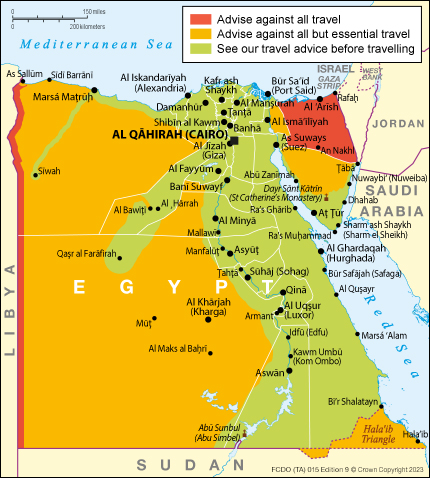
The Foreign, Commonwealth & Development Office ( FCDO ) provides advice about risks of travel to help British nationals make informed decisions. Find out more about FCDO travel advice .
Areas where FCDO advises against travel
Your travel insurance could be invalidated if you travel against FCDO advice. Consular support is also severely limited where FCDO advises against travel.
Egypt-Libya border
FCDO advises against all travel to within 20km of the Egypt-Libya border, except for the town of El Salloum (where we advise against all but essential travel).
North Sinai
FCDO advises against all travel to the Governorate of North Sinai.
Northern part of South Sinai
FCDO advises against all but essential travel to the northern part of the Governorate of South Sinai, beyond the St Catherine-Nuweibaa road, except for the coastal areas along the west and east of the peninsula.
The eastern part of Ismailiyah Governorate
FCDO advises against all but essential travel to the Ismailiyah Governorate east of the Suez Canal.
Western Desert
FCDO advises against all but essential travel to the area west of the Nile Valley and Nile Delta regions, except for:
- Luxor, Qina, Aswan, Abu Simbel and the Valley of the Kings
- the Governorate of Faiyum
- the coastal areas between the Nile Delta and Marsa Matruh
- the Marsa Matruh-Siwa Road
- the oasis town of Siwa
- the Giza Governorate north-east of the Bahariya Oasis
- the road between Giza and Farafra (but we advise against all but essential travel on the road between Bahariya and Siwa)
- Bahariya Oasis, Farafra, the White Desert and Black Desert
Hala’ib Triangle and Bir Tawil Trapezoid
FCDO advises against all but essential travel to the Hala’ib Triangle and the Bir Tawil Trapezoid.
Find out more about why FCDO advises against travel .
Conflict in neighbouring Israel and the Occupied Palestinian Territories (OPTs)
The Israeli government has declared a state of emergency across the whole country. International borders in Israel and the Occupied Palestinian Territories (OPTs) could close at short notice. As a result, the land border into Israel from Egypt at Taba could close with little notice. Check with local authorities and consult the travel advice for Israel and the Occupied Palestinian Territories before trying to cross the border.
In response to events in Israel and the OPTs, a number of demonstrations have taken place in Egypt and protests have been planned, including after Friday prayers. Demonstrations could take place at short notice, with a heavy security presence in place. You should avoid large gatherings, demonstrations and protests. See Safety and security
Entering Egypt from Gaza
The Rafah border crossing partially opened on 1 November. This is primarily to facilitate the evacuation of seriously wounded Palestinians and some foreign nationals. We understand that the crossing will continue to be open for controlled and time-limited periods to allow specific groups of foreign nationals, including British nationals, to cross. It is for the Egyptian and Israeli authorities to determine who is permitted to cross, and when. The Egyptian Ministry of Foreign Affairs will contact Embassies to let them know when their foreign nationals can cross. Should we receive notification from the Israeli and Egyptian authorities that individuals are permitted to cross, we will notify those people individually.
Movement to the Rafah crossing and beyond is at your own risk. You should only travel if you judge it is safe to do so. Check the Israel and The Occupied Palestinian Territories travel advice.
The Egyptian authorities have said all aid going into Gaza from Egypt must be channelled through the Egyptian Red Crescent:
- telephone: + 20 226 703 979, + 20 226 703 983
- fax: + 20 226 703 967
They are unlikely to consider requests for humanitarian access made in Egypt at short notice.
Concern for friends and family
If you are concerned about friends or family, or need consular assistance call:
- British Embassy Cairo on + 20 (0)2 2791 6000
- +44 1767 667 600 (UK number) if you experience technical difficulties with the above number
Incidents in South Sinai
On 27 October, an Egyptian Armed Forces spokesperson confirmed that an unidentified drone fell near a medical facility in the Egyptian Red Sea resort town of Taba next to the Israeli border, injuring six people. An additional unidentified drone also struck outside the town of Nuweiba, though no casualties have been confirmed. The authorities are conducting ongoing investigations.
Incident in Alexandria
On 8 October 2023, an Egyptian police officer is reported to have shot and killed two Israeli tourists and an Egyptian tour guide in Alexandria. A third tourist was injured. Remain vigilant and exercise caution at tourist and religious sites, as well as public gatherings. Find out more information on current risks on the Safety and security .
Border crossings from Sudan
There are still people trying to cross the border into Egypt at Argeen and Qustul. Our ability to provide consular assistance is very limited.
If you are a British national and have crossed the border without valid documentation, contact the British Embassy in Cairo for consular assistance on + 20 (0)2 2791 6000.
Before you travel
No travel can be guaranteed safe. Read all the advice in this guide as well as support for British nationals abroad which includes:
- advice on preparing for travel abroad and reducing risks
- information for women, LGBT+ and disabled travellers
Follow and contact FCDO travel on Twitter , Facebook and Instagram . You can also sign up to get email notifications when this advice is updated.
Travel insurance
If you choose to travel, research your destinations and get appropriate travel insurance . Insurance should cover your itinerary, planned activities and expenses in an emergency.
Related content
Is this page useful.
- Yes this page is useful
- No this page is not useful
Help us improve GOV.UK
Don’t include personal or financial information like your National Insurance number or credit card details.
To help us improve GOV.UK, we’d like to know more about your visit today. We’ll send you a link to a feedback form. It will take only 2 minutes to fill in. Don’t worry we won’t send you spam or share your email address with anyone.
Egypt sees 4% growth in incoming tourist traffic
Minister of Tourism and Antiquities Ahmed Issa announced that the first quarter of 2024 witnessed a positive growth in incoming tourist traffic to Egypt by three-to-four percent compared to the first quarter of 2023 – which was already a record year for tourism in Egypt.
Issa expressed optimism that there will further growth in the near future, during a meeting with the Board of Directors of the Egyptian General Authority for Tourism Promotion on Wednesday.
The Supreme Council of Antiquities is currently witnessing financial reforms, the minister explained in order to increase the volume of the Council’s revenues, increasing its ability to carry out its role as a scientific institution and owner and operator of antiquities.
This will also aid in financing development and restoration projects providing the expenditure that archaeological sites and museums deserve, he added.
Issa said that there will be further developments in the near future regarding the tourism experience in some archaeological sites and museums, including Giza Pyramids area, Saqqara archaeological area, the Citadel of Salah al-Din al-Ayyubi, as part of the Cairo City Break initiative.
The meeting also discussed policies to stimulate aviation in light of the implementation of the National Tourism Strategy in Egypt, which will aid in increasing airline seats coming to Egypt to accommodate the targeted tourist numbers.
The meeting also reviewed the results of the additional stimulus package (The Booster Campaign) which the ministry announced for airline companies as part of the current aviation stimulus program due to the increased risks flights to Egypt face as a result of geopolitical events in the region.
And a proposal submitted to extend the aviation incentive program scheduled to end this April was discussed, with some amendments being made to it.
This proposal was approved and will be presented to the Board of Directors of the Tourism and Antiquities Support Fund.
Related Articles
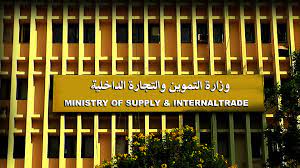
New corruption case in the Ministry of Supply and Internal Trade
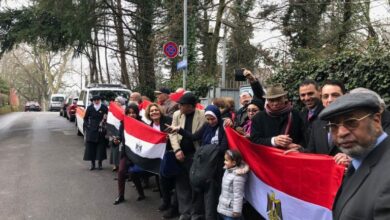
Emigration Minister says to launch emergency fund for Egyptians abroad
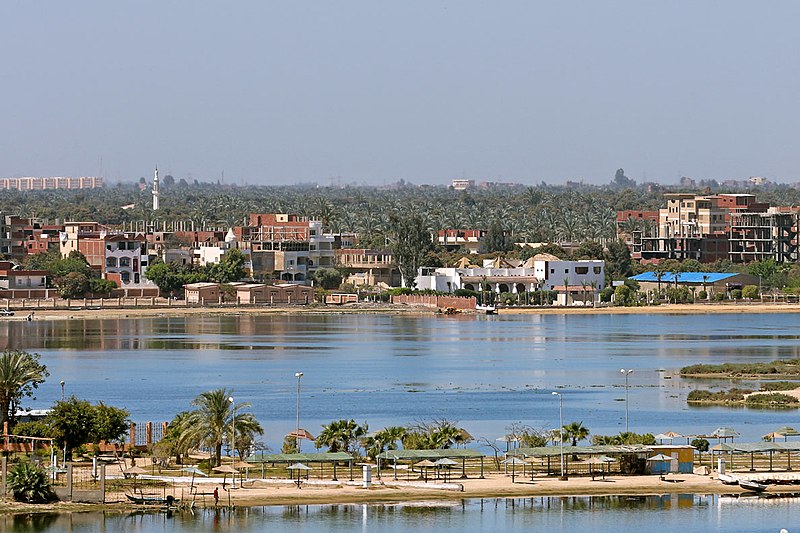
Planning Minister: LE6.5bn worth investments allocated for Ismailia in FY 2023-2024

First Lady greets Egyptians on Sham al-Nessim

IMAGES
VIDEO
COMMENTS
June through August is the best time to go diving in Egypt. The weather switches to sweltering as average high temperature hit 108°F (42°C). Luxor's temples and tombs open at 6am so it's still possible to beat the heat by being an early bird. Expect to be greeted with an ironic "Welcome to Alaska!" in Aswan.
5. Pack for the heat, but keep it conservative. Egypt is known for its cotton, and what better place to wear cotton than here. Pack airy breathable clothes, and break out all the pastels and bright colors in your closet. Most people in major cities dress casually and embrace comfort over fashion.
The Egypt Travel Channel is the new home on YouTube for the various travel, lifestyle, history, and culture series created and produced by John Navarre. John is the creator of EgyptTravelBlog.com ...
Pyramids, bazaars, mummies and catacombs. Egypt has myriad possibilities to marvel and discover, and on a 12-day cultural expedition to its highlights, you'll understand how time has stood still and why you'll need a history lesson at every turn. Lose yourself in the colour and chaos of Cairo's Khan al-Khalili Bazaar, stand at the feet of ...
4. Aswan. Palm trees and patches of greenery cling to the dusty riverbanks of Aswan, one of Egypt's most tranquil locations, celebrated for the unmatched hospitality of its Nubian community. Sail your way to any of the 20 river islands accessible by felucca, the traditional wooden sailboats that ply the river Nile.
Ade Adepitan tries some street food in Cairo with one of the first street food tours of the city.
The Travel Show — Egypt. Featured in... Africa — The Travel Show. From a national park's fight against poachers to restoring a pharaoh's ancient boat. More clips from The Travel Show.
On The Travel Show this weekend it's an Egypt extravaganza as Ade visits Cairo to check in on the construction of the Grand Egyptian Museum, which is set to become the world's largest ...
Travel Show is a sun beam rising in the field of tourism aiming to grow and shine down all over Egypt and extend to the whole world. As we are an expert high standard agency aiming only to serve pharaohs, we proudly cover all their demands; be it airline bookings either regular flights or charter flights, worldwide hotel accommodations, helping ...
Egypt Tours and Packages. Eleganza Travel has the honour to show Egypt the land of treasures which is almost unimaginable archaeological and cultural riches, it's hard not to think of Egypt without imagining the Sphinx, the pyramids at Giza, Luxor, the Valley of the Kings and the Nile. As well as being the world's largest open-air museum ...
There's so much to love about Egypt and nothing comes close to experiencing it in in person and not through a TV screen. The history, the temples, the smells, the heat, the sand, the Nile and the moment when your eyes finally gaze up at the Pyramids of Giza. All along the Nile you can trace the Ancient Egyptians through history as you visit their impressive and carefully decorated temples ...
Why Egypt Should Be on Every Traveler's Bucket List. According to the World Tourism Organization, Egypt welcomed a staggering more than 11.3 million tourists in 2018. A beacon of history, culture ...
Travel Advisory. July 13, 2023. Egypt - Level 3: Reconsider Travel. O T. Reissued with obsolete COVID-19 page links removed. Reconsider travel to Egypt due to terrorism . Exercise increased caution in Egypt due to the Embassy's limited ability to assist dual national U.S.-Egyptian citizens who are arrested or detained. Do not travel to:
9. Temple hop in Luxor. Luxor, the world's greatest open-air museum, is a testament to the ancient Egyptian civilization through its sheer wealth of temples and monuments. Begin your temple-hopping at the Temple of Karnak - the perfect manifestation of pharaonic ambition.
Man Falls During Camel Fight. From the legendary Nile River to the mysteries surrounding Giza's remarkable pyramids, Egypt is a land that tantalizes travelers. Visitors will wander the chaotic streets of Cairo, travel to the shores of Alexandria, and gaze upon the Valley of the Kings and temples of Luxor.
Check out all the places seen in this video: https://www.touropia.com/best-places-to-visit-in-egypt/With a fascinating history that reaches back to the dawn ...
The Travel Show. Ade Adepitan is in Egypt, as the capital, Cairo, prepares to open the doors to the biggest archaeological museum in the world. Show more.
Call us in Washington, D.C. at 1-888-407-4747 (toll-free in the United States and Canada) or 1-202-501-4444 (from all other countries) from 8:00 a.m. to 8:00 p.m., Eastern Standard Time, Monday through Friday (except U.S. federal holidays). See the State Department's travel website for the Worldwide Caution and Travel Advisories.
Cost and Accommodations in Morocco vs. Egypt. A vacation in Morocco or Egypt will cost approximately the same, with Egypt being slightly cheaper. A traveler with their sights on mid-range stays ...
You must show proof of an entry stamp in your passport when you leave Egypt. If you cannot provide proof of entry, you cannot obtain an exit stamp and will be denied exit. ... 2SLGBTQI+ travellers should carefully consider the risks of travelling to Egypt. Travel and your sexual orientation, gender identity, gender expression and sex ...
🎥 WATCH OUR MAIN CHANNEL » http://bit.ly/BestEverFoodReviewShow🎥 NIGHTMARE EGYPT FOOD TOUR » https://youtu.be/Y53hOrNU1u0 👕 BEFRS MERCH » https://bit.l...
Check the Israel and The Occupied Palestinian Territories travel advice. The Egyptian authorities have said all aid going into Gaza from Egypt must be channelled through the Egyptian Red Crescent ...
Egypt sees 4% growth in incoming tourist traffic. Egypt Independent April 30, 2024. Minister of Tourism and Antiquities Ahmed Issa announced that the first quarter of 2024 witnessed a positive growth in incoming tourist traffic to Egypt by three-to-four percent compared to the first quarter of 2023 - which was already a record year for ...